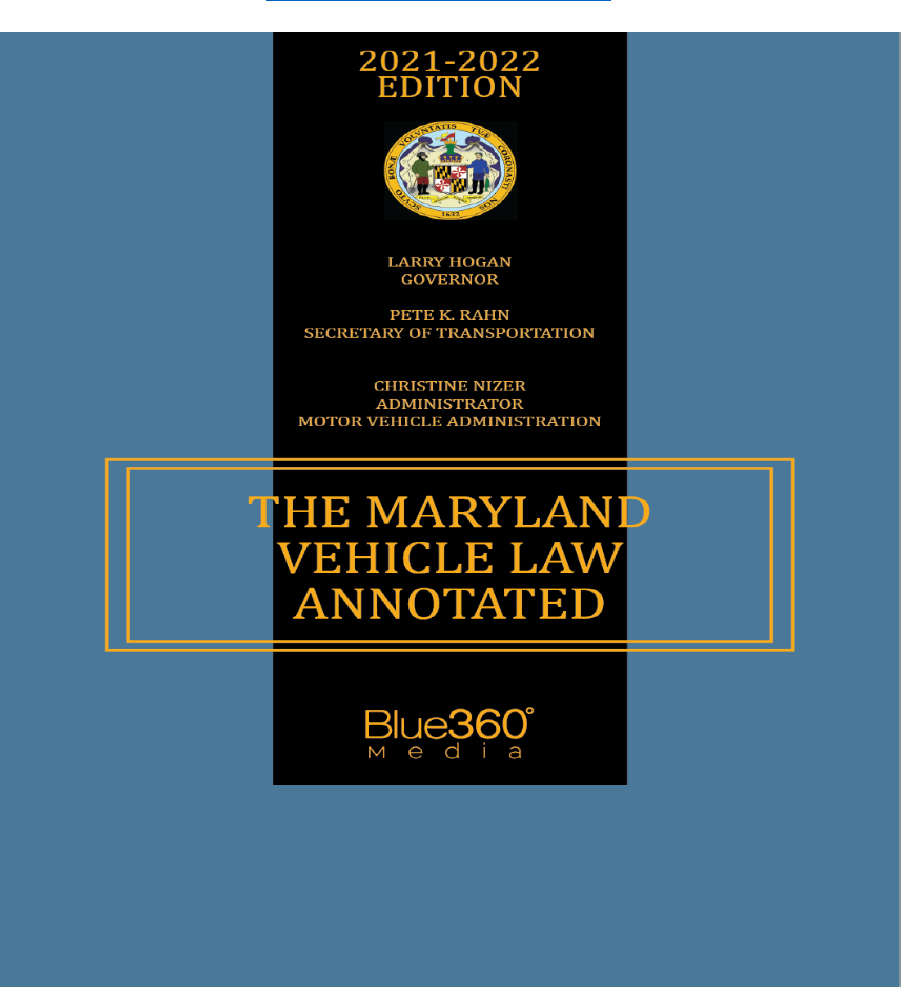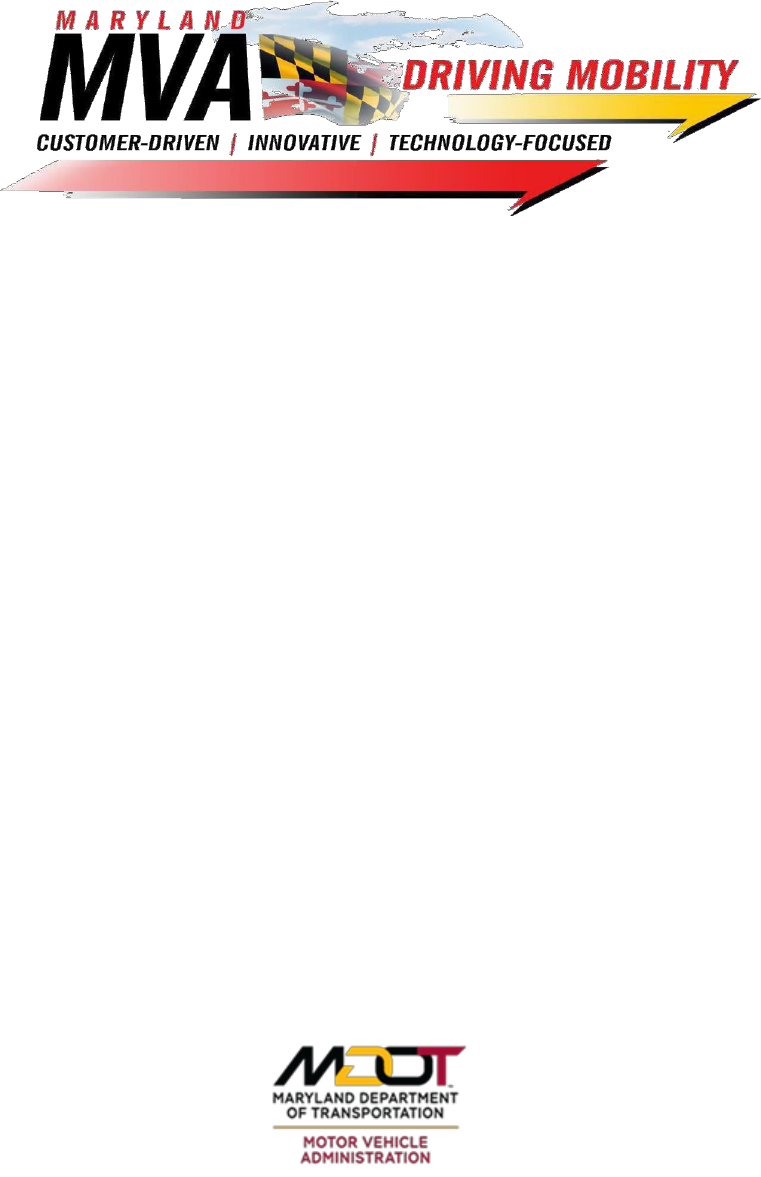
1
INTERACTIVE TITLE AND
REGISTRATION MANUAL
FOR DEALER’S / TITLE SERVICES/ VEHICLE PROGRAMS
The Motor Vehicle Administration is pleased to provide online
guidance to dealers and title services. This manual is intended to
assist you with the proper completion of your transactions,
increase accuracy and reduce rejections of work. The information
provided will increase the efficiency of processing work, which
leads to greater customer service and satisfaction. The information
contained in this manual is based on law, regulation, policy,
process, and procedures of this Administration.
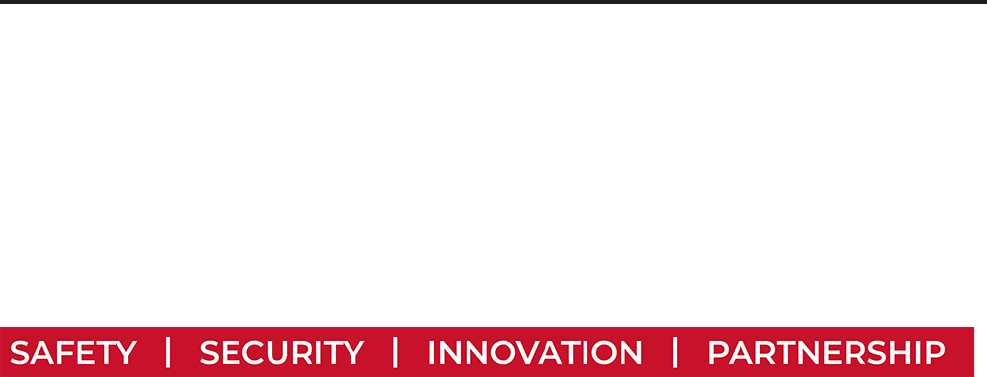
2
The MDOT MVA Mission
MDOT mission: The Maryland Department of Transportation is a customer-driven leader that delivers safe,
sustainable, intelligent, and exceptional transportation solutions in order to connect our customers to life's
opportunities.
MDOT MVA vision: The MDOT MVA shall provide exemplary driver and vehicle services that promote
Maryland's mobility and safety while enhancing process and product security.
MDOT MVA is focused on the following key areas which reflect our premier customer service culture with
respect to our products and services offered to the residents of Maryland.
SAFETY
•
Promote the safety and security of Maryland residents with the products and services MDOT MVA
provides.
•
Reduce fatalities and severe injuries on Maryland roads.
•
Ensure that MDOT MVA offices are safe and inviting to customers and staff.
SECURITY
•
Ensure all products, processes, and services provided by MDOT MVA meet the highest level of
security standards and are updated on a regular basis.
•
Safeguard all data and the integrity of personal and confidential information provided by MDOT MVA
customers.
INNOVATION
•
Deploy technology and processes that enable customers to interact with MDOT MVA how, when, and
where they want.
•
Use innovative technology that is current, right for the job, adaptive, and free of obstacles.
•
Provide clear, concise, consistent, and responsive communication.
PARTNERSHIP
•
Offer customer access to a variety of secure and convenient government products and services
through MDOT MVA branch offices, web, and kiosk.
•
Foster and maintain connections/partnerships with other organizations that add value and provide
convenience and opportunities for MDOT MVA customers.
•
Establish strong and effective partnerships to help achieve zero fatalities on our roadways.

3
TABLE OF CONTENTS
MVA’s Mission 2
Table of Contents 3-4
MVA Contacts 5
MVA’s Website 6
Documents Required for Basic Titling Transactions 7
New Vehicle Purchased from a Dealer 8
Used Vehicle Purchased from a Dealer 9
Used Vehicle from Someone “Other than” a Dealer 10
Gifted Vehicle Between Immediate Family Members 11
Moving to Maryland—Used Vehicle Already Owned 12
Homemade Trailer 13
Properly Assembly of Title Records 14
Submitting Title Work to the MVA 15
Transmittal Sheet 16
Special Note for ERT Dealer Work 17
What Transactions Can ERT Dealers Process Electronically 18
What Transactions CANNOT be Processed by ERT Dealers Electronically 19
What Transactions Can ERT Title Services Process Electronically 20
Ordering Forms 21
eService Portal and Drawdown Account 22-23
How Do I Purchase a Maryland Vehicle Law Book 24
The Application for Certificate of Title – VR-005 25
Application for Certificate of Title—VR-005 Front 26
Application for Certificate of Title—VR-005 Back 27
Proper Completion of the Application for Certificate 28-59
Maryland Clean Cars Act 2007 60-61
Truth in Mileage Act of 1986 62
Power of Attorney 63
Power of Attorney for Odometer Disclosure Form 64
Secure Documents/Maryland Title and Security Interest Filing 65-69
Non-Conforming Documents/Reassignment Disclosure Language 70
Exceptions to Odometer Disclosure Requirements/Odometer Disclosure 71-72
Involuntary Divestiture (Non-Owner Involvement)/Odometer/Mileage Reading 73
Brands/Exemptions
Record Retention Odometer Disclosure Statement/Leased Vehicles 74-75
Certificate of Origin 76-79
Maryland Certificate of Title Info 80-81
Maryland Notice of Security Interest Filing (SIF) 82-83
Maryland Dealer Reassignment 84-85
Out of State Titles 85
Lien Release 86
Electronic Lien Recording 87-88
Safety Inspection Requirements 89-90
Vehicles Acquired By Dealers Under Unusual Circumstances 91

4
Supporting Documents for Titling Transactions 92-100
Title 11-Subtitle 15 – Chapter 14 Certificates of Title
Dealer Resale Titles 102
Affidavit in Lieu of Title 103
Reasons Title Work May Be Rejected Dealer Duplicate Titles 104-105
Excise Tax Credit for Lemon or 60 Day Buy Back Vehicles 106
Salvage Certificates/Salvage Chart 107-109
Fraud Alert 110
Grey Market Vehicles/Helpful U.S. and National Phone Numbers 111
Vehicle Programs Legislation Effective June, July and October 2021 112-114

5
MOTOR VEHICLE ADMINISTRATION (MVA) CONTACTS
Business Licensing & Driver Instructional Services Phone
•
Manager 410-768-7035
•
Assistant Manager 410-424-3045
•
Section Manager ERT UNIT 410-762-5047
•
Supervisor BLS 410-787-7951
•
Compliance Manager 410-424-3750
Insurance Compliance Division
•
Manager 410-768-7663
•
Section Manager 410-768-7699
•
Supervisor – Phone Panel/Helpdesk 410-762-5170
•
Supervisor – Mail Review 410-787-7963
•
Supervisor – Media Processing/UMC + Judgement Cases 410-768-7310
•
Insurance Compliance Flags 410-424-3656
Motor Carrier & Electronic Services
•
To contact someone in this unit you may dial or 410-787-2951 or
Vehicle Services
•
Manager 410-787-2970
•
Assistant Manager 410-424-3644
•
Assistant Manager 410-768-7512
•
Section Manager ELS/Online Response Unit 410-787-7828
•
Section Manager 410-768-7223
•
Supervisor NMVTIS/Refunds 410-787-7871
•
Supervisor Certified Copies/Tag Return 410-787-2972
•
Supervisor Corrections/Mail-in Title/Repo/Reg Renewals/Plates 410-762-5190
•
Supervisor Flagging Unit/Salvage Unit/Duplicate Titles/Liens 410-424-3679
•
Supervisor Dealer Services 410-768-7374

6
MVA’s WEBSITE
You will find helpful information at our website.
www.mva.maryland.gov
Learn how to:
Sign up to receive Dealer Bulletins
Search for information not found in this manual,
Obtain information regarding fines for late submission of dealer work,
And much more!
This Photo by Unknown Author is licensed under CC BY-NC

7
Documents Required for Basic
Titling Transactions
•
NEW VEHICLE PURCHASES FROM A DEALER
•
USED VEHICLE PURCHASED FROM A DEALER
•
USED VEHICLE PURCHASED FROM SOMEONE “OTHER THAN A DEALER”
•
GIFTED VEHICLE BETWEEN IMMEDIATE FAMILY MEMBERS (WITHIN
MARYLAND)
•
MOVING TO MARYLAND – USED VEHICLE ALREADY OWNED
•
HOMEMADE TRAILER
This Photo by Unknown Author is licensed under CC BY-SA-NC

8
NEW VEHICLE PURCHASED FROM A DEALER
Complete and submit the following documents:
Application for Certificate of Title, Form VR-005
Certificate of Origin - properly assigned
Dealers Reassignments - (if needed) - Be sure there is a complete sequence of
ownership from the owner to the first dealer, to any subsequent dealers, and finally to the retail
buyer.
Original Dealers Bill of Sale - (photocopies are only accepted if notarized)
Note: Maryland Dealers may complete the certification section on the Application for Certificate
of Title, (Form VR-005) or the certification on the dealer’s reassignment.
Odometer Disclosure Statement - on the reverse of the Certificate of Origin and/or
any accompanying dealer reassignments. The odometer disclosure may also be on a
separate odometer disclosure statement. All odometer disclosures must meet federal
requirements.
Insurance coverage - with a company licensed to insure vehicles in Maryland. Provide the full
name of the company, policy or binder number and the agent’s name.
Trailers do not require insurance unless rented or leased.
New Tags - If purchasing tags, submit the two-year registration fee (including surcharge) for
the class of tags desired. Only trucks (1-ton and larger) and tractors pay a one-year registration
fee. See fees for registration plates under the Vehicle Services heading at
https://mva.maryland.gov/about-mva/Pages/fees.aspx. All classes of vehicles have staggered
registration and the month of titling will be the month of registration renewal.
Registration Card - Submit the registration card if transferring tags. Tags may be transferred
to a vehicle in the same owner’s name, between parents and children, and between husband and
wife. Tags may only be transferred to vehicles of vehicle classes A, M and E.
Tag transfer fee is $10.00 - If the tags being transferred are valid for less than a year, there
will also be an additional year’s registration fee and surcharge collected.
Taxes - Excise tax is 6% of the price certified by the dealer, less trade-in allowance, with no
allowance for down payment or manufacturer’s rebate. Maryland dealers may charge a processing
fee up to $500.00. This processing fee must be added to the purchase price and is taxable. NOTE: The
processing fees charged by out of state dealers are sometimes higher. The “full amount” charged for a
processing fee by an out of state dealer is taxable. Non-taxable items include dealer discount or dealer
rebates, extended warranties, mechanical repair contracts, electronic registration fees, federal excise tax,
and equipment installed to accommodate a disabled individual. See complete procedures for calculating
total purchase and taxable price in Code of Maryland Regulation (COMAR) 11.15.33.00.
Title Fee $100.00, except for rental vehicles $50.00, and motor scooters and mopeds
$20.00. Lien Filing Fee $20.00 for each lien recorded.

USED VEHICLE PURCHASED FROM A DEALER
Complete and submit the following documents:
Application for Certificate of Title, Form VR-005 or complete the application for title on the
reverse of the Maryland title,
Certificate of Title properly assigned.
Be sure there is a complete sequence of ownership from the
owner to the first dealer, to any subsequent dealers, and finally to the retail buyer.
When titling a vehicle, be sure you have the most recent title.
Dealer Reassignments (
if applicable
) – Be sure to attach any separate dealer reassignments required to
complete the sequence of ownership as stated above.
Original Dealers Bill of Sale (photocopies are only accepted if notarized)
Note: Maryland Dealers may complete the certification section on the Application for Certificate of Title
(Form VR-005) or the certification on the dealer’s reassignment.
Maryland Safety Inspection Certificate – For vehicles held in dealer inventory only, inspections are
valid for up to 6 months; or until 1000 miles has been added to the vehicle’s odometer. Note: Trucks (1
ton and larger), tractors and freight trailers may be sold un-inspected by Maryland dealers and the MVA
may sell a 30-day temporary registration to be used by the owner to complete the inspection process.
Lien Release (
if applicable
) - An acceptable lien release is a Maryland Notice of Security Interest Filing
form properly signed on the front by the lien holders authorized representative; or a lien properly
released on an out of state title; or a letter on the lien holders original letter head releasing the lien (See
additional information on requirements for lien release letters in this manual). Unless the lien release
letter is being provided to you directly from the lien holder, it is wise to verify the lien release and get
positive identification from any customer presenting a lien release letter.
Odometer Disclosure Statement
- Odometer statements are contained on all titles in compliance with the
federal truth in mileage act. Separate odometer disclosure statements are acceptable if properly signed and
completed by the seller and buyer. (See complete information on proper odometer disclosure in this manual)
Insurance coverage with a company licensed to insure vehicles in Maryland. Provide the full name of
the company, policy or binder number and the agent’s name.
Trailers do not require insurance unless rented or leased.
New Tags - If purchasing tags, submit the two-year registration fee (including surcharge) for the class
of tags desired. Only trucks (1-ton and larger) and tractors pay a one-year registration fee. See fees for
registration plates under the Vehicle Services heading at www.mva.maryland.gov. All classes of vehicles
have staggered registration and the month of titling will be the month of registration renewal.
Registration Card – Submit the registration card if transferring tags. Tags may be transferred to a vehicle
in the same owner’s name, between parents and children, and between husband and wife. Tags may only be
transferred to vehicles of the same class.
Tag transfer fee is $10.00. If the tags being transferred are valid for less than a year, there will also
be an additional year’s registration fee and surcharge collected.
Taxes - Excise tax is 6% of the price certified by the dealer, less trade-in allowance, with no allowance
for down payment or manufacturer’s rebate. Maryland dealers may charge a processing fee up to
$500.00. This processing fee must be added to the purchase price and is taxable. NOTE: The processing
fees charged by out of state dealers are sometimes higher. The “full amount” charged for a
processing fee by an out of state dealer is taxable. Non-taxable items include dealer discount or dealer
rebates, extended warranties, mechanical repair contracts, electronic registration fees, federal excise tax,
and equipment installed to accommodate a disabled individual. See complete procedures for
calculating total purchase and taxable price in Code of Maryland Regulation (COMAR) 11.15.33.00.
Title Fee $100.00, except for rental vehicles $50.00, and motor scooters and mopeds $20.00.
Lien Filing Fee $20.00 for each lien recorded.
9

10
USED VEHICLE PURCHASED FROM SOMEONE “OTHER THAN” A DEALER
Complete and submit the following documents:
Application for Certificate of Title, Form VR-005 or complete the application for title on the
reverse of the Maryland title,
Certificate of Title properly assigned. Be sure you have the most recent title.
Notarized Bill of Sale Form VR-181 with the signatures of all sellers and buyers should be
provided for vehicles 7 or less years old.
Maryland Safety Inspection is valid for 90 days from the date of inspection. Once recorded with the
MVA, the inspection certificate is only valid for 30 days from the date of inspection for a resale. If an
inspection certificate is not provided, the customer may complete a Temporary Inspection Waiver Form
VR-129 to obtain a 30-day temporary registration.
Insurance coverage with a company licensed to insure vehicles in Maryland. Provide the full name of
the company, policy or binder number and the agent’s name.
Trailers do not require insurance unless rented or leased.
Lien Release (if applicable) - An acceptable lien release is a Maryland Notice of Security Interest Filing
form properly signed on the front by the lien holders authorized representative; or a lien properly
released on an out of state title; or a letter on the lien holders original letter head releasing the lien (See
additional information on requirements for lien release letters in this manual). Unless the lien letter is
being provided to you directly from the lien holder, it is wise to verify the lien release and get positive
identification from any customer presenting a lien release letter.
New Tags - If purchasing tags, submit the two-year registration fee (including surcharge) for the class
of tags desired. Only trucks (1-ton and larger) and tractors pay a one-year registration fee. See fees for
registration plates under the Vehicle Services heading at www.mva.maryland.gov. All classes of vehicles
have staggered registration and the month of titling will be the month of registration renewal.
Registration Card - Submit the registration card if transferring tags. Tags may be transferred to a vehicle
in the same owner’s name, between parents and children, and between husband and wife. Tags may only
be transferred to vehicles with A, M or E class.
Tag transfer fee is $10.00. If the tags being transferred are valid for less than a year, there will also
be an additional year’s registration fee and surcharge collected.
Taxes
- Vehicles less than 7 years old – When a notarized bill of sale accompanies the title, the
excise tax is 6% of “the greater of” the purchase price on the bill of sale or $640.00 ($320.00 for
trailers).
If the bill of sale does not accompany the title, the excise tax is 6% of the greater of the
purchase price on the title, or the NADA clean retail book value of the vehicle. Minimum excise tax is
$38.40 ($19.20 for trailers, motor scooters and mopeds).
Taxes – Vehicles 7 years old and older – Excise tax is 6% of the greater of the purchase price on the
title or $640.00 ($320.00 for trailers, motor scooters and mopeds). Minimum excise tax is $38.40
($19.20 for trailers).
Title Fee $100.00, except for rental vehicles $50.00, and motor scooters and mopeds $20.00.
Lien Filing Fee $20.00 for each lien recorded.

11
Gifted Vehicle Between Immediate Family Members (within Maryland)
Maryland Title-properly assigned by the person(s) giving the vehicle
Application for Certificate of Title on the reverse of the Maryland title, or the
Application for Certificate of Title Form VR-005-completed by the person(s) receiving
the vehicle. When titling a vehicle, be sure you have the most recent title.
Insurance coverage with a company licensed to insure vehicles in Maryland. Provide the full name of the
company, policy or binder number and the agent’s name. Trailers do not require insurance unless rented or leased.
Gift Certification Form VR-103–completed and signed by all givers and receivers of the vehicle
Proof of Relationship–submit if last names are different, i.e., birth certificate, marriage certificate, etc.
Note: For Aunt/Uncle over 65 years old to Niece/Nephew transfers only, the Gift Title Transfers – Certified Statement
Form VR-299 may be used in place of proof of relationship
Lien Release (if subject to a lien)–Maryland’s lien release is a Notice of Security Interest Filing, properly
released on the front by the lien holder’s representative; or a Letter on Lien Holder’s Letterhead releasing the
lien. If the lien is not released, a letter from the lien holder on letterhead to authorize the change in ownership and
state whether or not the lien contract has changed or remains the same, is required. The letter must include the
year, make and vehicle identification number and specifically indicate to whom the vehicle is to be transferred.
Note: Gifts between husband and wife with an open lien are excise tax exempt, but still require a letter of
permission from the lien holder.
Note: Gifts between parents and children with an open lien need a letter signed by both, stating who made the
down payment, paid the taxes, made all payments, and will continue to make the payments. If the receiver of the
vehicle did not make all of the above payments, the transaction is taxable at 6% of the vehicle book value for
vehicles less than 7 years old; or for vehicles 7 years old and older, the minimum tax of $38.40 ($19.20 for trailers).
Letter of permission from the lien holder as stated above is, also required.
Note: Gifts with open liens between relationships “other than” husband wife, and special conditions as
stated above for parents and children, must pay excise tax.
Maryland Safety Inspection is not needed for transfers between husband/wife, parents/children, or transfers
where the title is being transferred from joint ownership to one of the owner’s individual names. ALL OTHER
RELATIONSHIPS REQUIRE MARYLAND SAFETY INSPECTION. Note: If an inspection certificate is required but not
provided, the customer may complete a Temporary Inspection Waiver Form VR-129 to obtain a 30-day temporary
registration. The cost of a temporary registration is $20.00 and is in addition to all other required fees. If temporary
registration is issued, the regular registration fee for the vehicle will be charged when the safety inspection certificate
is submitted. Once the vehicle passes, the inspection certificate will be sent electronically to the MVA.
Taxes–Excise tax is “exempt” for vehicles currently titled in Maryland and being transferred to: a spouse, son,
daughter, grandchild, parent, sister, brother, grandparent, father-in-law, mother-in-law, son-in-law, or daughter-in- law
of the vehicle owner and no money or other valuable consideration is involved in the transfer. Surviving spouse is exempt
from excise tax when transferring the title from decedent with proof of relationship. Transfers from Aunt/Uncle over 65 years
of age to Niece/Nephew are excise tax exempt.
Registration Card–Submit the registration card if transferring tags. Tags may be transferred to a vehicle in the same
owner’s name, between parents and children, and between husband and wife. Tags may only be transferred to vehicles
of the same class.
New Tags-If purchasing tags, submit the two-year registration fee (including surcharge) for the class of tags
desired. Only trucks (1-ton and larger) and tractors pay a one-year registration fee. See fees for registration plates
under the Vehicle Services heading at www.mva.maryland.gov. All classes of vehicles have staggered registration
and the month of titling will be the month of registration renewal.
Tag transfer fee is $10.00. If the tags being transferred are valid for less than a year, there will also be an
additional year’s registration fee and surcharge collected.
Title Fee $100.00, mopeds, and motor scooters $20.00. Surviving spouse is exempt from title fee when transferring
the title from decedent with proof of relationship.
Lien Filing Fee $20.00 for each lien recorded (if applicable)–Lien filing fee is not required for existing liens to
be recorded if the letter of permission from the lien holder states that the lien contract remains the same.
Note: Gifts of vehicles “not previously titled in Maryland” between family members are subject to
excise tax and a Maryland Safety Inspection.

12
MOVING TO MARYLAND – USED VEHICLE ALREADY OWNED
Complete and submit the following documents:
Application for Certificate of Title Form VR-005 Out of State Title (or ownership document
required in that state) –
Customer will need to go to a MVA office with an appointment.
The
customer will need to have their current vehicle registration card and the e m a i l o r fax number of
their lien holder. MVA will e m a il o r fax a completed VR-056 to the lien holder and sc a n t h e
c om p l e t e d f o r m i n w it h t h e t i t le d o c um e n t s. The transaction will be processed as a HOLD
TITLE. No title or SIF will be printed until the title is received.
Lien Release, if applicable.
Maryland Safety Inspection Certificate A M a r y l a n d Safety Inspection i s r eq u i re d. Once
the vehicle pa ss es, t h e Inspection station will e l e c t r o n i c a l l y se n d t he inspection
certificate to the MV A. If the applicant desires registration but does not provide a Maryland Safety
Inspection Certificate, they may apply for a 30-day temporary registration by
completing the Temporary Inspection Waiver Form VR-129. If temporary registration is applied for, the
permanent registration will not be issued until the Maryland Safety Inspection Certificate is submitted.
No t e: A Maryland Safety Inspection is not required, if the vehicle was previously titled in Maryland
In your name, or in your spouse, parent or child’s name.
Temporary Registration Fee is $20.00. Note: The fee for the regular plates will be paid when
the safety inspection certificate is submitted or can be pre-paid at the time of titling at an MVA office.
Insurance coverage with a company licensed to insure vehicles in Maryland. Provide the full name of
the company, policy or binder number and the agent’s name.
Trailers do not require insurance unless rented or leased.
Excise Tax and Excise Tax Credit – If the vehicle is titled or registered in the name of the applicant in
another state at the time of making this application, Maryland Excise Tax is 6% of the “clean retail value”
of the vehicle as shown in the JD Power Used Car Guide. Vehicles “7 years old and older” currently owned
by the applicant in another state will be charged the minimum excise tax of $38.40 ($19.20 for trailers,
motor scooters and mopeds). On passenger cars, multi-purpose vehicles, 1/2 and 3/4-ton trucks, the
value is computed by the addition or subtraction for high or low mileage. An excise tax credit is applied if
the applicant has not been a Maryland resident for more than 60 days and has paid a state sales or
excise tax in another state (excluding county or local tax). The excise tax shall apply, but at a rate
measured by the difference in Maryland’s tax rate and the other state’s tax rate. The minimum excise tax
imposed shall be $100. New residents leasing vehicles need to provide a copy of the lease contract or a
letter from the leasing company indicating taxes paid (if any) to the previous state to ensure that an
excise tax credit may be applied.
Please Note: Active-duty military living in Maryland and stationed in Maryland, an adjoining state, or DC;
and returning Maryland residents in the military, are entitled to receive an excise tax credit for up to 1
year. Please note that out of state military who are stationed in Maryland have the option of titling and
registering their vehicles in Maryland or in the state that is their home of record. More information for
Active-Duty Service Members can be found at www.mva.maryland.gov
New Tags - If purchasing tags, submit the two-year registration fee (including surcharge) for the class
of tags desired. Only trucks (1-ton and larger) and tractors pay a one-year registration fee. See fees for
registration plates under the Vehicle Services heading at www.mva.maryland.gov. All classes of vehicles
have staggered registration and the month of titling will be the month of registration renewal.
Title Fee $100.00, except for rental vehicles $50.00, and motor scooters and mopeds $20.00.
Lien Filing Fee $20.00 for each lien recorded, if applicable.

13
Homemade Trailer
Complete and submit the following documents:
Application for Certificate of Title Form VR-005
Two Pictures of the trailer are required. One picture of the entire rear view showing the lights; and
one entire side view showing the hitch
Certified Statement – Must itemize all parts used to build the trailer (provide receipts for all parts used). If
all or any of the parts were used, they must be listed and an estimated value of the used parts entered. The
certified statement also needs to contain what the owner considers to be the total value of the trailer.
Application for Assigned Vehicle Identification Number Form VR-198 – Trailers with a
gross vehicle weight of 5,000 lbs. or less may apply for assigned vehicle identification number at any
branch of the MVA. Trailers with a gross vehicle weight of 5001 lbs. or more, are required to be
taken to the garage located at the Glen Burnie branch of the MVA, on Tuesdays between
8:30am and 1:00pm, to have the vehicle identification number assigned and affixed by the Maryland
State Police Auto Theft Unit.
Temporary Inspection Waiver, Form VR-129 – Once the VIN has been issued and affixed to the
trailer, it will need to be Maryland Safety Inspected before registration plates may be issued. The
applicant may apply for a 30-day temporary registration to take the vehicle to an authorized
Maryland Safety Inspection Station. If temporary registration is requested, the permanent registration
will not be issued until the Maryland Safety Inspection Certificate is submitted. When the safety
inspection is submitted, the regular tags may be purchased. Temporary Registration Fee is
$20.00 (This fee is in addition to the cost of registration plates).
New Tags - If purchasing tags, submit the two-year registration fee (including surcharge) for the
class of tags desired. Only trucks (1-ton and larger) and tractors pay a one-year registration fee. See
fees for registration plates under the Vehicle Services heading at www.mva.maryland.gov. All classes
of vehicles have staggered registration, and the month of titling will be the month of registration
renewal.
Excise Tax – Excise tax will be 6% of the total value of the trailer. Minimum excise tax for trailers is
$19.20.
Title Fee $100.00, except for rental vehicles $50.00, and motor scooters and mopeds
$20.00. Lien Filing Fee $20.00 for each lien recorded, if applicable.

14
PROPER ASSEMBLY OF TITLE RECORD
DOCUMENTS
As of 1/1/24, MVA required electronic submission of all title work. All
title documents must be scanned into the ERT system. Bundle reports
are no longer to be sent to the MVA. All title records should be scanned in
this order:
Each title record should be as follows:
FROM TOP TO BOTTOM
Maryland MVA Title/Registration Receipt
Registration card (If Transferring Tags)
Application for Certificate of Title Form VR-005
Certificate of Origin, Title, or other acceptable ownership
document
Lien Release – Notice of Security Interest Filing
Dealer Reassignment(s)
Dealer’s Bill of Sale
Miscellaneous MVA Forms
Odometer Mileage Statements
Vehicle Emission Report (if submitted)
Copy of owner(s) driver license(s), state issued identification card
Copy of title service ID
Power of Attorney (if submitted by TSA)
EACH TITLE RECORD SHOULD BE SCANNED AS
ONE DOCUMENT. Please do not index documents
by document type.

15
Submitting Title Work to the MVA
The dealer must u p l o a d required documents, and submit taxes and
fees within 30 days of date of delivery for class A passenger cars,
class D motorcycles, class M multipurpose vehicles, and class G travel and
camping trailers. Dealerships will be charged late fines for work not
submitted within 30 days of the date of delivery. NOTE: For other
classes of vehicles, the dealer has the option of collecting the tax
and submitting it with all required documents
within 30 days of the date of
delivery; or allowing the customer to present the necessary titling
documents, pay the excise tax and all required fees to the MVA.
Dealers are required to upload all the documents and submit taxes and fees
for other classes of vehicles. If there is a lien to record, you may want to
exercise the option to upload the documents and submit taxes and fees to
ensure that the lien is properly recorded before the 30 day required time.
Maryland Vehicle Law Reference 13-113(e)
Title service agencies have 5 days to upload documents to the ERT system and submit
taxes and fees.
If you are selling a vehicle to a customer in another state the law allows
the dealer to provide the titling documents to the transferee within 30
days. However, if there is a lien to record, the selling dealer may wish to
contact the other state and mail the titling documents, taxes and fees to
that state. This will ensure that the lien is properly recorded. Phone numbers
for other state’s motor vehicle departments may be found in several national
publications. Contact your dealer’s association for the names of these
manuals.
This Photo by Unknown Author is licensed under CC BY-SA-NC
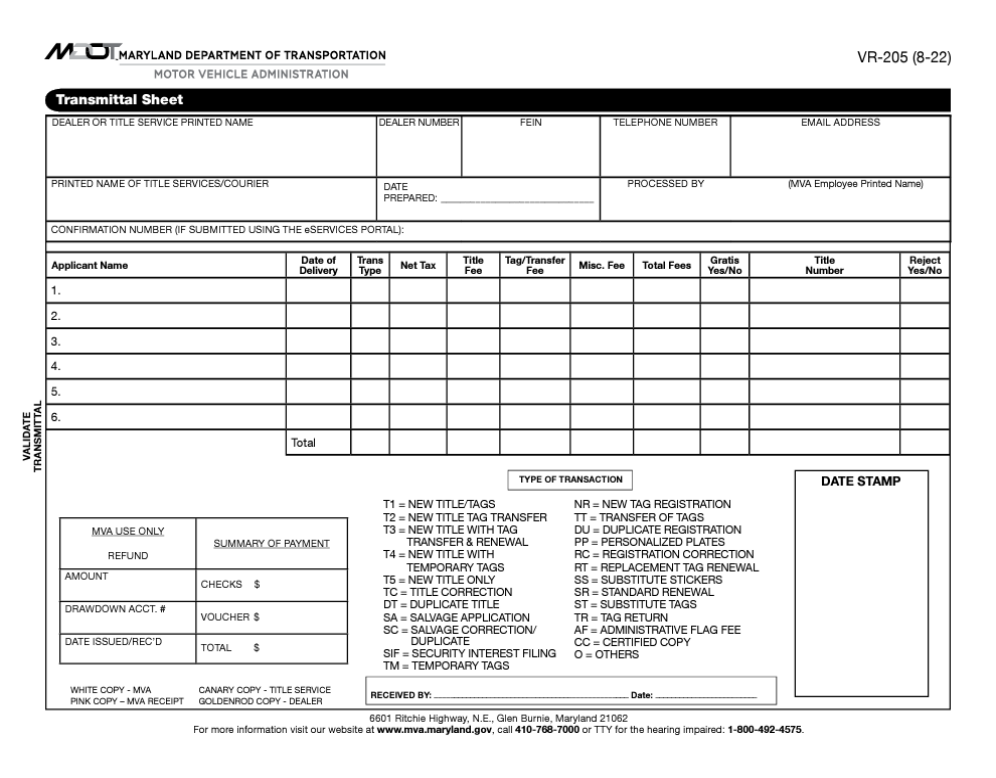
TRANSMITTAL SHEET
All title work submitted to the MVA for processing must be recorded on a
Transmittal Sheet Form VR-205. The transmittal sheet is utilized as a receipt
for drop off title work as well as a tracking sheet for title work processed.
The transmittal sheet must be completed in its entirety for processing.
Note: The confirmation number for transactions submitted on the e-services
portal must be completed on the form as well as the drawdown account
associated to the dealer or title service agency.
16

17
SPECIAL NOTE FOR ERT DEALER WORK
SUBMISSION –
• Dealers- Any transactions processed via the ERT network must be finalized within 30
days of the Date of Delivery. All paperwork must be uploaded via the ERT system within
the 30-day timeframe as well.
• Title Services- Any Transactions processed via the ERT network must be finalized within
3 days of the “Paperwork received date” when payment type is cash/credit. The
transaction must be finalized within 10 days of the “Paperwork received date” when the
payment type is a check. All paperwork must be uploaded via the ERT system within 3
days of the date of finalization.
Effective October 1, 2010, the transmission date is used for
proof of submission to MV A.

18
What transactions “CAN” ERT dealers process electronically?
•
New title and tags (T1)
•
New title and transfer of tags (T2)
•
New title and transfer with renewal of tags (T3)
•
New title only (T5)
•
Title for ATV’s - Need to use class D, enter NR in the inspection field and enter AT for
the body style
•
New tag registration (NR)
•
Standard renewal (SR)
•
Replacement tag renewal (RT)
•
Substitute tags (ST)
•
Substitute stickers (SS)
•
Duplicate registration (DU)
•
Duplicate title, Form VR-018 (DT) (Transmit only)
•
Duplicate title, Form VR-003 (Transmit only)
•
Administrative flag fee (AF)
•
Can utilize mailing address, mail address shows on title, not on database.
•
Soundex issuance with proper documents – ERT Dealers must fax driver’s license ID
card, or military ID from this country to MVA ERT Unit at 410-424-3629 or 410-768- 7070.
Otherwise the transaction needs to be submitted to MVA.
•
Tag return.
•
Change of Address
•
Branding of titles
-
Salvage processors (CO-PART, IAA AND AIC ONLY) can brand for insurance companies
-
Titles branded out of state and eligible for use on roads if the brand has been
recorded in NMVTIS.
•
State and Local Government plates, if applicable
•
MDID issuance with proper documents: To request a MDID., please email
[email protected]ryland.gov . Please be sure to send a copy of the completed
Application for Maryland Title (form VR-005) signed by the customer with a copy of the
customer’s out-of-state driver’s license or military ID

19
What transactions “CANNOT” be processed by ERT dealers?
•
No branding of titles (can only brand for CAL LEV and odometer A, B or C). A title requiring ANY
OTHER BRAND “MUST” be taken to the mva for processing, except as noted
above in the “Can Do” section
•
No VIN plate assignment
•
No new issuance of disability plates, only transfer of disability plates
•
No new issuance of personalized or organizational tags, only transfer of personalized or
organizational tags
•
No taxi (class B) no limousine (class Q) no ambulance / funeral (class C)
•
No State and Local government (not new or transferred)
•
No law enforcement
•
No excise tax-exempt for business (mergers, consolidations, newly formed, dissolving
etc.)
•
No excise tax-exempt individual transferring to inter vivos trust
•
No excise tax credit for new residents
•
No out of country gray market vehicles
•
No registration corrections (RC)

20
What transactions “CAN” ERT Title Services process electronically?
•
New title and tags (T1)
•
New title and transfer of tags (T2)
•
New title and transfer with renewal (T3)
•
New title and temporary tags (T4)
•
New title only (T5)
•
Title for ATV’S (NR in inspection field, use class D, and R in the exception field, AT for body style)
•
Temporary tag (TM)
•
New tag registration (NR)
•
Standard renewal (SR)
•
Replacement tag renewal (RT)
•
Substitute tags (ST)
•
Substitute stickers (SS)
•
Duplicate registration(DU)
•
Duplicate title (DT) transmit only
•
Administrative flag fee (AF)
•
Transfer Tags (TT)
•
Transfer Tags with Renewal (TR)
•
Can utilize mailing address (mailing address shows on title, not on database)
•
MDID issuance with proper documents - must email Driver License, ID card, or Military ID
from this country to MVA ERT UNIT (otherwise transaction needs to be submitted to e-services
portal)
•
Can do work on behalf of dealer (but cannot get .6% unless both dealer # and title service #
are entered)
•
Tag return
•
Change of Address
•
Can “only” process salvage transactions on behalf of an insurance company (Must have contract
with the insurance company and submit to MVA Business Licensing for approval).
•
Branding of titles
-
Salvage processors can brand for insurance companies.
-
Titles branded out of state and eligible for use on roads if the brand has been
recorded in NMVTIS.
•
State and Local Government plates, if applicable
•
Soundex issuance with proper documents: To request a Soundex., please email
[email protected]ryland.gov . Please be sure to send a copy of the completed Application for Maryland
Title (form VR-005) signed by the customer with a copy of the customer’s out-of-state driver’s license or
military ID
What transactions
“
C A N N O T
” be processed by ERT Title Services?
•
No duplicate title VR-003 processing
•
No branding of titles (can only brand for CAL LEV and odometer A, B or C). A TITLE
REQUIRING ANY OTHER BRAND “MUST” BE TAKEN TO THE MVA FOR PROCESSING, except
as
noted above under Branding of Titles.
•
No VIN plate assignment
•
No new issuance of disability plates, only transfer of disability plates
•
No new issuance of personalized or organizational tags, only transfer of personalized
or organizational tags
•
No taxi (class B), no limousine (class Q), no ambulance/funeral (class C)
•
No law enforcement
•
No tax exempt for business (mergers, reorganizations, newly formed, dissolutions)
•
No tax exempt - individual transferring to inter vivos trust
•
No excise tax credit for new residents
•
No out of country – (gray market vehicles)
•
No registration corrections (RC)

21
Ordering Forms
Forms can be ordered by fax from the MVA Warehouse using the fax
numbers below:
Fax: 410-582-5033
Fax requests need to be on the letterhead of the dealership or title service and must
include the complete mailing address. “DO NOT” USE P.O. BOXES. THE DELIVERY
SERVICE “WILL NOT” DELIVER TO P.O. BOXES. Be sure to include the first name,
last name and phone number of the point of contact at the dealership or title service.
Email requests may be sent to mvawarehouse@mdot.maryland.gov
Please note that “Maryland Dealer Reassignments” and the “Secure
Power of Attorney for Odometer Disclosure” may only be purchased
from the:
Maryland Automobile Dealer’s Association
(MADA) 410-269-1710 https://mdauto.org
or,
Maryland/MidAtlantic Independent Automobile Dealer’s Association
(MidAtlanticIADA) 717-238-9002
https://www.midatlanticautodealersunited.org/

22
e-Service Portal (electronic submission of paperwork) and
Drawdown Account Report
The Maryland Department of Transportation Motor Vehicle Administration (MDOT
MVA) went live with the e-Services Portal (electronic submission of paperwork) and
drawdown account report on Monday December 14, 2020. The e-Services portal
allows for the electronic submission of those transactions that cannot be processed
via the ERT systems, when you receive an error in the ERT system or the transaction
requires a speedy turnaround. These are transactions that are currently being walked
into a MDOT MVA branch office. You will be notified electronically once your
transaction is ready for pick up or of any rejections.
The Drawdown Transaction Report will allow you to view all the transactions that
were deducted from your drawdown account. Please note: this report is only for
transactions that were processed from the drawdown account. This is not a complete
account of all processed transactions.
Key things to remember:
-
All dealer and title services who need an appointment at the Glen Burnie Branch
can only schedule an appointment by calling 410-424-3625. All other
appointment at the other field offices can be scheduled online at
mva.maryland.gov.
-
All paperwork must be picked up from the selected MDOT MVA branch office.
-
All runners will need the appropriate identification when picking up paperwork.
-
Only transactions that cannot be processed via ERT are eligible for submission
or walk-in.
-
For all electronic submission, titling documents must be retained for a minimum
of one year and available for review by MDOT MVA investigators and auditors.
-
In order to submit transactions via the e-Services portal, you must have
available funds on your business drawdown account.
If you have questions or concerns, please contact MVA Vehicle Services Dealer Services
unit at 410-424-3625 or email [email protected]aryland.gov.
The following transactions are still eligible for over-the-counter processing with an
appointment.
• Duplicate Titles and Lien Maintenance
• Registration transactions not able to be processed via kiosk or ERT
• Repossessions
• Disabled Placards
• Trusts and other tax-exempt transactions
• MD salvage/ branded titles
• New to state title transactions with excise tax calculations
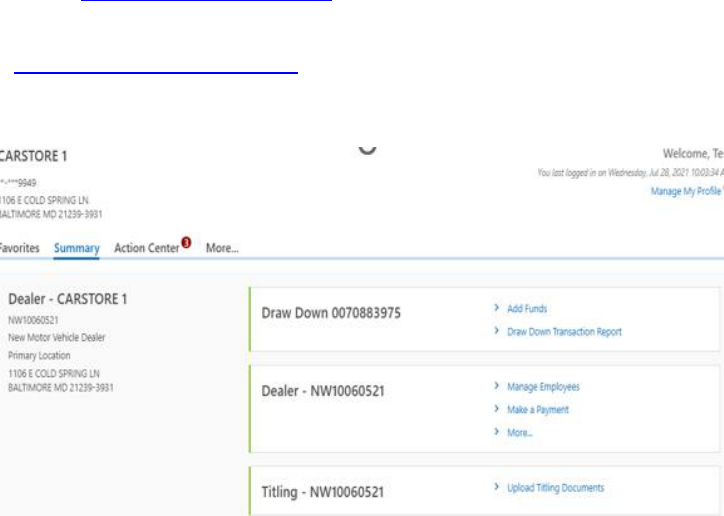
23
eService Portal (electronic submission of paperwork) and Drawdown Account Report
• The e-services portal account is a real time and streamline way customers can communicate & interact with MVA. It is
a new user-friendly way to manage accounts and perform a variety of tasks such as title and registration transaction
requests, make payments to the drawdown account, file documents, and so much more.
• The portal screen has 4 tabs housing Favorites, Summary, Action Center and More…
• Favorites: Allows you to make favorites
• Summary: Allows a 360 view of all locations under your business Federal Identification Number (FEIN)
• Action Center: Allows for adding and updating of customer actions, manage fleets, registration of non-
licensed business entities, track previous title and registration submissions, view and manage messages sent
from MVA, view letters mailed from MVA, management of employee’s names and addresses and management
of access for employees.
• Each account is divided into 3 tabs.
• Drawdown Account: Under this tab, you can add funds and monitor drawdown activity using the drawdown
transaction report.
• This account is a pool of money that is used for only title and registration transactions.
• Once an e-services portal account is established, an email request for a drawdown account must be
sent to mddtts@mdot.maryland.gov.
• This account cannot be used to pay late titling fees or miscellaneous customer fees.
• A refund request for part or all of these funds must be submitted via email to
[email protected]d.gov and will be mailed in 4-6 weeks.
• Dealer Account: Under this tab, you can manage your employees, make payments for late titling fees and
more activities
• Titling Account: Under this tab, you can uploading title and registration transactions
• The portal has 3 access levels:
o Employee Access: At this access level, a dealer/TSA employee can add funds to a drawdown account and
upload and submit transactions.
o Full Access: At this access type, an individual can add or cease access of any employee, submit requests, and
add funds to the account.
o Administrator Access: At this access level, an individual can add or cease accounts, review drawdown
transaction reports, and make payments to the account.

25
Guidance in the Completion of the
The Application for Certificate of Title
Form VR-005
The Application for Certificate of Title is the form you will use to
assist your customer in titling and registering their vehicle(s). It
summarizes the contents of supporting documents in a vehicle’s
title record. The pages that follow provide you with step-by-step
guidance needed to properly complete the form. Maryland
Vehicle Law requires the use of this form. When titling a vehicle,
be sure you have the most recent title.
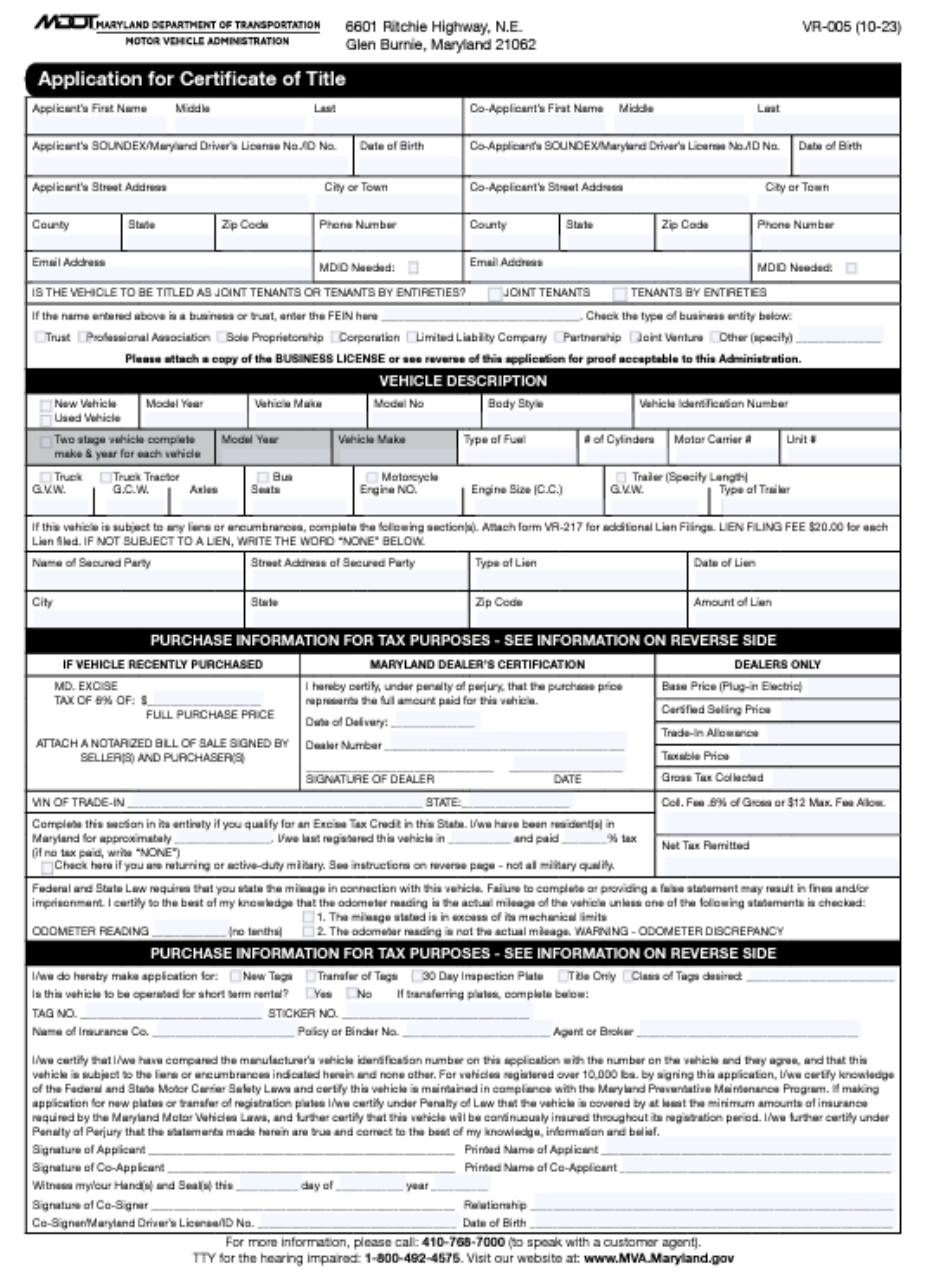
26
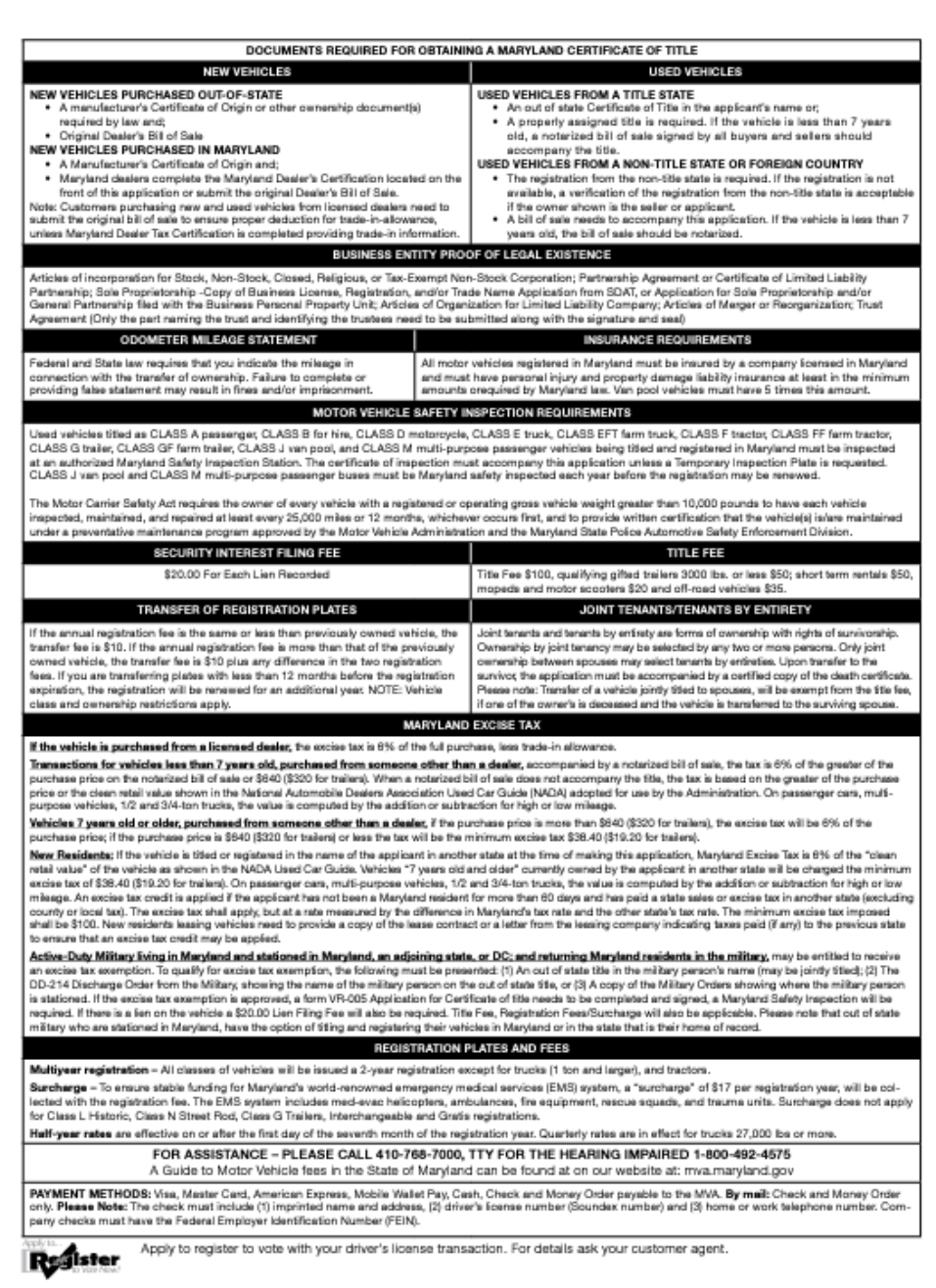
27

28
Proper Completion of the Application for Certificate of
Title
Form VR-005 or Title Application Located on the Reverse of the Maryland Title
OWNER INFORMATION -
For the protection of your customers and your business, be sure to obtain positive
identification from all persons buying vehicles. In most cases, this will be a Maryland
Driver License or Maryland Identification Card. A copy of the identification provided must
be maintained with your records and submitted with the title record to the MVA.
NAMES - Full names of all owners need to be used (First, Middle, and Last). If the
customer’s name contains a middle initial only, this must be verified by the Maryland Driver’s
License, or a Maryland ID Card showing the middle initial.
For new residents to the State who have not yet obtained a Maryland Driver’s License or
a Maryland ID Card, the first, middle and last name must be furnished along with the date
of birth. Since many other states do not use full names on their Driver’s Licenses, you need
to inform the customer that in this State, they need to use their full name.
The name(s) on the application must agree with the assigned Certificate of Origin (CO) or
Title.
Change of Name – Customers having a change of name need to have their Maryland Driver
License corrected before MVA may issue a title showing the new name.
ET AL - Vehicles having more than 2 owners must have the names, soundex numbers, and
signatures of all owners on the title application, (Form VR-005). Only the first owner’s name
and soundex number is shown on the title. Previous to the system upgrade to Customer
Connect, The co-owners’ names are shown as ET AL and the co-owners’ soundex will be Z-
977-777-777-777. The vehicles listed with ET AL have been flagged and all vehicle owners
will be displayed on the vehicle record.
NOTE: When the vehicle is sold, the signatures of all owners will be required to transfer
ownership. The title record needs to be viewed to verify the names of all owners. Contact
MVA to verify the names of all owners on a vehicle showing ET AL.
BUSINESS NAMES - A business entity titling a vehicle must show proof of the legal
existence of the business at the time of titling. At the time of titling, the Federal Identification
number is required. The use of the “Z soundex number” will no longer be issued. The
following documents are acceptable as proof:
• Business License,
• Articles of Incorporation,
• Articles of Organization,
• Partnership Agreement,
• Certificate of Limited Liability Partnership,
• Registration and/or Trade Name Application from SDAT,
• Application for Sole Proprietorship and/or General Partnership filed with Business
Personal Property Unit,

29
• Articles of Merger,
• Articles of Reorganization, or
• the portion of a trust agreement that names the trust and identifies the trustees.
Information provided will be run against the Comptroller of Maryland file. If the business has not
been registered with the MVA, have them complete a Business Entity Submission of Proof for
Vehicle Titling Form VR-475. The following are examples of how names may be shown for
business owned vehicles:
USE OF CARE OF (c/o)-This was normally used for leased vehicles or when the
owner of a vehicle is located out of state, but the vehicle is being used in the State of
Maryland. The MVA will no longer use c/o on MD titles. The title will print “without” the
care of (c/o) and be mailed to the lessor; but the care of (c/o) name and address will print on
the registration card. The care of (c/o) information will also be stored electronically in MVA’s
Customer Connect System for any needed access or verification. It is important to properly
enter the insurance information as well.
Important Note for MVA agents ONLY: If the vehicle is being leased, you must select the
ownership type as “Leased” when entering this into Customer Connect, the Primary Owner
field will change to Primary Lessee Type where you will enter the lessee’s soundex
information; next, on the Vehicle Detail Screen the vehicle details are entered; then the
Leasing Agency screen will appear requesting the Lessor Type, name and address of the
lessor, and the Z- soundex number or FEIN.
Important Note: The MDID/soundex of the person or business as the lessee and the
leasing company/lessor name and address need to be entered. The leasing company
address may be an out of state address, but the lessee address must be the Maryland
address. This change ensures any flag notices relating to the vehicle will be sent to both the
owner and the person or business shown on the c/o. Even though the lessee (or driver) name
is entered in the space for co-owner/lessee, THEY ARE NOT THE CO-OWNER. They are
considered to be part of the address. The owner needs to sign all applications and
documents. The person listed as lessee may not sign the title application unless they are
granted Power of Attorney.

30
Lease Buy-Out – To determine when a lessee is excise tax exempt, when buying out a lease,
see the following information as a guide:
The Maryland Vehicle Law 13-810(C)(11:)
On transfer of a vehicle titled in this State, and issuance of a subsequent title, the vehicle is
exempt from the excise tax imposed by this part, if it is: A vehicle transferred to a lessee who
exercises an option under a vehicle leasing agreement for an initial term of more than 180
consecutive days to purchase the leased vehicle at the end of the lease.
Therefore, the vehicle must be:
•
A leased vehicle titled in Maryland;
•
The Maryland title must be assigned to a lessee(s) who is titling the vehicle in
Maryland; (please note, the title may be assigned directly from the leasing company
to the lessee(s); or in many cases the title is assigned by the leasing company to a
dealer, who in turn assigns it to the lessee(s) who is buying out the lease.
•
The lease contract accompanying the title, must be a (1) long-term lease in excess
of 180 days, and (2) the lessee must be exercising an option contained in the lease
agreement, to buy the vehicle at the end of the lease.
•
If these conditions are met, the transaction is excise tax exempt. IMPORTANT
NOTE: There is “no mention” of whether the lessee is the first lessee, second
lessee, third lessee etc. because that ”is not” what determines the excise tax
exemption.
In addition, this transaction is also exempt from a Maryland Safety Inspection under 23-106(a)(9).
Use of Trading As (T/A) and Doing Business As (DBA)-An individual whose company
is not incorporated (or an LLC) may use Trading As (T/A) and Doing Business As (DBA). As
long as the company is not incorporated (or an LLC), the owner and his/her company are
legally the same entity. Ownership is shown as follows on the application:
Owner Co-Owner
John Brown T/A Browns Little Company
MDID number/Soundex FEIN number
111 Browns Parkway
Glen Burnie AA Maryland 21009
Always obtain the FEIN number when using Trading As (T/A) or Doing Business As (DBA).
Tags may be transferred from a vehicle owned by the individual (John Brown) to a vehicle
owned by the individual T/A his company, or vice versa. An individual cannot Trade As (T/A) a
corporation, LLP, or LLC because they are separate entities. Any application received
requesting that an individual T/A an corporation or LLC must be returned for clarification as to
whether the individual or the corporation/LLC is the owner of the vehicle.

31
A Corporation may Trade As its registered trade name, for example:
America’s Best Company, Inc. T/A ABC, Inc.
In this instance, the corporation is legally the same entity as its registered trade name. You
may contact the Department of Assessments and Taxation for verification at 410-
767-1340 or www.dat.state.md.us. Please be advised, a corporation or LLC may not trade as a
separate corporation or LLC. If one corporation or LLC is using a vehicle belonging to another
corporation or LLC, c/o should be used, not T/A.
Can a corporation or LLC be a co-owner with an individual?” The answer is YES.
Even though this is an unusual request, it can be shown once it is determined that this is truly
what the customer wants. In this case, the corporation or LLC is listed as owner and the
individual as co-owner. The MVA customer agent enters the corporation’s name as owner in
CUSTOMER CONNECT and the individual’s name (do not use c/o in this case) as co- owner.
The title application must contain the FEIN and the co-owner’s MDID number. The application
must be signed by a corporate officer or “member” of the LLC as the owner (must have
capacity stated after signature), and the individual as co-owner.
SOUNDEX NUMBERS – The MVA will no longer issue soundex numbers. A
Maryland Drivers Identification (MDID) number will be created in place of the
soundex number. Enter complete and accurate soundex numbers. DO NOT USE
OUT OF STATE DRIVERS LICENSE NUMBERS. If the applicant does not have a
MDID number, be sure to give their FULL NAME AND DATE OF BIRTH.
In this case the customer agent who processes the work will assign a MDID number.
Please note: For Maryland residents who have not yet obtained their Maryland driver’s license
or ID Card, dealers and titles services using one of the “electronic registration and titling
networks” may contact the ERT Unit at ertsoundex@mdot.maryland.gov or 410-787-7823 or
410-787-2952 to receive assistance. The ERT unit can only issue a MDID if the applicant can
furnish a driver license from another state in the United States. Otherwise, the transaction
must be processed at a full service MVA branch office. Be sure to email a complete
Application for Certificate of Title Form VR-005, on the form check the box “MDID request”,
make sure the customer or business has a Maryland address, a copy of the out of state
driver’s license and the ID card of the title agent for title services is required .
Soundex Numbers for Business Owned Vehicles - The MVA will no longer issue
soundex numbers. When titling vehicles owned by companies, corporations, limited liability
companies, limited liability partnerships, partnerships, etc., be sure to use the FEIN or an
existing Z soundex number if it is available. Please note: Due to the large number of Z
numbers issued in the past, it is best to ask the business to supply a list of Z soundex
numbers that exist and have them merged to one FEIN. Please send merge requests to

32
If a new business has not titled any vehicles with the MVA, a operating office of the business
must complete a Business Entity Submission of Proof for Vehicle Titling Form VR-475.
Important Notice: Improper Issuance/Use of Z soundex numbers is
subject to investigation and penalty of law.
TRUST: For vehicles purchased from a dealer to be titled directly into a Trust, or an Inter Vivos
Trust, the dealer will need to issue a MDID number. The trustee must sign the title application
and all other required documents. A copy of the portion of the Trust Agreement that names the
trust, and the trustee(s) needs to be submitted. This is a “taxable” transaction. Tags may be
transferred from an individual (who is the primary beneficiary) to vehicle titled into an inter vivos
trust.
Please note: Excise tax exemption may only be applied in private (non-dealer) transactions
where a vehicle is already owned in Maryland, and the ownership is being transferred into an
inter vivos trust, and the owner of the vehicle is the primary beneficiary of the inter vivos trust.
Most other trust transactions are taxable. However, any other non-dealer transfers between
trusts and beneficiaries claiming excise tax exemptions, need to be processed at the MVA.
DATE OF BIRTH - Date of birth is required.
ADDRESS - Give a complete Maryland residence address (street address,
apartment/suite/unit number, city, county, state and zip code). P. O. Box may be shown along
with the street address if it is in the same zip code area as the street address. Customer Connect
can now accept a separate mailing address, along with the residence/business address.
However, the title will be mailed to the residence address. For leased vehicle transactions, be
sure to include the FEIN number and address for the lessor and MDID number for the lessee
and select the ownership type as “Leased”. Leasing company may show an out of state
address. Maryland residents in the military, stationed out of State may show an out of state
address if an Address Certification, U.S. Government Employee's", Form VR-102, is completed and
signed by the employer and the employee, or the “Temporary Inspection Waiver”, Form VR-129 is
completed and signed by Maryland members of the U.S. Armed Forces assigned out of state,
and their commanding officer.
JOINT TENANTS AND TENANTS BY ENTIRETIES are forms of ownership with rights of
survivorship. Any two (or more) people may use JOINT TENANTS. Only husband and wife
may use TENANTS BY ENTIRETIES. If Joint Tenants or Tenants by Entireties are selected, it
will have to be selected in Customer Connect under the “Relationship Field” when
processing the transaction. Upon the death of an owner, the survivor needs only to submit a
death certificate and the assigned title to transfer ownership. If there is an open lien, a letter of
authorization from the lien holder will be required. The vehicle will not become part of an estate
and are transferred excise tax exempt, title fee is waived and inspection exempt to the
surviving spouse but title fee will not be waived it the joint tenant is not the spouse or tenant by
entirety survivor.
If neither of the above is selected, joint ownership will be considered TENANTS IN
COMMON. Upon the death of an owner, the surviving owner may transfer ownership with a
death certificate, the assigned title and a lien release/letter of authorization (if applicable).
NOTE: For more information on transfer’s involving deceased owners, see booklet "Instructions
for Transferring Ownership of a Decedents Vehicle", Form VR-151. All Death Certificates
submitted must contain the seal of the Bureau of Vital Statistics.

33
Adding a beneficiary: Legislation effective October 1, 2017, allows a “sole” owner of a vehicle
titled in Maryland to indicate a beneficiary on their title. Attach the form VR-471 below if a
beneficiary is being named at the time of titling. When the title is printed, the name of the owner
will show with the letters TOD (which stands for Transfer on Death) after their name. The owner
of the vehicle has full control over the vehicle during their lifetime, may apply for liens on the
vehicle, and they can even sell the vehicle if they choose to do so. A sole owner of a vehicle that
is already titled in their name may also designate a beneficiary by completing the Beneficiary
Designation For Vehicle Title, Form VR-471, may be completed along with a duplicate title
application. The vehicle may have a lien when a beneficiary is designated. In both cases, only
TOD will show on the title after the owner’s name. The link to add a beneficiary to a vehicle is as
follows: https://mymva.maryland.gov/go/web/VehicleBeneficiary
After the death of the vehicle owner, the person named as beneficiary may bring the title into the
MVA to have the title transferred into their name. The title does not have to be signed by the
owner, but the vehicle record needs to be reviewed to confirm the name of the beneficiary on
file.The beneficiary will need a certified copy of the death certificate, or if MVA’s record for the
vehicle shows an owner deceased flag from the Bureau of Vital Statistics, we can accept that as
proof of death, as well. If the beneficiary does not have the actual title, they may apply for a
duplicate title, completing the reverse of the title entering their name as the buyer, insert TOD for
the purchase price, write the owner’s name in the space for signature of seller with the word
deceased written after it, then sign as the purchaser. The beneficiary will also need to complete
the application for title on the reverse of the title. The relationship to the deceased will determine
whether the vehicle will need to be safety inspected, and whether the registration plates can be
transferred. Transfer to a beneficiary is excise tax exempt. If the beneficiary is a spouse, parent
or child of the deceased owner, there is no safety inspection required. Otherwise, safety
inspection would be needed.
VEHICLE INFORMATION
Check the appropriate box to indicate NEW or USED vehicle.
Enter a full description of the vehicle (Year, Make, Model and Vehicle Identification
Number). Be sure to compare VIN on the application to VIN on Certificate of Origin or Title.
Enter body style, type of fuel and number of cylinders.
TWO STAGE VEHICLES – If the chassis Certificate of Origin is assigned to a second stage
manufacturer who sells the completed vehicle to a retail consumer, two certificates of origin
are required. For transactions requiring two Certificates of Origin, enter complete vehicle
information for both stages and submit Certificates of Origin for both stages. The VIN of the
first stage and the year and make of the second stage will be shown on the title. However, if
the conversion is only cosmetic, the year, make and VIN of the first stage will be shown. If
the chassis Certificate of Origin is assigned to the retail consumer, the application for title can
be accepted with one Certificate of Origin and a bill of sale for the body. This bill of sale will
be to the retail consumer.

34
Second Stage Vehicles
Type of
Vehicle
Required
Statement of
Origin
Vehicle
Identification
# Shown on
Title
Model, Year
Shown on
Title *(1)
Model,
Name Shown
on Title
1. Type A:
Motorhome
1
st
and 2
nd
stage
manufacturer’s
1
st
stage
manufacturer’s
2
nd
stage
manufacturer’s
2
nd
stage
manufacturer’s
2. Type B:
Van
Conversions
meeting the
definition of
Motorhome
1
st
and/or 2
nd
stage
manufacturer’s
1
st
stage
manufacturer’s
1
st
or 2
nd
stage
manufacturer’s
*(3)
1
st
or 2
nd
stage
manufacturer’s
*3
3. Type C:
Chopped
Vans (Mini-
Motorhomes)
1
st
and 2
nd
stage
manufacturer’s
1
st
stage
manufacturer’s
2
nd
stage
manufacturer’s
2
nd
stage
EXCEPTIONS
1-A – Motor Vehicle Administration will accept the model year as certified by the 2
nd
stage
manufacturer provided the model year of the incomplete vehicle appears on the Federally
required label affixed to the vehicle. This label must be prominently displayed on the vehicle to
give notice to a purchaser.
2-B – Definition of Motor Home: The vehicle is equipped with permanently installed living
facilities such as toilet, sink, stove, furnishings, etc. The living portion of the vehicle is a
permanent integral living part of the entire vehicle as originally constructed by the
manufacturer or reconstructed upon the chassis of a motor vehicle.
3-C – If the conversion is more than cosmetic and the 2nd stage manufacturer is
licensed, both Certificates of Origin are required, in which case use the 2nd stage model
year and model name. If the conversion is only cosmetic, use 1
st
stage Certificate of
Origin’s vehicle identification number, year and model name.
Titling Trucks
TRUCKS - Enter GROSS VEHICLE WEIGHT (GVW), which is the weight of the vehicle plus
the load. Only enter GROSS COMBINATION WEIGHT (GCW) for a truck if it will be pulling a
"Freight Trailer" in excess of 20,000 lbs.; or a tractor pulling a trailer in excess of 10,000lbs.
GROSS COMBINATION WEIGHT (GCW) is the weight of the pulling vehicle (Truck or Tractor)
and its load plus the weight of the trailer and its load.

35
NOTE: If your customer needs assistance in selecting gross vehicle weight or gross
combination weight call "Commercial Vehicle Enforcement Division" at 410-579-5959.
1/2 AND 3/4 Ton Trucks – Usually select 7,000 lbs. GVW . However, if the GVW R is above
7,000 lbs., a GVW of 10,000 lbs. may be selected. A 1/2 or 3/4 ton truck cannot be raised
above 10,000 lbs. The Customer Connect system will print SP on the registration card, only
if a ½ or ¾ ton truck shows 10,000lbs and a two year registration. Since a certificate of
origin is not available to verify the GVWR for used truck transactions, the vehicle owner may
use the ½ and ¾ Ton Truck Owner’s Weight Certification Form VR-142A to choose the
maximum weight of 10,000 lbs., desired.
A One-ton truck’s minimum GVW is 10,000 lbs. A one-ton truck may only register for a I
year registration. One-ton trucks owners may select a higher weight in 1,000lb increments as
requested by the owner. If a truck owner is not sure how much weight to select, they can look
at the GVWR (Gross Vehicle Weight Rating) by the manufacturer, or contact "Commercial
Vehicle Enforcement Division" at 410-579-5959.
For larger trucks, see Truck Schedule of Fees Form VR-042A
Indicate on the application Truck or Truck Tractor (if applicable)
DUMP TRUCKS - A dump truck may use EPO, EPD or ED4 tags. If EPD or ED4
Dump Service tags are selected, the truck will not be subject to axle weight limitations at
weigh stations. However, if EPO tags are selected, the truck is subject to axle weight
limitations according to the bridge formula just as any other truck would be.
If dump service tags are desired, complete the Dump Truck Certification
http://mvgbintranet1/forms/VR/VR-098.pdf
Indicate the number of axles on the title application and submit a side view photograph of the
vehicle.
2-axle dump - may only show a GVW of 40,000 lbs. Enter 2X in the exception field in
CUSTOMER CONNECT or ERT program. (A higher weight may be selected for
GCW.)
3or more axles - select between 40,000 - 55,000 lbs. Enter 3X in the exception
field in CUSTOMER CONNECT or ERT program. (A higher weight may be
selected for GCW .)
4or more axles - operating in Garrett and Alleghany counties only, may select up
to 70,000 lbs. Enter 4X or higher number of axles in the exception field in
CUSTOMER CONNECT or ERT program. (A higher weight may be selected for
GCW ).
Class ED4 (4 or more axles) with lift axle certification by the manufacturer
may select between 56,000 - 70,000 lbs. Enter 4X or higher number of axles
in the exception field in CUSTOMER CONNECT or ERT program. Class
ED4 vehicles may operate statewide. The “lift axle certification” must be
carried in the vehicle and a copy needs to be submitted to the MVA to
request class ED4 registration. (A higher weight may be selected for GCW ).
Note: You must count the first axle when determining the number of axles.

36
NOTE: 3-axle dump trucks registered at 65,000 pounds prior to January 1, 1995 may
operate at that weight until December 31, 1999. However, after December 31, 1999,
65,000 lb. dump trucks may operate at that weight for a maximum of twenty years
based on the model year. Once reaching 20 model years old, they must either reduce
weight to 55,000 lbs. or have a lift axle installed.
DUMP TRUCKS IN COMBINATION WITH FREIGHT TRAILERS IN EXCESS OF
20,000 LBS: A dump truck pulling a trailer in excess of 20,000 lbs. must show both
GVW and GCW on the registration card. Registration fees for dump trucks
operating in combination are calculated as follows:
(1)
Find the fee for the “GVW ” using the Dump Truck Schedule of Fees on Form
VR-042A;
(2)
Use the Truck Schedule of fees on form VR-042A to find the “dollar
per thousand” amount for the GCW selected;
(3)
Find the difference between the GCW and the GVW ;
(4)
Multiply the “difference” times the “dollar per thousand” figure; and add the result
to the cost for the GVW in item (1). This will give you the total registration fee for
the dump truck in combination.
NOTE: When a dump truck using either EPD or ED4 tags is pulling a trailer
(freight or non-freight), the axle weight limit exemptions that normally apply to
“dump trucks” are not applicable. This means that a dump truck pulling a trailer will
have its axles weighed at the Weigh Station.
NOTE: Even though GCW is not needed unless a truck is pulling a freight trailer
in excess of 20,000lbs, the weight selected for GCW “may be” equal to or only
slightly higher” than the GVW because the truck may be operated empty while
pulling the heavy trailer.
OUT OF STATE TITLED DUMP TRUCKS REQUESTING “DUAL REGISTRATION”
IN MARYLAND
For a dump truck titled and registered in another state, usually a surrounding state,
requesting dump truck registration in Maryland, a process “Registration Only for
Dump Trucks” is now in place. This allows the registration to be issued without
sending the title information to NMVTIS since Maryland is not the state of title. The
regular title and registration must remain in place Out of State. A copy of the Out of
State Title and Out of State Registration are required along with the Dump Truck
Certification, for VR-098. This procedure may be done in Full Services Branch
Offices, and the Vehicle Services Division, at Glen Burnie MVA. There is no title fee
or tax charged, just the registration fee for the Dump Truck Weight selected. This
transaction does not require Safety Inspection. Complete the form VR-098
Certification for the Issuance of Dump Service License Plates. Dump truck
registration fees are shown on the form Dump truck Schedule of Fees, Form
VR-042A;
APPORTIONED REGISTRATION (International Registration Plan): For assistance

37
with apportioned registration, call Motor Carrier and Electronic Services at 410-787-
2971.
BRIDGE FORMULA- Information regarding bridge formulas may be obtained from
the State Highway Administration (SHA). Their number within Maryland is 1-800-
543-4564 outside Maryland 410-582-5734. You may also contact the SHA for a
Motor Carrier Handbook.
TOW TRUCKS - Complete Tow Truck Certification Form VR-294 entering Gross
Vehicle Weight Rating (GVW R) and required insurance certification information. Tow
trucks must have a minimum manufacturer’s GVW R of 10,000 lbs. or more and be
equipped as a tow truck or rollback. Vehicles showing a GVW R of 26,000 lbs. or
under will show U26 in the exception field on the registration. The registration fee will
be $185.00 plus a $17.00 surcharge. Vehicles showing a GVW R over 26,000 lbs. will
show O26 in the exception field on the registration. The registration fee will be $550.00
plus a surcharge of $17.00. Indicate tow truck or rollback on the form.
Class T will be selected for tow trucks used exclusively for towing. N/A will be shown
for GVW and GCW. Fee for U26 is $185.00. Fee for O26 is $550.00. A $17.00
surcharge will also be assessed.
Class TE will be selected for rollbacks and tow trucks used for towing and other hauling.
GVW must be entered and GCW may be entered if applicable. If weight selected is
18,000 lbs. or less fee is $185.00 and the $17.00 surcharge. Over 18,000 lbs., but less
than 26,000 use fee from regular truck chart see Truck Schedule of Fees (Form VR-
042A). If the weight selected is above 26,000 lbs. up to 40,000 lbs., the fee is $550.00.
Over 40,000 lbs. use fee from regular truck chart by clicking on the link above.
Bulletin October 2020: Tow Truck/Rollback Registration Card Changes in
Customer Connect
The Maryland Department of Transportation, Motor Vehicle Administration (MDOT MVA) has
begun its system modernization for Vehicle Services, Business Licensing, and Insurance
Compliance. The new modernized system is called Customer Connect. You will see changes on
the Tow Truck/Rollback registration cards produced by the new system and this bulletin will
explain those changes. One of the changes in the system requires that a “Use” for the vehicle be
indicated. Even though the current registration cards do not show a use, we do plan to include
that feature with a redesign of the registration card in the future. Below is an explanation of the
difference you see currently on the registration cards issued prior to July 6, 2020, and the
registration cards issued beginning July 6, 2020, when our system modernization began. We
appreciate the opportunity to bring this matter to your attention.
(Old)Registration cards, issued “prior to July 6, 2020”, for tow trucks and rollbacks show the
following information:
• Tow Truck (Exclusively for towing): Class T; Exception field U26 or O26; GWV N/A
and GCW N/A;
• Rollback (For towing or “other” hauling) Class TE, Exception field shows U26 or
O26; GVW shows weight at the thousand-pound increment selected by the owner and for

38
GCW shows N/A, or if pulling freight trailers, shows thousand-pound increment selected
by the owner.
Note: The U26 of O26 in the exception field indicates, as provided by law, that the vehicles
GVWR is either up to and including 26,000lbs, or is over 26,000lbs
Important: Many of these registration cards are still in use and are acceptable forms of
registration for tow trucks and rollbacks, as always, until renewed or replaced.
(New) Registration cards, issued “July 6, 2020 or later”, show the following information, and
there are four (4) different options determined by the truck type (tow truck or rollback) and
“use” of the vehicle and only the class T is used. The options are as follows:
• Rollback Use type Tow Truck (Exclusively Vehicles) Use is exclusively for towing
vehicles for the purpose of repair, storage, or removal of abandoned vehicles from the
highway: Class T; Exception field U26 or O26 GWV shows 0-26,000 lbs. or Over 26,000
lbs GCW shows N/A
• Rollback (Use type Tow Truck (Other) The vehicle may be used for both towing and
other hauling: Class T; Exception field U26 or O26
o GVW Options:
7000 lbs.; 10000 lbs.; 10001 – 11000 lbs.; 11,001-12,000 lbs.; 12001 – 13000
lbs.; 13001 – 14000 lbs.; and every 1000 lbs. range up to 79001 – 80000 lbs.;
Over 80000 lbs.
o GCW Options:
N/A; 10000 lbs.; 11000 lbs.; 12000 lbs.; and every 1000 lbs. up to 80,000lbs
• Tow Truck Use Type Tow Truck (Exclusively Vehicles) Use is exclusively for towing
vehicles for the purpose of repair, storage, or removal of abandoned vehicles from the
highway: Class T; Exception field shows U26 or O26;
GWV shows 0 - 26,000lbs, or Over 26,000 lbs.; GCW shows N/A
• Tow Truck (Use type Tow Truck (Other). The vehicle may be used for both towing and
other hauling: Class T; Exception field U26 or O26
o GVW Options:
7000 lbs.; 10000 lbs.; 10001 – 11000 lbs.; 11001 – 12000 lbs.; 12001 – 13000
lbs.; 13001 – 14000 lbs.; and every 1000 lbs. up to 79001 – 80000 lbs.; Over
80000 lbs.
o GCW Options:
N/A; 10000 lbs.; 11000 lbs.; 12000 lbs.; and Every 1000 lbs. up to 80000
lbs.
TRUCK TRACTORS (CLASS F) – Indicate the gross combination weight (GCW) only.
IRS Form 2290
If you have just purchased the vehicle and are registering it within 60 days of the purchase, you
do not need to file the Heavy Highway Vehicle Use Tax (form # 2290). In Maryland, if you can
provide a bill of sale or other evidence of a title transfer, you can title and register your vehicle.
You do not need to provide a Heavy Highway Vehicle Use Tax Form 2290, if you have
acceptable evidence of ownership that is within 60 days of the transaction. The heavy highway
vehicle use tax is a fee assessed annually on vehicles that operate on public highways with
registered gross weights of 55,000 pounds or more. The weight includes the motor vehicle, any
trailers and the maximum load carried by the truck-trailer combination. If you own a motor vehicle
with a taxable gross weight of 55,000 pounds or more, you are required to file the Heavy
Highway Vehicle Use Tax Form 2290 with the IRS. The tax period begins on July 1 and ends on
June 30, each year.

39
• You must provide your Heavy Highway Vehicle Use Tax Form 2290 and Schedule 1,
listing your vehicles by vehicle identification number, stamped with an IRS receipt to
renew your vehicle’s registration.
•
Vehicles Exempt from filing the 2290 are: The Federal Government; The District of
Columbia; A state or local government; The American National Red Cross; A non-profit
volunteer fire department, ambulance association, or rescue squad; An Indian tribal
government but only if the vehicle's use involves the exercise of an essential tribal
government function,; A mass transportation authority if it is created under a statute that
gives it certain powers normally exercised by the state; qualified blood collector vehicles
used by qualified blood collector organizations; and, mobile machinery that meets the
specifications for a chassis as described under Specially designed mobile machinery for
non-transportation functions later.
IRS Form 2290 Link to efile and obtain the form is https://www.irs.gov/forms-pubs/about- form-
2290.
A customer may contact the IRS at https://www.irs.gov/help/contact-your-local-irs-office or call 1-
866-699- 4096 to determine if a TAC in their area requires an appointment.
FARM TRUCKS - must have a GVWR above 6,000 lbs. to qualify. The minimum GVW that may
be selected is 10,000 lbs. but a higher weight may be selected based on bridge formula
guidelines from Maryland State Police Commercial Vehicle Division. Complete Application and
Certification for Issuance of Farm Tags Form VR-097.
FARM TRUCK TRACTORS (CLASS FF) - Indicate gross combination weight only (GCW).
Please note that farm truck tractors “are taxable transactions”. Complete Application and
Certification for Issuance of Farm Tags Form VR-097.
FARM AREA VEHICLE (CLASS K) - Must be owned by a farmer for farm use only,
operated only on a farm or a highway within a 25-mile radius of the farm, and the applicant must
prove active farm status. Registration Fee is $2.50 per registration year. Application for
Issuance of Farm Area Vehicle Tags or Island Tags
https://mva.maryland.gov/Documents/VR-331.pdf
Bus Class P – Buses operating Intrastate (only in MD) need to submit their Public Service
Commission (PSC) Vehicle Listing TR605, containing the stamp of the PSC. A Maryland safety
Inspection is not required since they are subject to inspections through the PSC. The PSC can
be reached at 410-767-8128. Buses Operating Interstate (MD and Out of State) must provide a
Certificate of Authority from the Federal Motor Carrier Safety Administration (FMCSA). FMCSA
completes an inspection of these vehicles at the time the DOT number is assigned. FMCSA
may be reached at 202-366-4000.
NOTE: Temporary Registration (30 Day) may not be issued for class P vehicles.

40
SCHOOL BUSES- School Vehicle Tag Certification (Form EP-216) must be submitted
electronically before tags are issued. The EP-216 is only available from the Board of
Education, or MVA’s School Vehicle Safety Technical Program. The EP-216 submission but be
done by a member of the Vehicle Safety Technical Program or the Board of Education.
A Maryland Safety Inspection Certificate is not required since once registered, these buses are
under the authority of the School Vehicle Safety Section and already are subject to annual
inspection. The Vehicle Safety Technical Program telephone number is 410-768-7401. An EP-216
is not required for tag renewal.
NOTE: Temporary Registration (30 Day) may not be issued for school buses.
Non-School Buses Painted a Color Other Than School Bus Yellow - A class M tag
will be issued to vehicles having the body style of a school bus but painted a color other than
international school bus yellow and flashing lights must be removed. No tag may be issued
unless this is completed and certified on the Multipurpose Certification Form VR-095. This
type of vehicle requires an annual inspection.
NOTE: Buses converted to motor homes will be registered as class M, do not require
annual Maryland Safety Inspection, and will show a body style of MH.
Taxi Class B - Is a motor vehicle designed to carry 7 or fewer individuals, including the
driver, transporting passengers for hire. If doing business in Baltimore City, Baltimore County,
Cumberland, or Hagerstown, a Passenger Vehicle Listing form TR-605 is required from the
Public Service Commission PSC. The PSC can be reached at 410-767-8128 Note: Taxi “does
not” include vehicles operated on regular schedules and between fixed termini approved by
PSC.
NOTE: Taxis operating in other areas of Maryland should present approval/operating authority
from the jurisdiction in which they are operating. However, there are some jurisdictions that do
not require this.
Limousine Class Q - An initial request requires a Certification for Issuance of Limousine
Vehicle Registration form VR-032 https://mva.maryland.gov/Documents/VR-032.pdf In
addition, Public Service Commission form TR-605 is required to be submitted prior to tags being
issued. PSC may be contacted at 410-767-8128. Important Note: Any limousine over 35 feet
long is to be registered as a class P. Effective June 1, 2021, an individual may not operate, or
allow an individual to operate, a motor vehicle designed to carry 15 or fewer passengers,
including the driver, unless the individual holds a valid for-hire driver’s license or Transportation
Network Operator’s License issued by the PSC or the appropriate local authority.
MOTORCYCLE - Enter engine number and engine size on the VR-005. Complete the
"Motorcycle Equipment Certification" Form VR-094. Legislation enacted in 2008 defines a
motorcycle as a motor vehicle that:
•
Has Motive Power;
•
Has a seat or saddle for the use of the rider;
•
Is designed to travel on not more than three wheels in contact with the ground at
speeds exceeding 35 MPH;
•
Is of a type required to comply with all motor vehicle safety standards applicable to

41
motorcycles under federal law
NOTE: Motorcycles “not manufactured for use on the road” will "NOT" be issued
registration plates. Enter “YES” in the Off-Road Vehicle box in Customer Connect.
This will cause "NR" to be entered in the inspection field on the title.
AUTOCYCLES - Complete the Autocycle Certification FormVR-339. Legislation enacted in
2016 defines an Autocycle as a motor vehicle that:
•
Has two (2) front wheels and one (1) rear wheel.
•
Has a steering wheel.
•
Has permanent seats on which the operator or a passenger is not required to
sit astride.
•
Has foot pedals to control acceleration, braking and if applicable, a clutch; and
•
Is manufactured to comply with Federal Safety Standards for motorcycles.
Autocycles will be registered as a class D, with AU in the body style, and A in the exception
field. Autocycle operators must possess a valid class A, B or C driver’s license. If a person
only has a class M, motorcycle license, they are not authorized to drive an Autocycle. Helmets
must be worn unless the vehicle has an enclosed cab. Eye protection must be worn unless the
vehicle has a windscreen. An applicant may not use an Autocycle for any driving test.
MOPEDS AND MOTOR SCOOTERS-Effective October 1, 2012, mopeds and motor
scooters are required to be titled and display an identifying decal. Operators and their
passengers are required to wear helmets, protective eye gear, and display proof of
insurance. Complete the Application for Title Decal for Mopeds, Motor Scooters,
ATV’s, UTV’s, Off Road Vehicles, and Snowmobiles:
https://mva.maryland.gov/Documents/VR-337.pdf
See complete details by clicking the link below:
https://mva.maryland.gov/about-mva/Pages/info/27300/27300-76T.aspx
LOW SPEED VEHICLE- A low speed vehicle is designed to carry not more than four people. A
low speed vehicle is a four-wheeled motor vehicle that has a maximum speed capability that
exceeds 20 miles per hour but is less than 25 miles per hour. The vehicle must have at least four
wheels in contact with the ground and an unladen weight of less than 3,000 lbs. Low speed
vehicle does NOT include golf carts or electric personal assisted mobility devices (EPAMD).
NOTE- A Low Speed Vehicle Application Form VR-324 must be completed. When
processing the transaction it will be registered as a Class R. LV will be placed in the body
style for all low speed vehicles. Class “R” tags are only available at the Glen Burnie MVA.
ALL TERRAIN VEHICLES (ATV, or UTV)- Registration may not be issued. However, a
title shall be processed through the Electronic Titling and Registration System (ERT). The title
fee for an ATV or UTV is $35.00. The transaction will be done as title only with OR as the body
style and the class will be D. The exception codes will be ATV for all terrain vehicles. NR will be

42
placed in the inspection field for not roadworthy. A title decal will be issued and the fee for the
decal is $5.00. The customer will need to complete the application for the decal VR-337.
Should the selling dealership indicate they do not have the ERT System please refer the
applicant to the MVA web site mva.maryland.gov for the name and address of a licensed tag
and title service listed under Vehicle Services.
TRAILERS - Indicate the trailer type on the application (boat, utility, camping, travel, etc.)
Non-freight trailers will show GVW on the registration card and will be weighed separately from
the pulling vehicle at the weigh station. The weight must be chosen in thousand-pound
increments. Non-freight trailers select GVW.
Show weight as follows:
0 – 3,000 lbs.
Fee $25.50
14001 – 15000 lbs. Fee $124.00
3001 – 5000 lbs.
Fee $51.00
15001 – 16000 lbs. Fee $124.00
5001 – 10000 lbs.
Fee $80.00
16001 – 17000 lbs. Fee $124.00
10001 – 11000 lbs.
Fee $124.00
17001 – 18000 lbs. Fee $124.00
11001 – 12000 lbs.
Fee $124.00
18001 – 19000 lbs. Fee $124.00
12001 – 13000 lbs.
Fee $124.00
19001 – 20000 lbs. Fee $124.00
13001 –14000 lbs.
Fee $124.00
Freight Trailer is a trailer weighting in excess of 20,000 lbs. pulled by a truck; or a trailer
weighing in excess of 10,000 lbs. pulled by a tractor. Fee $38.25
NOTE: A freight trailer will show N/A on the registration card for GVW and GCW and
will be weighed in combination with the vehicle pulling it. That combined weight cannot
exceed the GCW selected on the registration of the pulling vehicle. This includes farm
trailers over 20,000 lbs.
The Class/Fee Chart (Prior to July 6, 2020):
http://mvgbformsrv/FormsRepo/VR/VR-238.pdf provides a complete list of
vehicle classes, requirements and registration fees. This chart is being included
in the manual since there are still vehicles with registrations and titles that
were issued prior to July 6, 2020 with this information.
The Customer Connect Class Chart July 6, 2020 and after:
http://mvgbformsrv/FormsRepo/VR/VR-522.pdf
LIEN RECORDING- Give complete and accurate lien information: amount of lien, kind of lien,
account number, date of lien, FEIN, name, and address of secured party. WORK CANNOT
BE PROCESSED WITHOUT COMPLETE LIEN INFORMATION. All first
liens are placed on the title application. (Even though an account number is requested, the
MVA will not reject any request to record a lien, for lack of an account number).
SECOND AND ADDITIONAL LIENS are recorded by attaching a "SECURITY INTEREST
FILING STATEMENT" Form VR-217. A $20.00 lien fee is charged for each lien recorded.
Second and additional lien holders will not receive a Notice of Security Interest Filing.
NOTE: Banks, credit unions, finance companies and dealers do not need to submit a
lien contract at the time the lien is recorded. ALL OTHER LIEN HOLDERS MUST
SUBMIT A COPY OF THE CONTRACT AT THE TIME THE LIEN IS RECORDED. A
lien contract must contain a description of the vehicle to include the year, make and
vehicle identification number. The lien contract must also contain language that there is

43
a security interest, and the signature(s) of all debtors. All contracts must be signed by
“at least” all owners of the vehicle. There may also be additional co-signors on a lien
contract.
An updated Lien Code file is provided to the ERT Vendors weekly.
Purchase Price Information and Calculation of Excise Tax
Enter the purchase price.
BILL OF SALE - The names on the bill of sale must match the assigned title or certificate
of origin. A bill of sale only needs to be submitted for vehicles sold by out of state dealers.
Maryland Dealers complete the "Maryland Dealers Certification" on the Application for
Maryland Certificate of Title Form VR-005, or complete the price certification on the
Maryland Dealers Reassignment (form VR-182), the price certification on the Dealers
Reassignment on the reverse of the Maryland title or Maryland salvage certificate.
The person signing for the dealership needs to indicate their capacity after their signature or
indicate that they have Power of Attorney to sign for the dealership.
The Power of Attorney of the person authorized to sign for the dealership must be kept on file
at the dealership and be made available upon request by MVA.
EXCISE TAX - Is based on the price as certified by the dealer, less trade-in, with no
allowance for down payment or manufacturers rebate.
Taxable items include:
•
The retail purchase price
•
The shipping or freight charges
•
After manufacture items included with the vehicle at time of purchase, and
•
Manufacturer rebates
•
Maryland dealers may charge a processing fee up to $500.00. This processing fee
must be added to the purchase price and is taxable. NOTE: The processing fees
charged by out of state dealers are sometimes higher. The “full amount” charged for a
processing fee by an out of state dealer is taxable.
Non-taxable items include:
•
Dealer trade-in allowance (see page 45)
•
Dealer discounts or rebates
•
Extended warranties
•
Mechanical repair contracts
•
Federal excise tax
•
Electronic registration fee, and
•
Equipment installed to accommodate a disabled person.
Maryland dealers are "Entitled" to keep 0.6% of the excise tax up to $12.00 on all vehicle
classes. The calculation of the 0.6% of the excise tax is shown on the Maryland Dealer’s
Tax Certification located on the Application for Certificate of Title Form VR-005, the
Maryland Dealer’s Reassignment (form VR-182), Maryland Certificate of Title, the Maryland

44
Notice of Security Interest Filing (for sale of repossessed vehicles in this State), or the
Maryland Certificate of Salvage.
Code of Maryland Regulation 11.15.33 provides guidance in proper procedures for
calculation of excise tax due on dealer sales and how and when to apply trade-in
allowance. The regulation also provides guidance on which items are taxable and which
are not taxable. The complete regulation is as follows:
Title 11 DEPARTMENT OF TRANSPORTATION
Subtitle 15 MOTOR VEHICLE ADMINISTRATION — VEHICLE REGISTRATION
Chapter 33 Vehicle Trade-In Allowance
Authority: Transportation Article, §§12-104(b), 13-809, and 13-812, Annotated Code
of Maryland
01 Applicability.
This chapter applies to the use of a dealer trade-in allowance to determine the total
purchase price of a vehicle that is used to calculate the excise tax remitted when
purchasing another vehicle.
.02 Purpose.
The purpose of this chapter is to establish the requirements and guidelines for
calculating the total purchase price of a vehicle when there is a dealer trade-in
allowance, as set forth in Transportation Article, §13-809, Annotated Code of Maryland.
.03 Definitions.
A. In this chapter, the following terms have the meanings indicated.
B. Terms Defined.
(1)
"Administration" means the Motor Vehicle Administration.
(2)
"Certified selling price" means the full price of the vehicle purchased before the
trade-in allowance is deducted.
(3)
"Dealer" has the meaning stated in Transportation Article, §11-111, Annotated
Code of Maryland.
(4)
Lease.
(a)
"Lease" means a signed contract or agreement for the rental or leasing of a
vehicle for more than 180 consecutive days.
(b)
"Lease" includes a lease where the vehicle is intended or not intended as
security as defined in Transportation Article, §11-127.1, Annotated Code of Maryland.
(5)
"Leased vehicle" means a vehicle acquired from a dealer, by the lessor, for lease
of the vehicle to a lessee for payment under the terms and conditions of a lease.
(6)
"Lessee" means a person or entity who, under the terms and conditions of a lease
made at the time of acquisition from a dealer, has possession of the leased vehicle.
(7)
"Lessor" means a person or entity who, at the time of acquisition from a dealer,
relinquished possession of the vehicle to a lessee under the terms and conditions of the
lease.
(8)
"Non-leased vehicle" means a vehicle in which a person or business entity
holds both title to, and possession of, the vehicle.
(9)
"Taxable price" means the total purchase price as stated in Transportation Article,
§13-809, Annotated Code of Maryland.
(10)
"Trade-in" means a vehicle assigned to a dealer for the purpose of receiving a
deduction in value that is applied to the purchase price of another vehicle.
(11)
"Trade-in allowance" means the amount determined by the dealer that is
deducted from the purchase price of another vehicle.
45
04
Total Purchase Price.
A. The total purchase price or taxable price of a vehicle is determined by the certified
selling price agreed on by the buyer and the seller, including any dealer processing
charges as defined in Transportation Article, §15-311.1, Annotated Code of Maryland,
less an allowance for the trade-in. There is no other nonmonetary consideration.
B. The taxable price of the vehicle shall include:
(1)
The retail purchase price;
(2)
The shipping or freight charges;
(3)
After manufacture items included with the vehicle at time of purchase; and
(4)
Manufacturer rebates.
(5)
Dealer Processing Fee (Optional for Dealer to charge Processing fee but if they
do it is taxable and limited to $500.00) Please note, item 5 is not in regulation but is
in Maryland Vehicle Law. This has been inserted for clarity of the process.
D. A dealer may not include the cost for any nontaxable items when determining the
taxable price of the vehicle. Nontaxable items include:
(1)
Dealer trade-in allowance;
(2)
Dealer discounts or rebates;
(3)
Extended warranties;
(4)
Mechanical repair contracts;
(5)
Federal excise tax;
(6)
Electronic registration fee; and
(7)
Equipment installed to accommodate a disabled person
05
Trade-in Allowance.
1
A. A dealer determines the trade-in allowance that is deducted from the purchase price
of another vehicle.
B. A trade-in allowance may not be divided or deducted from the purchase price of
more than one vehicle.
C. Only one traded-in vehicle can be applied to a sales transaction for purposes of the
trade-in allowance deduction.
D. A vehicle titled in Maryland or out-of-State may be used as a trade-in.
E. If the vehicle traded-in is subject to a lien, the owner or co-owners of the vehicle are
entitled to the full trade-in allowance, as stated in §A of this regulation, and deducted
from the total purchase price. The trade-in allowance is not limited to the amount of
equity the owner has in the vehicle.
F. If the trade-in allowance exceeds the trade-in value indicated in a national
publication of used car values adopted for use by the Administration, the dealer shall
provide documentation that satisfies the Administration that the higher trade-in value is
justified. Documentation includes:
(1)
Evidence of the amount required to release the lien on the trade-in vehicle;
(2)
Evidence of the vehicle customization that increases the vehicle value;
(3)
A current valuation from an alternative national publication; or
(4)
If the traded-in vehicle has already been sold, the actual resale price of the trade-
in vehicle.
06
Applying the Trade-in Allowance.
A. When applying a trade-in allowance to the certified selling price to determine the
taxable price of the vehicle purchased, the dealer shall complete one of the following
forms:
(1)
Application for Certificate of Title (VR-5);
(2)
Maryland Dealers Reassignment (VR-182);
46
(3)
Dealers Reassignment on the reverse side of the Maryland Certificate of Title
(VR-2);
(4)
The Dealer's or Auto Wreckers Re-Assignment on the reverse side of the
Maryland Salvage Certificate (VR-108); or
(5)
The Dealer's Reassignment on the reverse side of the Maryland Notice of
Security Interest Filing (VR-2), if the dealer is selling a repossessed vehicle.
B. When applying a trade-in allowance, a dealer shall:
(1)
Complete the Maryland Dealer's Certification portion of the application for title; or
(2)
Provide an original bill of sale showing the certified selling price and amount of the
trade-in allowance.
C. The dealer shall determine and enter on the Maryland Dealer's Certification portion
of the application for title:
(1)
The certified selling price;
(2)
The trade-in allowance;
(3)
The taxable price of the vehicle by deducting the amount of the trade-in allowance
from the certified selling price;
(4)
The gross tax remitted by calculating the applicable excise tax rate times the
taxable price; and
(5)
For licensed Maryland dealers, the net tax remitted by:
(a)
Multiplying 0.6 percent times the gross tax remitted up to $12; and
(b)
Subtracting the result from the gross tax collected.
D. When the trade-in allowance is equal to, or higher than, the total purchase price, the
excise tax shall be $0.
E. When the excise tax is exempt under Transportation Article, §13-810, Annotated
Code of Maryland, or calculated as $0 as set forth in §D of this regulation, no additional
allowance or refund shall be given to the purchaser of the vehicle.
F. When a certificate of title or a dealer reassignment is submitted without the required
Maryland Dealer's Certification showing the trade-in allowance information on the form, a
dealer shall submit with the certificate of title or a dealer reassignment:
(1)
A completed Application for Certificate of Title (VR-5) containing the required
certification; or
(2)
An original bill of sale showing the:
(a)
Purchase price and the amount of trade-in allowance;
(b)
Vehicle identification number of the trade-in vehicle; and
(c)
State in which the trade-in vehicle was last titled.
07
Qualifications for Trade-in Allowance.
A. A trade-in allowance under Transportation Article, §13-809(a)(3)(i), Annotated Code
of Maryland, shall only apply when:
(1)
The owner or co-owner of the trade-in vehicle is the owner or co-owner of the
vehicle being purchased; or
(2)
The owner or co-owner of the trade-in vehicle is a relative as defined in §B of this
regulation of the owner or co-owner of the vehicle being purchased.
B. In this regulation, a relative means a spouse, son, daughter, grandchild, parent,
sister, brother, grandparent, father-in-law, mother-in-law, son-in-law, or daughter-in-law
of the owner or co-owner of the trade-in vehicle and is the owner or co-owner of the
vehicle being purchased.
C. For a relative who qualifies for a trade-in allowance, the dealer shall submit an
application for a certificate of title to the Administration with:
(1)
A completed application for Maryland Gift Certification (VR-103) certifying the
47
relationship to the owner or co-owner of the trade-in vehicle and vehicle being
purchased; and
(2)
Proof of the relationship if the last names of the relatives are different.
D. A trade-in allowance may be applied when the owner of the trade-in vehicle is the
primary beneficiary of an inter-vivos trust and the purchased vehicle is in the name of the
inter-vivos trust.
.08 Trade-in Allowance for Leased Vehicles.
A. A trade-in allowance under Transportation Article, §13-809(a)(3)(ii), Annotated Code
of Maryland, may be applied to the purchase price of a leased vehicle if:
(1)
The trade-in is in the same owner's name as the name of the lessee on the
purchased vehicle; or
(2)
The vehicle is:
(a)
Owned by the same leasing company purchasing the vehicle;
(b)
Being assigned to the dealer; and
(c)
Becoming a part of the dealers inventory for resale.
B. A trade-in does not include a vehicle acquired by a dealer but not assigned to a
dealer.
Effective date: April 6, 2009 (36:7 Md. R. 526)
Regulation .05A, C amended effective November 24, 2014 (41:23 Md. R. 1374)
Regulation .05F adopted effective November 24, 2014 (41:23 Md. R. 1374)
Regulation .06C amended as an emergency provision effective August 18, 2011 (38:19
Md. R. 1146); amended permanently effective November 14, 2011 (38:23 Md. R. 1422)
Understanding EXEMPTIONS FROM EXCISE TAX is another important area to
know in calculating the proper amount of tax due. Most of the excise tax exemptions
that may apply to dealer sales are in section (a). For your reference section
(b) and (c) has also been included even though in most cases, they do not relate to dealer
transactions; these sections will be helpful to licensed title services who assist customer
with non-dealer transactions. Maryland’s law for excise tax exemption is provided for you
below:
MARYLAND VEHICLE
LAW§13-810
(a)
On issuance in this State of an original or subsequent certificate of title for a
vehicle, the vehicle is exempt from the excise tax imposed by this part, if it is:
(1)
A mobile home over 35 feet long;
(2)
A vehicle owned by the United States and used in the investigation of any
violation or suspected violation of any law of the United States;
(3)
A vehicle owned or leased by this State or any political subdivision of this
State;
(4)
A fire engine or other fire department emergency apparatus, including any
vehicle operated by or in connection with any fire department;
(5)
An ambulance, rescue, or other vehicle owned and operated for the benefit
of the public by a nonprofit rescue squad;
(6)
A vehicle owned and operated by the Civil Air Patrol;
(7)
A vehicle owned and held for the use of the public by a unit of a national
veterans’ organization;
(8)
A vehicle owned and operated by a Maryland chapter of the American Red
Cross;
(9)
A vehicle acquired by an insurance company as a result of a comprehensive
or collision claim;
48
(10)
A vehicle registered in a jurisdiction the laws of which do not require titling
and acquired for resale by a licensed dealer;
(11)
A vehicle that is involuntarily transferred to a licensed dealer and for which
a certificate of title is not available;
(12)
A school bus owned by a religious organization or a private school which is
exempt from federal income tax under § 501(c)(3) of the Internal Revenue Code;
(13)
A privately owned bus used only for operating the transportation system of
any political subdivision in this State, if the bus is used for the transportation of the
public on regular schedules and between fixed termini;
(14)
A vehicle otherwise exempt from the excise tax by any other applicable
law;
(15)
A vehicle which is used regularly for the transportation of individuals with
disabilities and owned by a nonprofit organization providing direct care services to
individuals with disabilities which is licensed by the Maryland Department of Health
and is wholly or partially funded by the State;
(16)
A mobile hearing and vision screening vehicle owned and operated for the
benefit of the public by a nonprofit civic organization;
(17)
Registered under § 13–923 of this title;
(18)
Registered under § 13–933 of this title;
(19)
A salvage vehicle acquired by a licensed dealer that has been restored by
the licensed dealer and that has been inspected under § 13–507(a)(2)(ii) of this title;
(20)
A vehicle acquired for resale by a licensed dealer if the dealer
reassignment sections contained on the certificate of title are exhausted;
(21)
A Class M motor home or Class G travel trailer that is transferred or retitled
in the dealership’s name under § 15–305(d)(2) of this article;
(22)
A special purpose vehicle owned by a coal company if the vehicle is used:
(i)
For transportation of workers, coal, or equipment used in the coal
production process; and
(ii)
Exclusively in or on coal mining property;
(23)
A vehicle which is used exclusively in the transportation of disabled or
elderly persons, owned by a nonprofit organization, and in which the Maryland Transit
Administration retains a security interest;
(24)
A vehicle acquired by a religious, charitable, or volunteer organization
exempt from taxation under § 501(c) of the Internal Revenue Code, the Department of
Human Services, or a local department of social services for the purpose of
transferring the vehicle to a Family Investment Program recipient or an individual
certified by the Department of Human Services or a local department of social services
as eligible for the transfer;
(25)
A rental vehicle; or
(26)
A vehicle that is transferred to a trust or from a trust to one or more
beneficiaries in accordance with § 14.5–1001 of the Estates and Trusts Article.
(b)
The provisions of subsection (c)(1) and (3) of this section do not apply to the
transfer of a vehicle if:
(1)
A vehicle that is transferred was previously exempt under subsection (a)(17)
or (18) of this section; and
(2)
The transferee of the vehicle titles and registers the vehicle under any other
section of this title.
(c)
On transfer of a vehicle titled in this State and issuance of a subsequent
certificate of title, the vehicle is exempt from the excise tax imposed by this part, if it is:
(1)
A vehicle transferred to:
(i)
A spouse, son, daughter, grandchild, parent, sister, brother, grandparent,
father-in-law, mother-in-law, son-in-law, or daughter-in-law of the transferor, and no
money or other valuable consideration is involved in the transfer; or
(ii)
A niece or nephew of the transferor if:
1. The transferor is at least 65 years of age at the time of the transfer; and
2. No money or other valuable consideration is involved in the transfer;

49
(2)
A vehicle repossessed under a security agreement, unless the sale of the
vehicle is required under the agreement;
(3)
A vehicle transferred from an individual to a partnership, limited liability
company, or corporation or from a partnership, limited liability company, or corporation
to a subpartnership, subsidiary limited liability company, or subsidiary corporation, if
the individual, partnership, limited liability company, or corporation is a partner,
member, or principal stockholder of the newly formed partnership, subpartnership,
limited liability company, subsidiary limited liability company, corporation, or subsidiary
corporation, as the case may be;
(4)
A vehicle transferred to a legal heir, legatee, or distributee;
(5)
A vehicle involuntarily transferred as a result of divorce or separation
proceedings;
(6)
A vehicle that is jointly owned and transferred to the name of one of the
owners, if the transferee can establish to the satisfaction of the Administration that the
transferor did not pay any part of the original purchase price of the vehicle or any
applicable taxes or fees for the vehicle;
(7)
A vehicle transferred by a corporation to its stockholder or stockholders or
by a limited liability company to its member or members as a liquidating distribution of
tangible personal property where the vehicle or vehicles transferred are not a principal
or substantial asset of the corporation or limited liability company as determined by the
Administration;
(8)
A vehicle transferred as a result of a reorganization within the meaning of §
368(a) of the Internal Revenue Code or a vehicle transferred as a result of a statutory
merger or consolidation of a corporation and a limited liability company if no gain or
loss is recognized as a result of the transaction under § 332 and § 721 of the Internal
Revenue Code;
(9)
A vehicle transferred to a Family Investment Program recipient or an
individual certified by the Department of Human Resources or a local department of
social services as eligible for transfer of the vehicle that was exempted from the excise
tax imposed by this part under subsection (a)(24) of this section;
(10)
A vehicle transferred into a written inter vivos trust in which the transferor is
the primary beneficiary; or
(11)
A vehicle transferred to a lessee who exercises an option under a vehicle
leasing agreement for an initial term of more than 180 consecutive days to purchase
the leased vehicle at the end of the lease.
(d)
The Administration may exempt from the excise tax imposed by this part any
vehicle of a law enforcement agency of the United States or of any other state, if the
United States or other state provides a reciprocal exemption for law enforcement
vehicles of this State.
(e)
If the owner of a vehicle that is exempt under subsection (a)(17) or (18) of this
section from the vehicle excise tax subsequently registers the vehicle under any other
section of this title, the owner shall pay the excise tax based on the fair market value of
the vehicle at the time the exemption was initially granted.
Registration of Vehicles
NEW TAGS - If purchasing new tags, submit the two-year registration fee (including
surcharge) for the class of tags desired. Only trucks (1-ton and larger) and tractors pay a one-
year registration fee. See fees for registration plates under the Vehicle Services heading at
www.mva.maryland.gov. All classes of vehicles have staggered registration and the month
of titling will be the month of registration renewal. Various tag schemes of license plates may
be viewed in Maryland Registration Tag System Form VR-131.
HALF YEAR REGISTRATION FEE- applies when less than 6 months is left until the next
scheduled renewal.

50
QUARTERLY FEES- apply to vehicles of the following classes registered at 27,000 lbs. or
more: Class EPO(Truck), Class EFT (Farm Truck), Class F(Tractor), Class FF(Farm
Tractor); Class EPD (Dump Truck), Class T (Tow Truck), Class TE (Tow Truck/Rollback).
SURCHARGE- a $17.00 surcharge per registration year will apply to all classes except: L,
Historic; N, Street Rod; G, Trailers; Interchangeable plates; and transactions that are “Gratis”
under Maryland Vehicle Law 13-903. Surcharge does not apply to the issuance of 30-day
temporary tags (for non-dealer transactions), however surcharge will be collected when
permanent plates are issued.
FLAGS and suspensions of various types may prevent the issuance of new tags or
prevent the transfer of tags. MVA’s Flagging Unit may be reached at 410-768-7404 for
guidance. The Flagging Program Jurisdictions and Locations
http://mvgbformsrv/FormsRepo/VR/VR-143.pdf provides contact information for the
jurisdictions flagging for parking, red light, electronic toll and speed camera violations.
The Flag Chart will also be of assistance in determining when a release is
needed.https://documentcloud.adobe.com/link/track?uri=urn:aaid:scds:US:a924f5e3-
dd0d-47f4-9082-ab95f4fac172
TRANSFER TAGS- The fee to transfer tags is $10.00: Under the multi-year registration
system, if the tag is valid for less than 12 months, submit an additional year registration fee and
$17.00 surcharge. If the tag being transferred is due for renewal, collect the renewal fee (single
or multiyear), and a surcharge of $17.00 for each year and submit with this application (the
$10.00 transfer fee is not charged when tags that are being transferred are also renewed). If the
tag is being transferred to a vehicle with a higher GVW (or GCW ) you must collect the fee for
the applicable increase in vehicle weight. Quarterly, half year, and multiyear registration need to
be considered as well in cases of weight increases. These fees are calculated by both
CUSTOMER CONNECT and ERT vendor software. Requirements for tag transfers are as
follows:
•
Tag and sticker number must be entered on the VR-005 application
•
Must be A, M or E class vehicle to transfer
•
REGISTRATION CARD needs to be submitted, or for ERT dealers only, if the
registration card is not available, the dealer’s “TAG Pull /Transfer Request” sheet” is
acceptable.
•
Tags may be transferred from a vehicle in the same owner’s name; the joint or
individual names of a spouse(s); or the joint or individual names of parents and children
of the owner.
Tags may be transferred from an individual (who is the primary beneficiary) to vehicle titled into
an inter vivos trust.
•
If tag transfer is requested, but the customer also requires a substitute set of tags,
submit a form Application for Substitute Plates/Stickers/Duplicate Registration Card
Form VR-009 and copy of the Tag Return Receipt, if available. If the tags were lost or
mutilated, an additional $20.00 substitute tag fee will be charged. Please note: ERT
dealers may process the substitute tag transaction and then proceed to transfer the tag.
•
“Permanent” historic tags assigned to vehicle 60 years old and older “may not” be
transferred.

51
•
When transferring disability plates to another vehicle or applying for new disability
license plates, the dealer must verify the customer disability certification card or verify
with the MVA that the disability certification is valid. Attach a copy of the certification for
the owner or co-owner of the vehicle.
NOTE: IF YOU WILL NOT HAVE ENOUGH TIME TO PROCESS THE CUSTOMERS
TRANSACTION BEFORE THE EXPIRATION OF THEIR TAGS, ISSUE THE
CUSTOMER A 60 DAY TEMPORARY TAG AND SUBMIT THEIR REQUEST FOR
TRANSFER AND RENEW AL TO MVA ALONG WITH THE TITLING DOCUMENTS.
THIS WILL PREVENT NEEDLESS FRUSTRATION AND INCONVENIENCE FOR THE
CUSTOMER.
If substitute tags are needed, for tag transfer, submit an Application for Substitute
Plates/Stickers/Duplicate Registration Card Form VR-009 and receipt for returned
tags (if available). If tags were lost or mutilated, a $20.00 substitute tag fee will be
charged. In addition, if the tags being transferred are due for renewal and a customer
needs a replacement set of tags, there will be an additional $20.00 substitute tag fee
charged. If a customer has black and white plates and they request a Standard Issue
plate at time of transfer, a $20.00 substitute tag fee will be charged in addition to the
usual transfer fees. Please note: if the customer is applying for substitute tags
because the tags were stolen, and the customer can provide a police report, the
substitute tags will be issued gratis. There will be an additional fee for the substitution
of specialty plates, even if they have been reported stolen. Organization or
Organization Logo plates have an additional $15.00 or $25.00 fee respectively.
Personalized and Ham Radio Operator plates have an additional $20.00 fee. In all
other cases, substitute tags are gratis.
Reference to Maryland Vehicle Law for transfer of registration plates are found in 13- 503
COMAR 11.15.11.02.
REPURCHASE OF CERTAIN PLATES UNDER A NEW CLASS –This procedure is in
place to accommodate situations where a specialized plate (or Maryland’s standard plate) is on
a vehicle that is being sold, junked, traded, or otherwise disposed of, and the owner is
purchasing a vehicle of a different class (i.e., car to truck; multipurpose to car, etc.).
Repurchasing the tags under the new class is permissible when the following specialized plates
are involved:
•
Standard Plates
•
Disabled person’s plates (ADP, MDP, EDP)
•
Personalized disabled person’s plates (AVH, MVH, EVH)
•
Organizational plates (AOR, MOR, EOR)
•
Organizational logo plates (AOL, MOL, EOL)
•
Amateur radio operator plates (HAM, HMM, HEM)
•
Personalized plates (ASP, MSP, ESP)
•
Agricultural plates (AGA MGA EGA also Disabled and Personalized)
•
Bay plates (ABY, EBY, MBY also Disabled and Personalized)
PROCEDURE FOR REPURCHASING PLATES:
•
Owners must be the “same” or can add or drop a spouse or child. Note: For
organization plates, the organization member must remain as one of the owners.

52
•
Must give disposition of the vehicle to which the plates were originally affixed
(name and address of purchaser)
•
Must submit the old registration card. Remit registration fee for the new vehicle
including the surcharge (New month and year stickers will be issued to be affixed to the
plate) for ERT dealers only, if the registration card is not available, the dealer’s
“TAG Pull /Transfer Request” sheet” is acceptable.
•
All Special Plates are available for 1 ton or less trucks
SPECIAL REGISTRATION PLATES FOR DISABLED VETERANS- Section 13-903 of
the Maryland Vehicle Law exempts qualifying 100% totally disabled veterans from the
“registration fees” when applying for special registration plates. To prove that the veteran is
100% or totally disabled, MVA needs a letter from the Veterans Affairs stating:
• 100% Disabled Veteran. Service Connected; or
• Totally and Permanently Disabled; or
• Unemployability Rate, Due to Service-Connected Disability is 100%
Any of these three categories certifies the Disabled Veteran meets the requirements of 100%
total disability. 100% totally disabled veterans may apply for the DV plates and the DV plates
with the Wheelchair logo gratis and will be issued a PERM sticker. The permanent decals
(stickers) are only for DV tags with or without the wheelchair logo. The vehicle may be owned or
leased by the 100% totally disabled veteran and their spouse, and still display the DV plates with
the permanent sticker.
Other types of plates are available “gratis” to 100% totally disabled veterans, but they will have
a year sticker placed on them and will need to be renewed. These plates are: organization
plates; military plates; or regular disabled plates/placards (in quantities and combinations
allowed by law).
Note: Surviving spouse, who jointly own a vehicle with their deceased 100% totally disabled
veteran spouse (as owner or co-owner), are entitled to gratis registration for that specific
vehicle. If the vehicle has DV tags, those tags will be replaced by regular tags and issued a
gratis registration. New vehicles or vehicles not jointly registered in the name of the surviving
spouse are not included in this benefit. Surviving spouse is defined in Maryland Tax-Property
Annotated code §7-208.
Note: If a totally disabled veteran chooses to apply for Personalized plates,
Chesapeake Bay plates, or Agricultural plates, the registration fee must be paid (not
gratis) and the Personalized Plate, Bay or Agricultural plate fees must be paid as well.
BAY AND AGRICULTURAL PLATES- Complete the Application for Chesapeake
Bay/Agricultural License Plates Form VR-302 to apply. A fee of $20.00 in addition to the
annual registration fee must be paid at the time of issuance of the new plates. In addition to the
one-time $20.00 fee, the vehicle owner must pay a $10.00 annual fee along with the annual
registration fee. The plates may be issued to the following class of vehicles: Class A, Class E
(26,000 lbs. or less) Class M, and Class G.

53
DISABILITY PLATES AND PLACARDS – Vehicle owners may apply for disability plates
on their vehicle by completing the Application for Maryland Parking Placards/License Plates for
Individuals with a Disability Form VR-210. If this is the initial request for issuance of a
disability plate or placard, Section C needs to be completed by a licensed physician, licensed
chiropractor, licensed optometrist, licensed podiatrist, licensed physician’s assistant, licensed
physical therapist or licensed nurse practitioner. (See complete instructions on the reverse of
the form).
Disabled individuals may request any of the combinations of placards and plates below:
1 set of plates
1 set of plates and 1 parking placard
1 parking placard (blue)
2 parking placards (blue)
1 temporary placard (red)
2 temporary placards (red)
DISABILITY PLATES FOR LEASED VEHICLES - If a “disabled individual” is shown on
the title of the vehicle as the lessee, license plates may be issued with the completion of the
form VR-210. However, for those leased vehicles where the leasing company does not
appear on the title or registration, the disabled individual will need to use a placard to be
entitled to special disabled parking privileges. Several leasing companies only want the
address of the leasing company within Maryland.
DISABILITY PLATES FOR VEHICLES TITLED TO AN INTER VIVOS TRUST
Disability License plates may be issued to a vehicle titled to an inter-vivos trust if the disabled
individual is the primary beneficiary of the trust.
INSURANCE- Enter “full” name of insurance company, policy or binder number, and
agent’s name. (If an incomplete company name is given or if you only indicate the
“insurance agency” the transaction will be rejected).
NOTE: Only “Rented” or “Leased Trailers” require insurance.
Maryland’s Insurance Compliance Process
Having a good understanding of MDOT MVA’s Insurance Compliance process will ensure that
your customer’s vehicle is not flagged unnecessarily. Insurance Compliance is no longer
handled through a standalone system. It has been fully integrated with Customer Connect.
Newly Titled Vehicles:
Upon the titling of a new vehicle the purchaser certifies that they have insurance at that time, and
they must provide the name of the insurer and policy number on the application. Customer
Connect will attempt to verify the policy during the transaction if the insurance provider is a
participant in the Online Verification (OLV) process. If the insurance provider is not a participant,
an inquiry will be sent to the insurance provider to validate the policy after completion of the title
transaction. If a positive response is not received, an insurance lapse case will be created.
Important: When trading in a vehicle to purchase another vehicle, the customer MUST
notify their insurance company that the vehicle was traded in when the tags were
transferred and provide the insurance company with the information for the newly
purchased vehicle.

54
Registration Renewal:
Customer Connect will attempt to verify the insurance policy during the renewal transaction if the
insurance provider is a participant in the Online Verification (OLV) process and there is a policy
on record. If the insurance provider is not a participant, an inquiry will be sent to the insurance
provider 90 days prior to renewal to validate the policy. If there is no policy on record, insurance
information will be requested. If the insurance information is not provided, the transaction cannot
be completed.
Customers have the opportunity to provide their insurance information using MDOT MVA’s
myMVA account. When a customer inputs their insurance information, a verification is sent to
the provider and an inquiry case is created. Inquiry cases do NOT suspend or flag a vehicle
registration. It is merely a verification of the policy.
Customer Connect will automatically send inquiry files to an insurance provider
under certain circumstances:
• Newly Titled Vehicle- 60 days after a vehicle is titled
• Pre- Renewal- 90 days before registration expiration
Customer Connect will not generate a notice to request verification of insurance if
an event occurs on or before cancellation of insurance, for example:
• Tags returned to MVA prior to cancelling the insurance
• Tags expire prior to cancelling the insurance
• Title transferred prior to cancelling the insurance
• New business reported by insurance company
Customer Connect will generate a notice to request verification of insurance if:
• Newly titled vehicle’s insurance cannot be verified, or insurance company sends
cancellation of vehicle insurance
• If a vehicle is sold privately, and tags are not returned
• If a vehicle is sold privately, tags are not returned, and vehicle is not retitled
How Soundex Flags are Created
Insurance Inquiry Flag (Soundex Flag)- If MVA receives a notice of cancellation on a vehicle’s
insurance, it will suspend the registration 15 days after the case is created. The flag will be
applied to that vehicle and all other vehicles owned or co-owned by the vehicle’s owners. The
soundex flag prevents that owner from completing any registration transaction.
Paying an Insurance Compliance Penalty
There are several payment methods available for customers once an Insurance Compliance
penalty has been assessed. MVA provides 24-hour access to Insurance Compliance case
information and will allow credit card payments of uninsured motorist penalty fee via:
• Interactive Voice Response (IVR) telephone system by calling 410-768-7431
• MVA online services mymva.maryland.gov
Other payment options:
• Kiosk Self Service System- Provides fast and easy way to take care of MVA
transactions. Visit any MVA location.
• Mail- Checks and/or money order payments may be mailed to:

55
MVA, Insurance Compliance Division
Post Office Box 2278
Glen Burnie, MD 21060-4278
• Visit any full service MVA location, with the option to pay by cash, credit card,
check, or money order.
The vehicle title number and ICD case number will be required when attempting to make a
payment online or by phone. No partial payments will be accepted. If the case was already
referred to Central collection Unit (CCU), no payments can be made online or by phone,
payments will have to be made directly to the CCU office or by calling 410-767-1220.
ODOMETER MILEAGE- Enter the odometer reading and check appropriate box if
applicable. The transaction must contain an odometer disclosure statement on a Certificate
of Origin, title, dealer’s reassignment, or odometer disclosure statement that conforms to all
federal requirements.
REASSIGNMENT ODOMETER DISCLOSURE LANGUAGE:
•
Current odometer reading (no tenths)
•
An indication whether the odometer reading reflects “ACTUAL MILEAGE”,
“ACTUAL MILEAGE IS IN EXCESS OF MECHANICAL LIMITS OF THE
ODOMETER” or “NOT ACTUAL MILEAGE”
•
Signature and printed name of the seller(s)
•
Signature and printed name of the buyer(s)
NOTE: For odometers that have 6 digits, do not check “in excess of mechanical limits”
unless the vehicle has at least one million miles.
MARYLAND TITLES WILL BE BRANDED ACCORDINGLY:
a. ACTUAL MILEAGE
b. EXCEEDS MECHANICAL LIMITS
c. NOT ACTUAL MILEAGE
ODOMETER DISCLOSURE EXEMPTIONS
➔ Motor vehicle 10 model years old or older
➔ Vehicles having GVWR of more than 16,000 lbs.
➔ Vehicles not self-propelled
➔ New vehicle prior to its first transfer for purposes other than resale
➔ A vehicle sold directly from manufacturer to any agency of the U.S. in conformity with
contractual specifications.
Note: For vehicles 10 years old or older, Maryland requires that the odometer be
entered on the Form VR-005, but will not reject the transaction if a federally
conforming odometer disclosure statement is not present.
Note: The Truth in Mileage Act of 1986 is provided for your guidance at the end of this
section.
56
SIGNATURE ON APPLICATION: Applicant(s) must sign and print their name and date the
application.
CO-SIGNER- If an owner of a vehicle is under 18, a parent, spouse, employer, or other
responsible adult must sign as co-signer. The purpose of the co-signer’s signature in this
section is to certify to the accuracy of the information on the application for title. (They will not
be shown on the title).
APPLICANTS MAY SIGN IN THEIR USUAL MANNER. All of these are acceptable
signatures:
•
John Henry Doe
•
John H. Doe
•
J. H. Doe
•
John Doe
•
J. Henry Doe
PRINTED SIGNATURES are only acceptable with sufficient proof that the applicant cannot
sign the name.
“X” SIGNATURE requires the signature of two (2) witnesses.

57
COMPANY AND CORPORATE SIGNATURES- Need to have the capacity of the
individual stated after the signature. See examples below for capacities having authority to
sign on behalf of the business entities:
Solely Owned Company or Sole Proprietorship -sole owner or sole proprietor Partnership -
partner (even though one is acceptable, try to have all partners sign) Corporation - president,
vice president, secretary, treasurer, any manager
Limited Liability Companies - member
If a business entity gives power of attorney to an individual to sign all documents to title and
register any vehicles owned by that business entity, the power of attorney need not
be submitted. It will only be necessary for the person signing to indicate that they have power
of attorney to sign on behalf of that business entity. However, if a concern arises, the MVA
reserves the right to request to see the power of attorney.
TRUSTEE SIGNATURE – The person or persons who are trustees in a trust need to indicate
trustee after their signature. A copy of the trust agreement (only the part naming the trust and
designating the trustees) must be attached to the application for title. If more than one trustee
is appointed, they all have to sign, unless the trust agreement indicates that they may act
separately (severally).

58
RESTRICTED POWER OF ATTORNEY- If an individual or business entity grants power of
attorney to complete any documents necessary to assign, title or register a vehicle
“SPECIFICALLY DESCRIBED BY YEAR, MAKE AND VIN” the original power of attorney or a
notarized copy must accompany the transaction. Person(s) granting power of attorney and
person(s) to whom power of attorney was granted need to sign the power of attorney Form
VR-470.pdf.
GENERAL POWER OF ATTORNEY - It is important that a general power of attorney have
wording that indicates that it may be used for the transfer or acquisition of personal property
as the case may be, or in a very broad sense implies the same.
OWNER INCOMPETENT requires signature of guardian and a copy of the court order
appointing the guardian.
Please note: If a “durable power of attorney” (advanced directive) was executed by the
individual prior to the time of their incompetence, stating that it will continue to be in effect in
the event that the person granting becomes incompetent, it may be accepted without the need
for guardianship. Be sure that the power of attorney covers the transfer of personal property.
STATE OF MARYLAND, POWER OF ATTORNEY FOR ODOMETER DISCLOSURE
OF A MOTOR VEHICLE is used when a vehicle titled in another state is traded-in to a Maryland
dealer, and the title is in the possession of a lien holder; or a duplicate title is needed. Once the
title is received from the lien holder or the duplicate title is received, this power of attorney allows
the dealer to disclose the mileage and complete the assignment of ownership. All three sections
of this form must be completed. Please note: This form is only available through the Maryland
Automobile Dealers Association (MADA) http://mdauto.org// or the Maryland Independent
Automobile Dealers Association (MIADA) http://midatlanticautodealersunited.org
(See Truth in Mileage Act)
Important Note: If a duplicate title is issued it replaces any previously issued titles and it
becomes the valid title.
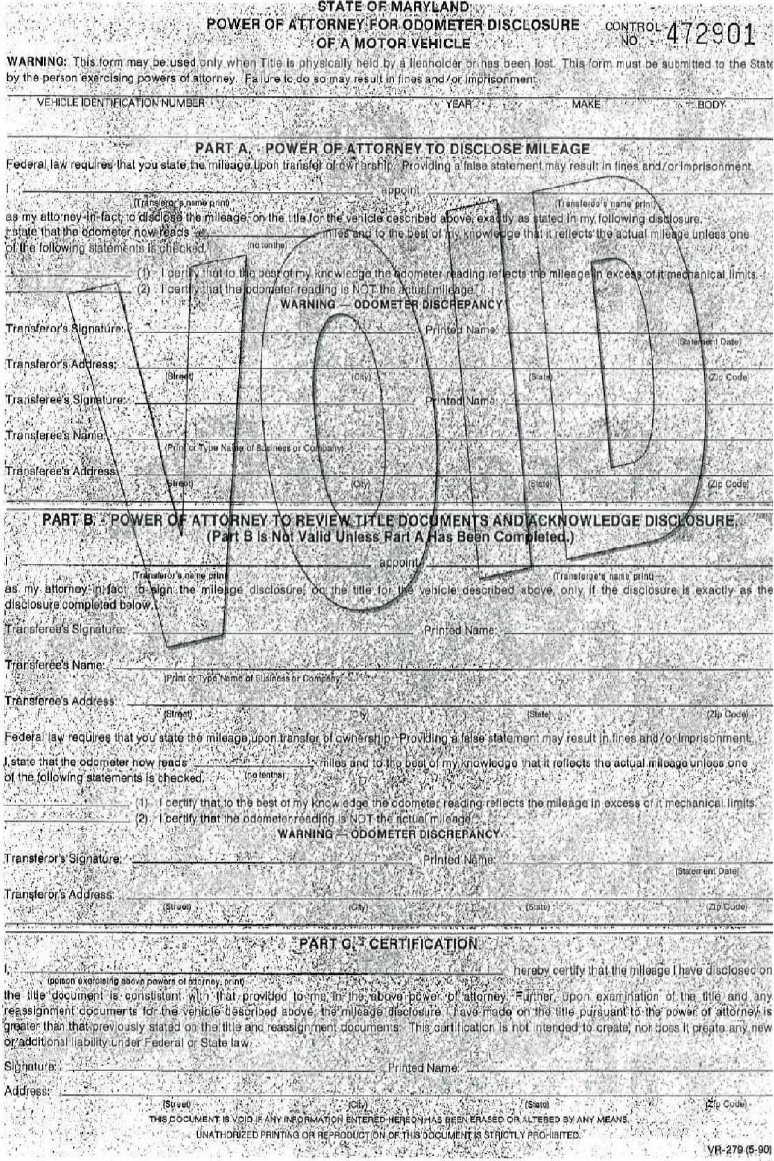
59

60
MARYLAND CLEAN CARS ACT 2007
Maryland Clean Cars Act of 2007 SB-103 Effective June 1, 2007
*All vehicles starting with model year 2011, must comply with California’s strict emissions standard. (CAL
LEV)
*This Bill does not affect vehicles with model year 2010 and older.
*The Maryland title will indicate the 2011 + year vehicle meets the emissions standard for this state.
*Vehicles starting with model year 2011 that do not meet the Maryland Clean Cars Act of 2007 cannot be
titled in Maryland (see exemptions specifically noted below).
*Many of the vehicles titled today are CAL LEV compliant.
*The Bill was passed in 2007 requiring vehicles with a model year of 2011 and beyond to be CAL LEV
compliant. This was to give the Manufactures three years to become compliant as required by Federal
Regulations.
*The Motor Vehicle Administrations titling screens have been modified to require operators to enter a Y
to reflect that the vehicle is CAL LEV compliant. This will allow the CAL LEV brand to print on the title
certificate for future use.
Sample wording for CAL LEV, which appears on the front of the Certificate of Origin:
*This vehicle is certified for sale in all 50 states.
*This vehicle conforms with applicable U.S. Federal Safety bumper and theft protection and with the
applicable U.S. Federal and California emission requirements.
*This vehicle certified according to Federal EPA and California ARB emission requirements for sale in
any state within the U.S.
CAL LEV EXEMPTIONS
The following exemptions were identified in the Maryland Department of Environment COMAR
regulations:
•
Transferred by inheritance
•
Transferred by divorce, dissolution, or legal separation.
•
Previously registered where mileage exceeds 7,500 miles,
•
Purchased by a nonresident prior to moving to Maryland
•
A Vehicle sold for the purpose of being wrecked or dismantled.
•
A vehicle sold directly from one licensed dealer to another licensed dealer.
•
A vehicle sold for registration out-of-state
•
A vehicle sold for off-highway use
•
A vehicle of a rental agency in Maryland as a result of a rental initiated in a state other than
Maryland.
•
An emergency vehicle
•
A military tactical vehicle
•
A vehicle exempted by California Health and Safety Code §43656
•
A vehicle replacement vehicle acquired by a resident of Maryland out of State
•
A vehicle designated as exempt by the Administration
This law is applicable to vehicles of the 2011 model year and each model year thereafter for passenger
cars, light-duty trucks, and medium-duty vehicles. Includes Medium duty vehicles with gross vehicle
weight rating of 14, 000 pounds or less.

61
MARYLAND CLEAN CARS ACT 2022-2023
House Bill 1391 Clean Cars Act of 2022
This bill was for the purpose of establishing the medium and heavy duty zero emission vehicle grant
program for certain vehicles during fiscal years 2024-2027 and equipment to be administered the
Maryland Energy Administration for certain fiscal years, the vehicle excise tax credit for the purchase of
certain vehicles; decreasing for the purposes of the electric vehicle tax credit, the limitation on the
maximum base purchase prices of certain electric vehicles; reducing the vehicle excise tax credit for
certain electric drive vehicles; requiring, for certain fiscal years
The requirements:
• the base purchase price should not exceed $50k,
• the battery capacity needs to be at lease 5.0 Kilowatt hours,
• the vehicle would have to be titled as new on or after 7/1/23 but before 2027,
• zero emission plug in and
• only one vehicle per individual and
• 10 vehicles per business entity is allowed to receive the credit.
• A person may claim an excise tax credit equal to
o (1) $3,000 for each zero-emission plug-in electric drive or fuel cell electric
vehicle purchased; or
o (2) $2,000 for each three-wheeled zero-emission electric motorcycle or
autocycle purchased; or
o (3) $1,000 for each two-wheeled zero-emission electric motorcycle
purchased.
The issuance of the tax credit is subject to available funding.

62
The Law
TRUTH IN MILEAGE ACT OF 1986
Congress enacted the federal odometer law in 1972 to prohibit tampering with odometers and to establish
safeguards for the protection of consumers. In 1976, the law was amended to strengthen the enforcement
provisions. In 1986, the Truth in Mileage Act of 1986 was enacted to enhance the paper trail of odometer
readings. The Truth in Mileage Act also doubled the civil penalties to $2,000 and made knowing and willful
violations a felony. In 1988 the Pipeline Safety Reauthorization Act amended the odometer law to permit the
use of a secure power of attorney in connection with the mileage disclosure. The laws and amendments are
codified and can be found in Title IV of the Motor Vehicle Information and Cost Savings Act, 15 U.S.C.
Sections 1981 – 1991.
The National Highway Traffic Safety Administration (NHTSA) was charged with the
responsibility of implementing the provisions of the law. The final rulemaking was advertised
in the Federal Register on August 30, 1989.
Unlawful Acts
The Act makes it unlawful for any person:
1)
To advertise for sale, to sell, to use, or to install or to have installed, any device
which causes an odometer to register an inaccurate mileage;
2)
To disconnect an odometer;
3)
To reset or alter the odometer of any motor vehicle with intent to change the
mileage;
4)
To drive, with fraudulent intent, a motor vehicle with a disconnected or
nonfunctional odometer;
5)
To conspire with any other person to violate the provisions of the Act;
6)
To fail to issue a disclosure statement or to issue a false statement; and
7)
If a dealer or distributor, to fail to receive a complete mileage disclosure
statement.
REMEDIES
Private Civil Actions – Anyone violating any requirement “with intent to defraud” is liable for three
times actual damages or $1500, whichever is greater, plus costs and attorney fees. This action
may be brought by an attorney in a State or Federal court within two years from the date on
which liability arises.
Injunctive Relief – The United States Attorney General may bring an action to restrain violations
of the Act.
State Enforcement – The chief law enforcement officer in a State (usually the Attorney General)
may bring an action to restrain violations or to recover amounts for aggrieved consumers.
Civil Penalty – The Secretary of the Department of Transportation has the authority to assess
civil penalties which are collectable in a civil action brought by the United States Attorney
General. Any person who violates any provision of the Federal law is subject to a civil penalty
not to exceed $2,000 for each violation, with a maximum penalty of $100,000.
Criminal Penalty – The criminal penalty, subjects a person, including an individual director,
officer or agent of a corporation, to a fine of not more than $50,000 or to imprisonment for
not more than three years, or both, for knowingly and willfully committing any of the
unlawful acts.
The American Association of Motor Vehicle Administrators created a Task Force to analyze the
final rule and develop guidelines for the states to follow in implementing the law.

63
The Task Force reduced the pertinent issues regarding the act to six.
•
Power of Attorney
•
Secure documents
•
Non-conforming Documents
•
Reassignment/Disclosure Language
•
Involuntary Divestiture
•
Odometer/Mileage Reading Brands
POWER OF ATTORNEY
•
The Final Rule prohibits the use of a Power of Attorney in any situation where the
transferor (seller) and the transferee (buyer) are the same person or agents of the same
person or corporation.
•
The Pipeline Safety Reauthorization Act of 1988 allows for the use of a Power of
Attorney when the transferor and the transferee are the same person, or an agent of
the same person or corporation and the title is in the possession of a lien holder.
•
Legitimate uses of a Power of Attorney will continue to be recognized by NHTSA. Such
uses include but are not limited to estate administrators or personal representatives,
lessor/lessee dealings and most situations where an owner or joint owner is unavailable.
PIPELINE SAFETY REAUTHORIZATION ACT OF 1988
•
Requires each jurisdiction to issue Power of Attorney forms by means of a secure
printing process.
•
Requires that the original form be returned to the jurisdiction by the person who was
granted the Power of Attorney and a copy be retained by that person, firm or
corporation.
•
Requires the Power of Attorney form to have a certified odometer disclosure statement
with a signature line for both the person granted the Power of Attorney and the
transferee. NHTSA requires certification that the title is, in fact, in the possession of a
secured party.
•
The use of the Power of Attorney is voluntary on the part of the customer. They are under
no obligation to sign a Power of Attorney and if they elect to return to the dealership after
they receive the title, the dealer must comply.
POWER OF ATTORNEY FORM
Three Part Form:
•
Part A Mileage Disclosure
•
Part B Is used to show that the party granted the Power of Attorney has
reviewed the title document and acknowledge disclosure.
•
Part C Is a certification to all information appearing on the Power of
Attorney Form and that there are no indications of mileage discrepancies.
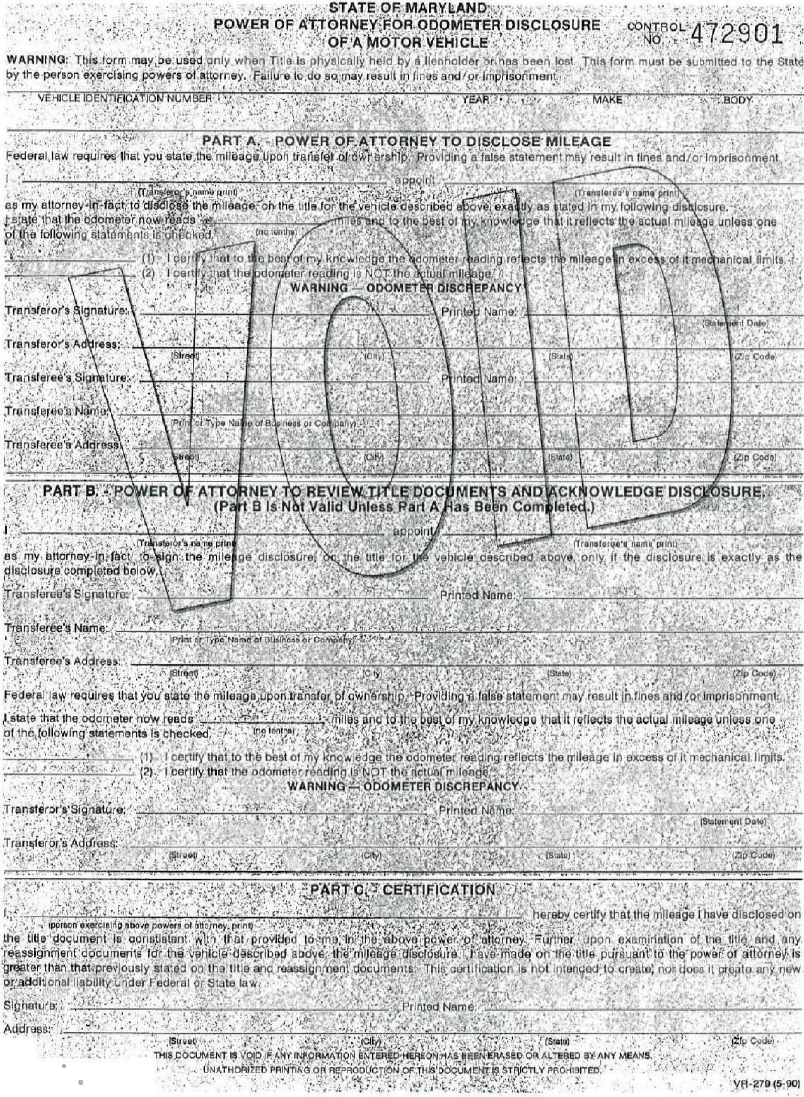
64
.:...;.·
1·, '
...........
i:;·\
.
··:
65
SECURE DOCUMENTS
The certificate of title and any documents used to reassign the title shall be set forth by a secure
process; however, the assignment documents do not need to be set forth by the same secure
process as the title certificate.
AAMVA is recommending as a minimum:
•
Pantograph Void Feature
•
Erasure Sensitive Background Inks
•
Security paper
These features will deter or detect counterfeiting and will allow alterations to be visible to the
naked eye.
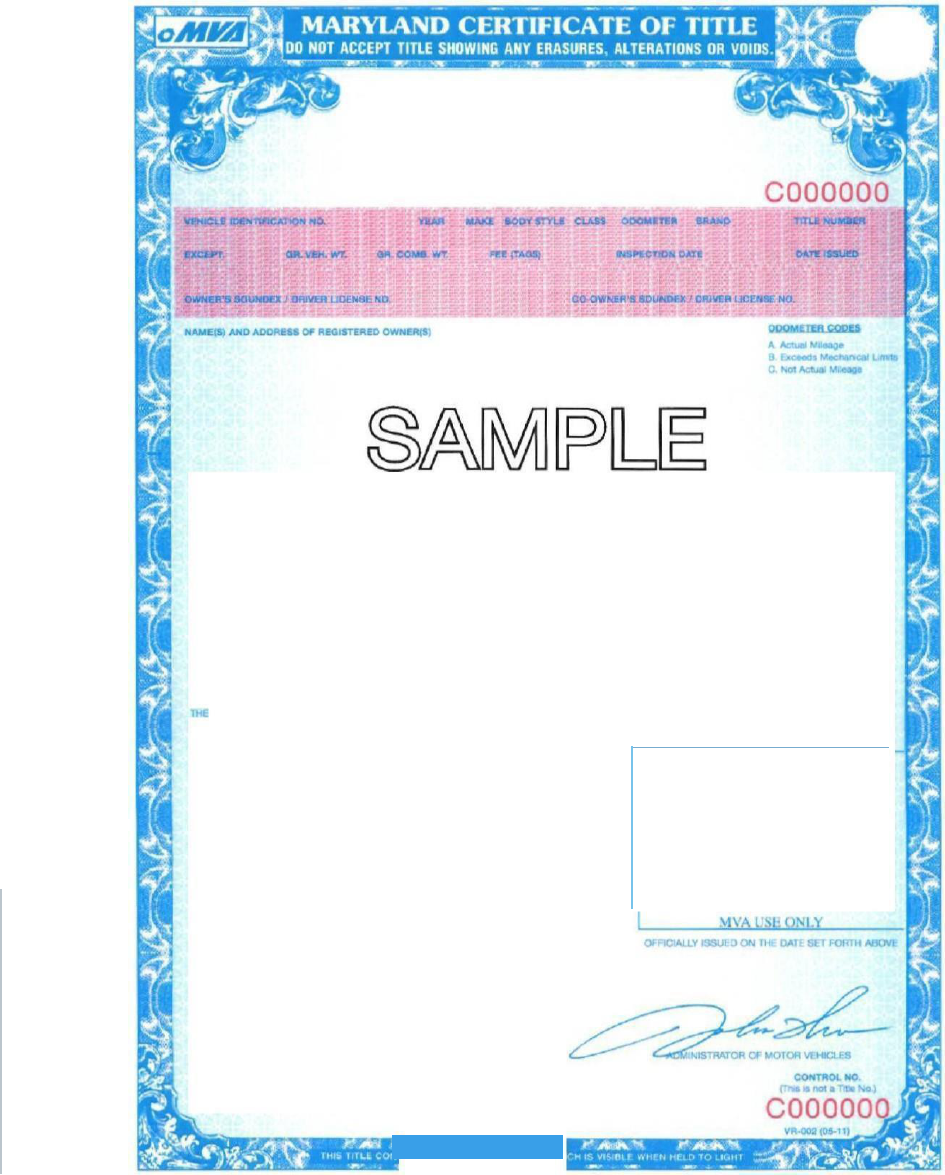
66
CERTIFICATE OF TITLE (Front)
0
0
0
0
0
0
0
0
0
0
0
0
0
0
0
0
0
0
0
0
0
0
0
0
t.S1'11:1.4WFU.
0>\llomor
SAID
VO«ll.
IDM>< 1JWD. MJ.'lOT llEFOR FAI.S£ORFlWJDI.UN OOOMDU!Sl Jtld(N""S MADEr<THE
ClFlll1£
OR
FOil
[MOllS
UA::IERI:OClROI'IQIJV
T
HE
A.'lMI"
NAMr AND
or&aJAill
PNrEB"'
R£CORDEl)
Qfall
PURSIJNIT
TOM
PR0\1SIO!I!
OfThe
loiC"OR
'IOilCLL
u.t.'S
Of
111311
AI
AAO
API'UCANT
"Wooo
CJt,
TlE
Fila
HEAD!'
>WI
BUN
llULY
MCORD ID
CONntOI. HO.
co
(N
o
alo.
o
.,. a
o
'l'
o
N
o
o.I
fttEtJM)[RS10f. 0 K 'r aJmFYlWJ N< AI'PIJC,&l10N FOAC£RTifiC,IT'E ormu AS B \ MA:lE f0f1M votelf OCSCRI! OHrllEON
A:lQ._. :flOf n£.ce!liFICIJl
Llli.'l
ltl:.LI :ASI
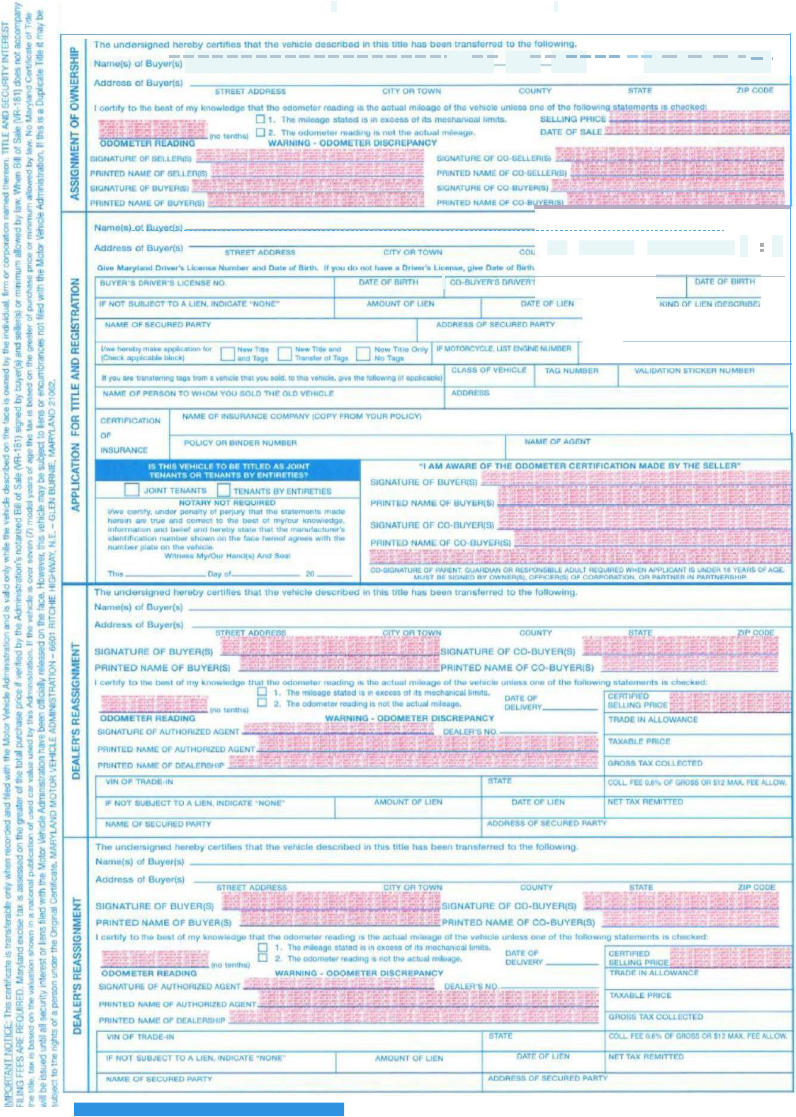
67
0
0
0
0
0
0
0
0
0
0
0
0
0
0
0
0
0
0
0
0
0
0
0
0
F
•l
"'*
•
n d St•t•t.tw ""'·lhotly uu at..I•
the
1n
coor..ch<lfl 'frtrtt\ thll1f&n•l« of o wners hrp F•rlu,. to c;.omp..te or provtc;r ng a fAiN
ltote"*'t
tnly
In trnat anGior 1mpru10nmont
N..,n¥til.)
u1Bu)'iff{")
-
-
l
Adclteu01BuyefiSI---:.;:;,.=rrr=""•.
o
.=
=.
:-
.
:--- ----;:C::;ITY=OO::cT;:OWN=------:::C:OOO.=::TY:-- ----
:
IIT:::A::"Tt
---------------
T
:
I:-P=00 .0<-=
NAem·
·
1
IMJ VII'IID. 'U¥(1 '11 . C II NO
I
OATt
Of
IIIR'Tlt
J
co-
8
M Mft-& UCf' k SC NO
,.riN •
I
F 1\/fRA CTOfV TfW LfR. IJIT W £0 -tl
"'"'"'
acw
ANY ALTERATION OR ERASURE VOI S THIS TITLE.
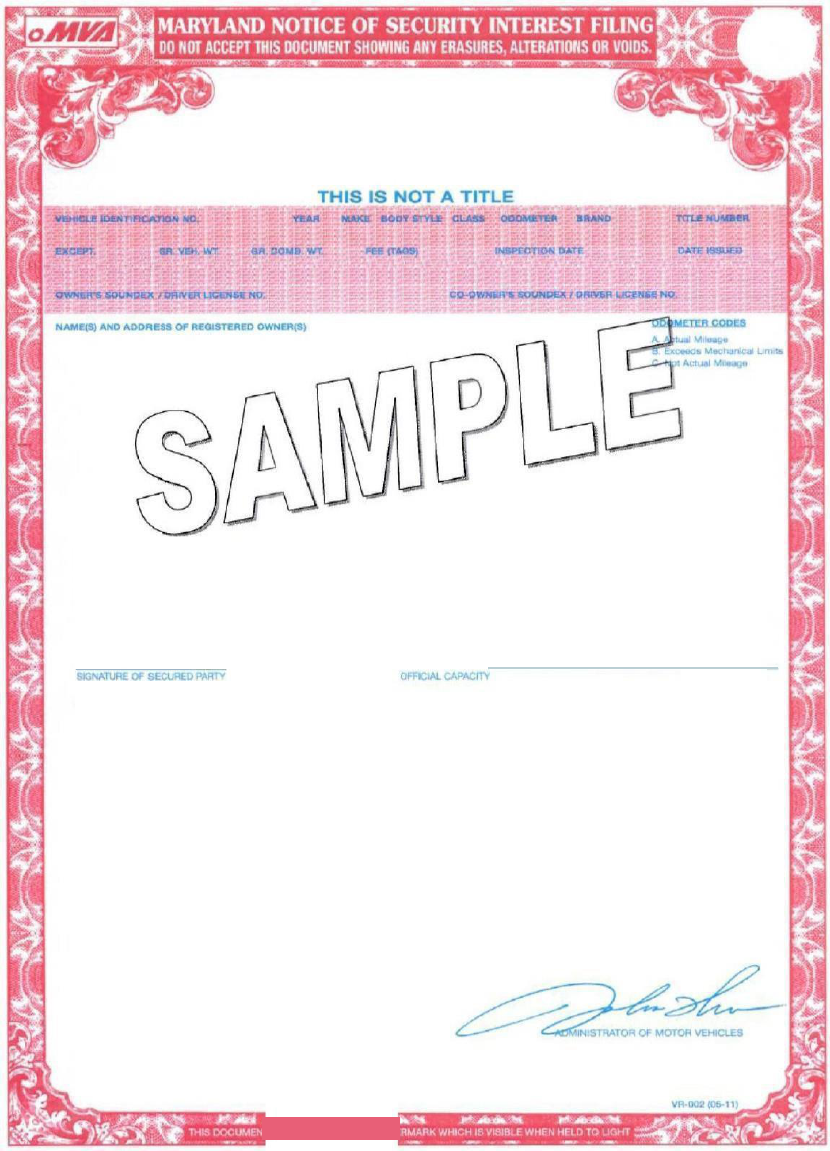
68
NOTICE OF SECURITY INTEREST FILING (Front)
0
0
0
0
0
0
0
0
0
0
0
0
0
0
0
0
0
0
0
0
0
0
0
0
THS ISTOCERTlF\' '\lWSfC(Jil!YINTtR!S' .AS IIE£N0\li.Y l'll£D ">iE TOR\'O<ICL£ AOWIN STRAT!O'< 'IhE """'EOFTl£ &EClJR..CJl
PNfTY IIUOW ON TH( 1/LHiClE oes::Rilro
TERMINA"'"ION
STATEMENT
l
Tl£ l..'NOfASlO>r.:
OC HEI'E3Y
RB.V.SI!
Ao.l
:IGHTII
Mo:>
!NTBIEST$1N
TH!! VEHIClE
OESCRIBCASCY!.
OATEOFF.a.EASE
I'IAM(JN<O
00OFIIECURt:OPIIRTIL&
OFFICIALLY ISIIU£0 ON TME DATE 11ET FORTh
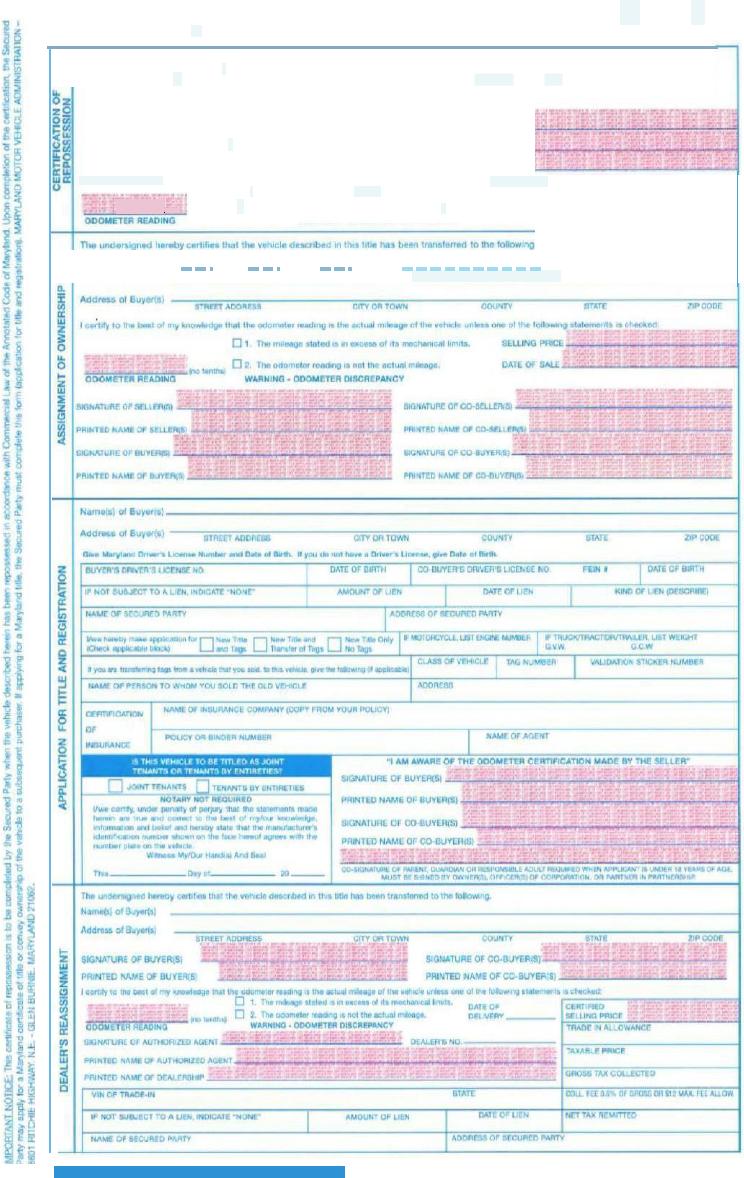
69
r
.JaNJ StAt• '*•
that
.ate
tht
mi4Nge
1n
connectiOn
With
the'
01
Oww"nerth
F-..10
eornpllftor
viC
ng •
tMe L tem.nt
••I'
0
...,."'tlnel
.,d/01'.mpneormern.
0
0
0
0
0
0
0
0
0
0
0
0
0
0
0
0
0
0
0
0
0
0
0
ANY ALTERATIONOR ERASURE VOIOSTHIS DOCUMENT.
To
be
i.tl8d
bJ
MCu .,.,..,.
(l.tan HoiOfllt
rwt I)CJ
on INlac-.eklr IIICII'ltiQ acenrhe8te
ot
tJtle
Ot
Jr.
CIDr1'I"'yM'te:l
ofor..
Yahec..IOIIUblh'"'="''ill*,
l/W11.
U..
....
Jcbt:or
..
,
..._I
hGrwbyo
;ertty,
lr.hlf
penally uf
J,Arfl")',
ll\llt
U..
M\Jtot \1
.....
it*
on
II•
tee.
hal
bwl
oJ
rnlllll IN obigabof inthol MtUetNnt of ttw Nn n:tated 01'1 the Jaee ot fNI tnrm T1111'1 contr.ct
cOOtetn;
W.veh!C•
'h4t _,
Ulc '#lfth
lf!ICIIIIIIOf
the
il'll edCOO.ot
.,_yi.wld
1/Weeho..,.,...trtM lQhwhieMtehJsclt:.d
and
•
..,..10
ct.f..-
..::
1
It
...
. .
Tlw
.,.,.,
y,
Jewt•f'ykltt.bMICJt ol"J IOw
...ht'*- JMdinuteh.,;t
afii!W.....
Dtleollflofofto
........
WIIte:'ftCJ'Il.S•tf'1CII:.kOd
0
I TN
II'IIM;t•.,_
lllo::MI; 01 ISINICNI1iCW
liMi
•
•
r ,_
111f011
0
2 TN odoCMW
rN:f
ng
e
I'ICit
tte
KCUII
filii .
OOOMnPI' RIAOtNG
WAAH HO •DIICR[,AHCY
.omo(l/
........
,..
,1)
-
-
-

70
NON-CONFORMING
DO CUMENTS
After April 29, 1989, all jurisdictions were required to accept the new odometer disclosure
form. Inasmuch as most jurisdictions’ titles did not contain the new odometer statement, a
separate disclosure document was developed. This document is presently being used
whenever a non-conforming certificate of title is issued to transfer ownership of a vehicle.
A non-conforming title need only be accompanied by a separate conforming odometer
disclosure document when the vehicle is sold to the retail purchaser. NHTSA will verify that
odometer disclosure statements were furnished between dealers through audits of dealer
records. This document does not need to be printed by any secure process.
A separate odometer disclosure is not required when transferring new vehicles between
dealers.
When the new vehicle is sold retail, a separate conforming odometer disclosure
statement must accompany any non-conforming certificate of origin.
Most states requested and received an extension beyond the April, 1989 implementation
date. Maryland was granted an extension for implementation until April, 1991.
REASSIGNMENT /
DISCLOSURE
LANGUAGE
The final rule gives very clear direction on language regarding reassignments and
disclosures and NHTSA requires jurisdictions to issue title documents with this new
disclosure language.
The following information must be contained in each assignment on the back of the title.
1. Current odometer reading (no tenths).
2. An indication whether the odometer reading reflects ACTUAL MILEAGE or is
NOT ACTUAL MILEAGE, or that the ACTUAL MILEAGE IS IN
EXCESS OF MECHANICAL LIMITS OF THE ODOMETER.
3. The signature and printed name of the seller.
4. The signature and printed name of the buyer.
The statement regarding the federal mileage disclosure law need only be included at the
top of the first assignment area and the address of the seller must appear somewhere
on the document. The printed name of the seller and buyer shall reflect the name of the
person signing, not just the company or corporate name.
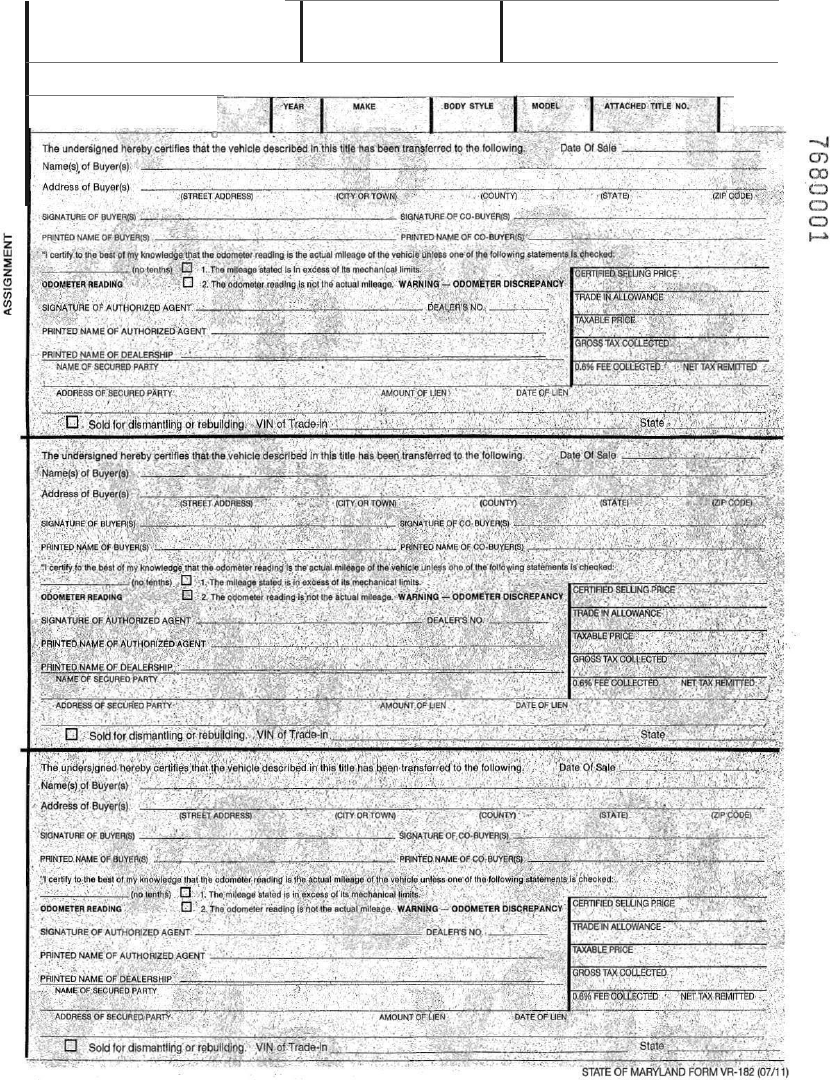
71
THIS DOCUMENTIS VOIDIf ANY INFORMATION
THIS FORM IS TO BE USED BY UCEHSEDDEALER
ENTERED HEREON HAS
BEEN ERASED OR
ALTERED
BY ANY MEANS. UNAUTHORIZED PRINTING OR
REPRODUCTOI N OF THIS DOCUMENT IS STRICTLY
PROHIBITED.
FOR THE PURPOSE OF RE·ASStGNMENT OF A VEHICLE.
NEW
AND
USED
VEHICLES
THE PROPERLY ASSIGNED OWNERSHIP DOCUMENTS
MUST ACCOMPANY THIS FORM.
SEE REVERSE SIDEFORIMPORTANTINSTRUCTIONS
DESCRIPTION OF VEHICLE (Certlflcale of ownership, properly aulgned,muot accompany thla form)
VEHIC(I rDEHTlFICAlljJH NO
. .
'
.
TATE
AND/OR
RE- ASSIGNMENT
F OR
DEALER'S
BILL
OF
SALE
DEALER’S BILL OF SALE FORM AND/OR RE-ASSIGNMENT FOR NEW & USED VEHICLES
Federal and State law requires that you state the mileage In connection with the transfer of ownership. Failure to complete or providing a false statement may result in
fines and/or Imprisonment.
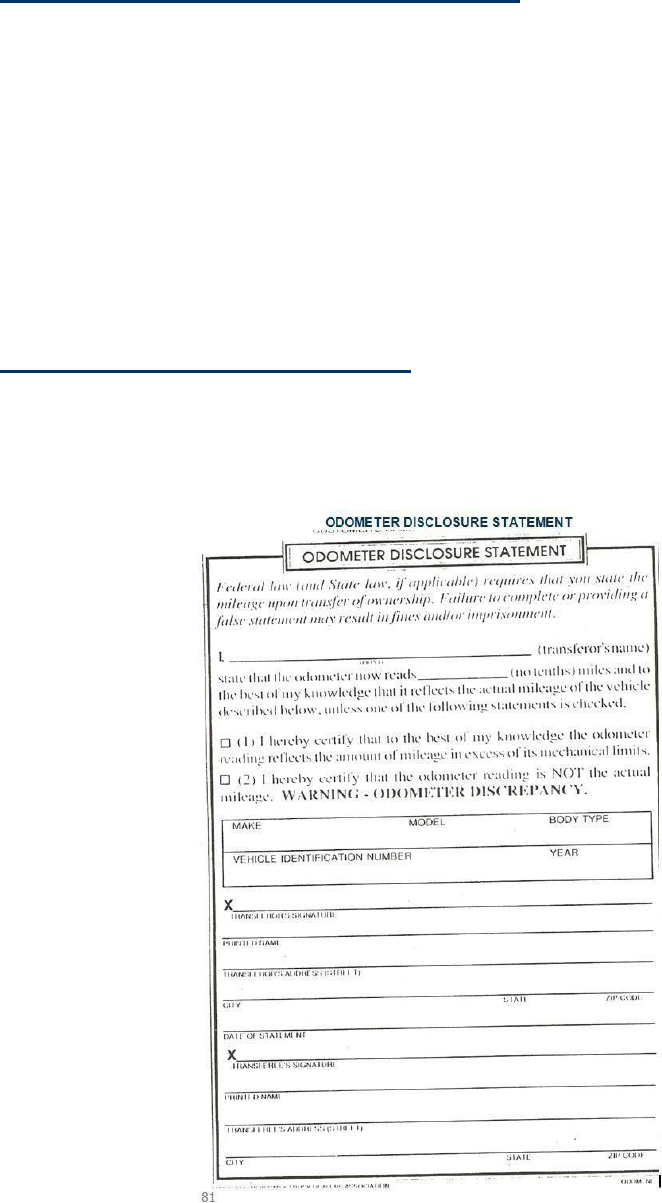
72
Exceptions to odometer disclosure requirements: The following is a list of
exceptions from the odometer disclosure requirement:
1)
Dealer transfers prior to the first sale.
2)
Vehicles with GVWR above 16,000 pounds.
3)
Vehicles not self-propelled.
4)
Government vehicles,
5)
Vehicles 10 years old or older.
Five year statement retention required: The new regulations require dealers to retain
the odometer disclosure statements for five years and you must have a retrieval system
in place.
73
INVOLUNTARY DIVESTITURE
(NON-OWNER INVOLVEMENT)
There are many reasons for ownership of a vehicle to change without owner involvement.
Reasons include, but are not limited to court order, mechanic’s/storage lien, repossession,
police sale or probation of an estate.
Where an involuntary transfer occurs, an odometer disclosure statement is required if
the transferee and transferor are not the same person. An odometer disclosure from
the previous owner is not required; however, the current odometer reading must be
noted on both the application for title or a separate disclosure form. The applicant
makes the disclosure.
ODOMETER/ MILEAGE READING BRANDS
It is important to recognize the difference between odometer reading and vehicle mileage. The Final
Rule defines mileage as “…actual distance that a vehicle has traveled.” Because odometer readings
and mileage can be different, it is necessary to brand odometer readings.
Because there is a lack of common definitions of brands, NHTSA created a national definition of these
brands.
•
ACTU AL MILEAGE
•
NOT ACTUAL MILEAGE
•
EXCEEDS THE MECHANICAL LIMITS
EXEMPTIONS
•
Motor vehicles 10 model years old or older.
•
Vehicles having a gross vehicle weight rating of more than 16,000 pounds.
•
Vehicles that are not self-propelled.
•
A new vehicle prior to its first transfer for purposes other than resale.
•
A vehicle sold directly by the manufacturer to any agency of the United States in conformity with
contractual specifications.
74
RECORD RETENTION ODOMETER
DISCLOSURE STATEMENT
Dealers and distributors who are required to execute an odometer disclosure statement
shall retain for (5) five years a copy of each odometer disclosure statement which they issue
and receive.
The records shall be maintained at their primary place of business.
Lessors shall retain for five years following the date they transferred ownership of the leased vehicle
each odometer disclosure statement they received from a lessee.
The record shall be maintained at their primary place of business.
Each auction company shall retain for five years following the date of sale of each motor vehicle the
following records.
a)
The name of the most recent owner (other than the auction company;
b)
The name of the buyer;
c)
The vehicle identification number; and
d)
The odometer reading on the date which the auction company took possession
of the motor vehicle.
The record shall be maintained at their primary place of business.
POWEROF ATTORNEY
Dealers and distributors who are granted a power of attorney shall retain a copy for five years at their
primary place of business.
LEASED VEHICLES
Each lessor of a leased motor vehicle shall notify the lessee in writing that the lessee is required to provide
a written disclosure to the lessor regarding the mileage. This notice shall contain a reference to the federal
law.
The lessee shall furnish to the lessor a written statement regarding the mileage of the vehicle. This
statement must be signed by the lessee and shall contain the following information:
1)
The printed name of the person making the disclosure;
2)
The current odometer reading (not to include tenths of miles);
3)
The date of the statement;
4)
The lessee’s name and current address;
5)
The lessor’s name and current address;
6)
The identity of the vehicle, including its make, model, year and body type, and its
vehicle identification number;
7)
The date that the lessor notified the lessee of disclosure requirements;
8)
The date that the completed disclosure statement was received by the lessor; and
9)
The signature of the lessor.

75
The lessee shall certify that to the best of his knowledge the odometer reading reflects the actual
mileage; or
If the lessee knows that the odometer reading reflects the amount of mileage in the excess of the
designed mechanical odometer limit, he shall include a statement to that effect; or
If the lessee knows that the odometer reading differs from the mileage and that the difference is greater
than that caused by odometer calibration error, he shall include a statement that the odometer reading is
not the actual mileage and should not be relied upon.
If the lessor transfers the leased vehicle without obtaining possession of it, the lessor may indicate on
the title the mileage disclosed by the lessee unless the lessor has reason to believe that the disclosure by
the lessee does not reflect the actual mileage of the vehicle.
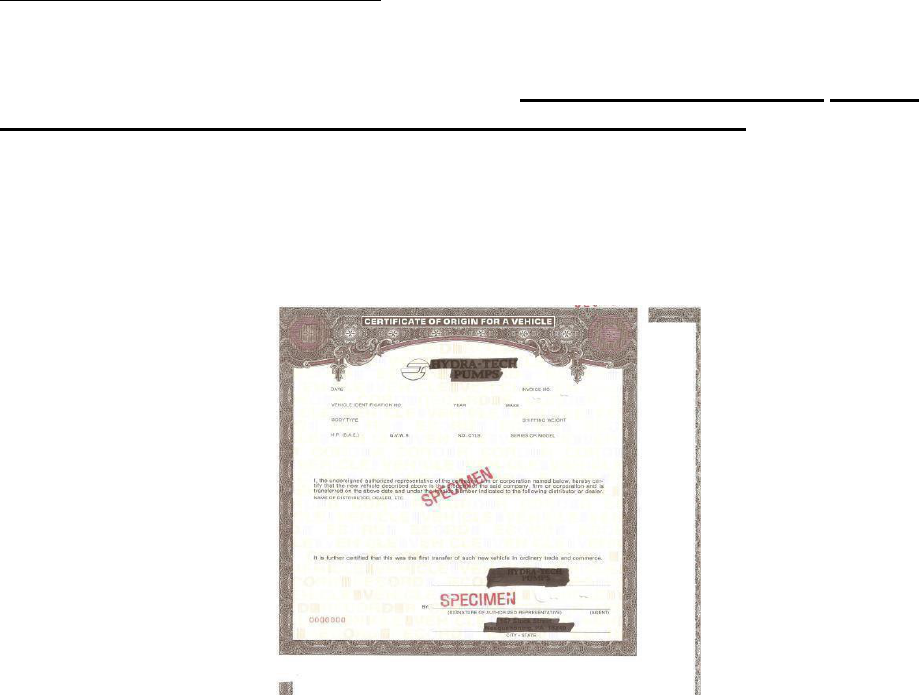
76
CERTIFICATE OF ORIGIN?
What is a Certificate of Origin?
The Certificate of Origin is the ownership document for a “new” vehicle and must accompany the title
application when submitted to the MVA. It is defined in law as follows:
§ 13-101. "Certificate of origin" defined.
In this subtitle, "certificate of origin" means a certification by the manufacturer, on a form that the
Administration approves, that:
(1)
Certifies that the vehicle described in it has been transferred to the dealer or other person named and
that the transfer is the first transfer of the vehicle in ordinary trade and commerce; and
(2)
Describes the vehicle by including:
(i)
It’s make, model, year, vehicle identification number, type of body, number of cylinders, and
engine number; and
(ii)
Any other information that the Administration requires.
[An. Code 1957, art. 661/2, § 1-147; 1977, ch. 14, § 2.]
What information is contained on the front of the
Certificate of Origin?
FRONT OF THE CERTIFICATEOF ORIGIN
The “top portion of the front” of the Certificate of Origin provides the description of the vehicle including the
vehicle identification number, year, make, shipping weight, H.P.
(S.A. E.), GVWR, number of cylinders, and series or model. This is the source document that provides
the vehicle information that you will enteron the application for certificate of title.
The “middle portion of the front” of the Certificate of Origin shows the first assignment by the manufacturer
to a licensed distributor or dealer.
The “lower portion of the front” of the Certificate of Origin contains the manufacturer’s name and address
and also contains a space for the signature of the manufacturer’s agent.
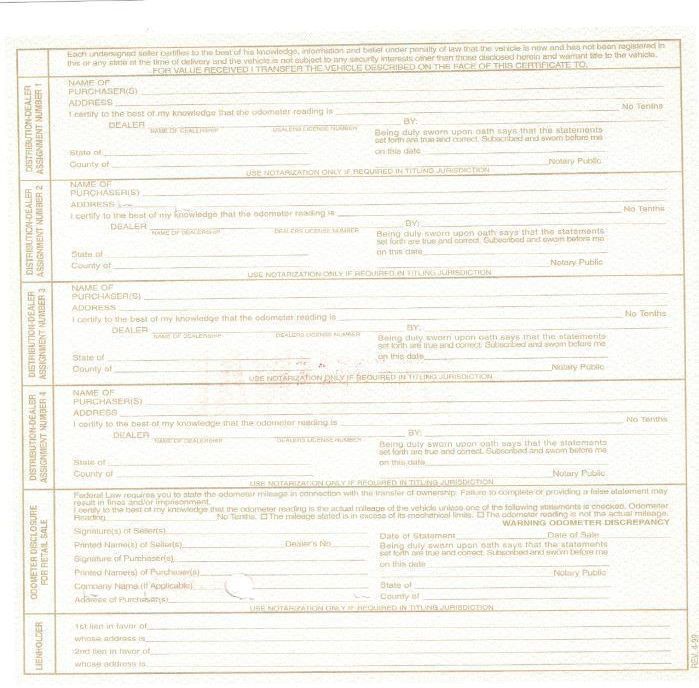
77
REVERSE OF THE CERTIFICATE OF ORIGIN
The reverse of the Certificate of Origin contains dealer/distributor reassignments where a licensed dealer
may assign ownership of vehicles for which they have a franchise to sell. The reassignment area must be
completed in full including name of purchaser, address, odometer reading (including designation as to
actual mileage, not actual mileage, or exceeds mechanical limits), dealer number, and signature of the
dealer. There must be a complete sequence of ownership from the manufacturer to the dealer(s), to the
retail buyer of the vehicle. For dealer-to-dealer transfers, the odometer reading is to be stated within each
dealer reassignment, but once the ownership transfers to the retail buyer, the federally conforming
odometer disclosure statement on the bottom of the certificate of origin needs to be completed; otherwise,
a separate odometer disclosure statement needs to accompany the Certificate of Origin that has been
completed and signed by the dealer and the retail buyer. There is also a space to provide lien information if
applicable. If there is no lien, enter “NONE” in the space for lien holder’s name.

78
COMAR’s Requirement for a Uniform Certificate of Origin
Code of
Maryland
Regulation
11.15.25
Isa follows:
Certificate of Origin
Authority: Transportation Article, §§12-104(b), 13-101, and 13-104.1(1), Annotated Code of Maryland
.01
Definition.
In this chapter, "certificate of origin" has the meaning stated in Transportation Article, §13-101, Annotated
Code of Maryland
.02
Uniform Manufacturer's Certificate of Origin.
A.
The Manufacturer's Certificate of Origin for a new motor vehicle shall have the security features and be
in the form recommended by the American Association of Motor Vehicle Administrators.
B.
A distributor of motor vehicles, licensed under Transportation Article, Title 15, Annotated Code of
Maryland, may issue the uniform certificate of origin on behalf of the manufacturer of a new motor vehicle.
C.
The Manufacturer’s Certificate of Origin for trailers, with a gross vehicle weight of 3,000 pounds or less,
may be exempt from the security features required in §A of this regulation.
.03
Return of Certificate of Origin.
The Administration may not return a certificate of origin unless the certificate of origin accompanies an
application for title reflecting a vehicle different than the vehicle actually sold.
Effective date: November 8, 1993 (20:22 Md. R. 1708)
Chapter revised effective October 15, 2012
(39:20 Md. R. 1307)
What is meant by the term “Uniform Certificate of Origin”
The American Association of Motor Vehicle Administrators (AAMVA) has approved security specifications for
the paper, which is used for the ownership documents. The approved security revisions for the Certificate of
Origin (C/O’s) are consistent with AAMVA’s specifications recommended for the paper used for the vehicle
titles in the various jurisdictions.
The American Association of Motor Vehicle Administrators has set forth the standards for Certificates of
Origin.
Certificates conforming to all AAMVA standards may be ordered from the following AAMVA associate
members:
•
De La Rue Security Printing
703-450-1300ext. 2265 or 571-224-0185
•
American Banknote
615- 261-0610
Please note: There are other secure printing companies that issue Certificates of Origin that contain all
features that are required by AAMVA as well.
All “Certificates of Origin” should contain the following nine (9) features:
(1)
Paper
a.
Sensitized Security paper – paper that is reactive to chemicals commonly used to alter
documents.
b.
Non-Optical Brightener Paper – paper without added optical brighteners, which
will not fluoresce under ultraviolet light.

79
(2)
Engraved border – a border produced from engraved art work which shall appear on the front of the
document.
(3)
a. Prismatic – rainbow printing which is used as a deterrent to color copying, and/or
b. Copy void Pantograph – the word “void” appears when the document is copied.
(4)
Complex Colors – colors which are developed by using a mixture of two or more of the primary colors
(red, yellow, or blue) and black if required.
(5)
Erasable Fluorescent Background Inks – fluoresces under ultraviolet light and reacts to any
attempt to erase in such a manner as to be immediately
detectable.
(6)
Background Security Design – a repetitious design consisting of a pattern which hinders
counterfeiting efforts.
(7)
Microline – a line of small alpha characters in capital letters which requires a magnifying glass
to read.
(8)
Consecutively numbered – documents that contain a number which is consecutively
numbered for control purposes
(9)
a. Security Thread – with or without watermark, and/or
b. Intaglio Print – with or without latent image.
DOCUMENT SIZE – “Certificate of Origin” size specifications shall be seven(7) inches by eight (8) inches.
PAPER STOCK- Sixty (60) pound offset or equivalent durability CONSTRUCTION – Unless
otherwise specified by the user, the forms should be
constructed and fan–folded for use on high-speed pin-fed computer printer and/or
continuous typewriters.
LAYOUT – Text matter space for 1/10 inch horizontal and 1/6-inch-deep characters per AAMVA H-12 Policy
for standard format.
FACILITY SECURITY – To ensure the integrity of the manufacturers “Certificate of Origin”, the user should
require the vendor to maintain secure printing and storage facilities.

80
MARYLAND CERTIFICATE OF
TITLE
What information is contained on the front of the MD
title?
The front of the Maryland title contains a complete description of the vehicle by year,
make and vehicle identification number, body style, odometer reading, brands, title
number, exception codes for special conditions (such as JT, TBE, number of axels,
number of passengers etc.), gross vehicle weight and gross combination weight, tag
fee, inspection date, date issued, and the owner and co-owner soundex. This critical
information is protected from alteration by a background of safety block microprint.
Directly below the safety block area on the left side is the name and address of the
vehicle owner. On the right side directly below the safety block printing are the odometer
codes and their meanings.
Below the owner’s name and address you may see additional branding information such
as “Rebuilt Salvage”, “Flood”, “Vehicle Returned-Automotive Warranty Enforcement Act-
History on File”, etc. If you see brands in this area, this indicates that there are
conditions in the vehicles past that may substantially reduce the vehicle’s value, and/or
safety.
The lower portion of the front of the title is used to record lien information. The
certificate of title is able to hold lien information for 4 lien holders. If there are more
than 4 liens, the title will contain the words “and more” on older titles. There is also
a box on the lower half of the title where MVA may stamp the title clear of liens if
provided with sufficient proof that the liens have been released. It is acceptable to
provide the proof of lien satisfaction with the title at time of ownership change, instead
of having the title stamped clear.
What information is on the reverse of the Maryland title?
The top section on the reverse of the Maryland title is the “Assignment of Ownership”. This
is the section where the owner(s) of the vehicle will complete an assignment, as required by
law, showing the name and address of the party or parties to whom they are transferring the
ownership of the vehicle. The odometer reading stated in accordance with all federal
requirements needs to be entered as well. For vehicles transferred to a dealer, the word
“RESALE” is usually entered for selling price. In other circumstances, the selling price,
GIFT etc., is entered. All federally conforming titles have both the printed name and
signature of the buyer(s) and seller(s).
The next section on the reverse of the Maryland title is an “Application for Certificate of
Title”. The customer purchasing the vehicle has the option of completing this section or

81
completing the Application for Certificate of Title (Form VR-005).
The next two sections on the reverse of the “Certificate of Title” are dealer
reassignments. Maryland dealers may use these reassignments or if the title has been
assigned to an out of state dealer, they may use these sections as well. The dealer
reassignments have a place for the dealer to assign ownership to another dealer, the
retail buyer, or any other transferee. There is also a federally conforming odometer
certification and spaces for the signature and printed name of the buyer(s) and seller(s).
There is a space for the certified selling price of the vehicle and space for Maryland
dealers to show trade in value and calculate the gross and net tax remitted. A space for
VIN and state of trade is provided on titling documents printed in 2009 or later. There is
a space for the dealer to provide lien information (if there is no lien, write “NONE”). Once
all reassignments are full on a title, a Maryland dealer may attach a separate dealer’s
reassignment or apply for a dealer resale title, excise tax exempt.

82
MARYLAND NOTICE OF SECURITY
INTEREST FILING (SIF)
What is the Maryland Notice of Security Interest Filing
(SIF)?
The State of Maryland is a two-part titled state. When a vehicle is titled, the Certificate of
Title is mailed to the owner of the vehicle. If the vehicle is subject to a lien, the second
part of the title called the Notice of Security Interest Filing (SIF) is mailed only to the first
lien holder, even though there may be second and additional lien holders recorded. The
Notice of Security Interest Filing contains the same information on the front that is
contained on the Certificate of Title. It has a similar appearance to the title but is a
different color. It also has a statement at the top saying “THIS IS NOT A TITLE”. The
reverse of the document contains a certification of repossession, assignment of
ownership, application for title and a dealer’s reassignment.
Please Note: Effective July 1, 2024, the MVA will no longer issue the paper SIF. If a
lienholder generates more than 50 years a year, they will be required to sign up with the
Electronic Lien Service. If a lienholder generates less than 50 years a year, a MVA
business portal account will be used to add and remove liens. There will be extenuating
circumstance where a paper SIF may be issued. (i.e., owner moves out of state and the
new state requires the SIF.)
What is the purpose of the Notice of Security Interest Filing?
The Notice of Security Interest Filing serves two purposes. It may be utilized as a lien
release, or in the case of repossession, it serves as an ownership document

83
How is the Notice of Security Interest Filing used as a lien
release?
When the lien is satisfied, the lien holder needs to sign in the place provided on the
front of the document, the lien holder is then required to mail or give the Notice of
Security Interest filing to the vehicle owner to keep with their title. The ownership of a
vehicle may not be transferred unless this document, accompanies the title. If the
owner chooses, they may submit the title and the properly released Notice of Security
Interest Filing to the MVA for a clear title for no additional charge.
If the Notice of Security Interest Filing has been lost, the lien holder may either (1)
apply for a duplicate by completing the Application for Duplicate Security Interest
Filing Form VR-048 for a $20.00 fee; or (2) prepare a letter on their original letterhead,
identifying, the vehicle by year, make and vehicle identification number also providing
the name(s) of the debtor(s), the amount and date of original lien, account number,
date of release, signature and capacity of the secured party releasing the lien, printed
name of the person releasing the lien, and the telephone number of the lien holder.
Note: All lien release letters must be accompanied by a copy of the photo identification
of the person presenting the lien release letter to the Motor Vehicle Administration.
How is the Notice of Security Interest Filing Used when a
Lien Holder “Repossess a Vehicle”?
The Notice of Security Interest Filing serves as an ownership document when a lien
holder repossesses the vehicle. To utilize the form for repossession, the lien holder
needs to complete the Certification of Repossession on the reverse of the document
including the odometer disclosure statement. The lien holder may then apply for a
“repossession title” by completing the application for title and submitting it to the
Motor Vehicle Administration with a fee of $100.00. The MVA also requires a
Condition Report as an additional source of odometer mileage verification. Note 1: If
the lien holder is anyone “other than” a bank, credit union, or finance company, a copy
of the lien contract must be provided for repossession. Note 2: This transaction is
excise tax exempt as long as the vehicle was titled in Maryland in the debtor’s name
and the lien holder is only applying for title in their name to transfer the vehicle to a new
owner.
If the lien holder does not wish to apply for a repossession title in their name, they may
use the SIF to assign ownership. In this case, the certification of repossession is
completed including the odometer disclosure, and the lien holder also completes
the assignment of ownership section on the reverse of the document. In this case
the SIF serves as the ownership document for the vehicle. A Condition Report is also

- 84 -
required as an additional source of odometer mileage verification. Note: If the lien
holder is anyone other than a bank, credit union, or finance company, a copy of
the lien contract must be provided for repossession.
MD DEALER
REASSIGNMENT
How do dealers obtain and use “Maryland Dealer
Reassignments”?
Dealer Bill of Sale and/or Reassignment for New and Used Vehicles (form VR-182) must
be purchased from the Maryland Automobile Dealers Association (MADA) or Maryland
Independent Automobile Dealers Association (MIADA). These forms will only be sold to
licensed Maryland dealers and will not be sold to out of state dealers. They are not
available from the Maryland Motor Vehicle Administration. The forms are blue in
color, are printed on secure paper and have a void pantograph security feature. This
form bears a control number.
Dealer reassignments are also located on the reverse of the Maryland title. When the
dealer reassignments on the back of the Maryland title (or out of state title) are full, a
Maryland dealer has the option of using a separate dealer's reassignment or applying
for a tax-exempt dealer resale title. Most dealers choose to use the dealer
reassignment. There is no limit to the number of dealer reassignments that can be
used with a title. As long as there is a complete sequence of ownership, and
appropriate forms from all states involved are attached, the transaction should be
acceptable. All documents must be completed in full, not altered and properly signed
by all required parties.
The dealer reassignments on the reverse of the Maryland title may be used by out of
state dealers as well. In 1991 when the MVA developed the title conforming to the
"Truth in Mileage Act of 1986" the wording "Maryland Dealer's Reassignment" was
replaced with "Dealer Reassignment". This was done specifically so that all dealers
could reassign on Maryland’s titles. Most states changed their titles so that our dealers
would be able to use the dealer reassignments on the title. However, on the separate

- 85 -
Maryland Dealer's Reassignment (VR-182), as long as a Maryland dealer reassigns on
the first reassignment, out of state dealers may reassign on subsequent reassignments.
MVA WILL REJECT any transaction if an out of state dealer completed the first
reassignment on the Maryland Dealer Reassignment (form VR-182).
OUT OF STATE TITLES
Out of State titles are quite different and need to be read carefully before being
assigned to your dealership, to ensure that they are properly completed. Some
have the assignment of ownership on the front; others have it on the reverse.
Some out of State titles only have a place for the owner to sign to release their
ownership of the vehicle; if there is no place to show who the buyer is, a separate
statement will be required showing that the owner assigned the vehicle to your
dealership.
Your dealer’s association will also be able to give you the names of several
reference manuals that will have instructions for each state, as well as examples of
the titles and other forms used by that state. These manuals will assist you at the
time of taking an out of State vehicle in trade, as well as give guidance on what
other states require when you are selling a vehicle to an out of State resident.
Helpful tip: For both out of State and Maryland titles, it may benefit your dealership
to have the vehicles title history searched through one of the companies that
specialized in online vehicle history.

- 86 -
LIEN RELEASE
Please Note: Effective July 1, 2024, the MVA will no longer issue the paper SIF. If a
lienholder generates more than 50 years a year, they will be required to sign up with the
Electronic Lien Service. If a lienholder generates less than 50 years a year, a MVA
business portal account will be used to add and remove liens. A lien release letter will be
accepted for liens placed before this date if unable to release the lien electronically.
The State of Maryland is a two-part title State. When a vehicle is titled in this State,
the title is mailed to the vehicle owner and a “Notice of Security Interest Filing (SIF)”
is mailed to the lien holder. Once the lien has been satisfied, the lien holder signs
off on the front of the SIF to release the lien and mails it to the vehicle owner or
if the lienholder is with a Electronic lien service vendor the lien will be released
electronically. The vehicle owner may keep the SIF with their title as proof that the
lien is paid, or they may submit the title and lien release to the Motor Vehicle
Administration to have a clear title issued at no charge. on the title or receive a
corrected title with the lien removed.
If the SIF has been lost, the lien holder may apply for a duplicate SIF by
completing form VR-048 at a cost of $20.00; or the lien holder may provide a
lien release on their original letterhead containing the following information:
•
Contact telephone number of the secured party
•
The name of the debtor
•
A description of the vehicle to include the year, make, and VIN
•
The date and amount of the original lien
•
The date lien was released the printed name, signature and
capacity of the secured party’s
representative a photocopy
must be made of the driver’s
license or state issued ID
of the person submitting the lien release letter.
•
NOTE: Only the first lien holder receives the Notice of Security
Interest Filing. Subsequent lien holders will need to use a letter as
described above to release their lien(s).
• NOTE: If a lien release letter is faxed directly from the lien holder to an
ERT dealer, the dealer may use that lien release to process the
transaction through the ERT network.

- 87 -
Electronic Lien Recording
IMPORTANT: The purpose of this notice is to advise lien holders and dealers who offer
the service of financing motor vehicles liens, and regularly engage in the business or
practice of financing motor vehicles, of changes in the law for submitting lien releases
electronically within the required time as specified in Maryland Vehicle Law 13-108.1.
Effective January 1, 2021, the law also went into effect requiring all liens to
be “recorded electronically”. Most liens are already recorded electronically
through Electronic Lien and Title (ERT) and Customer Connect at the MVA.
Additionally, the MVA has developed a process in Electronic Lien Service
(ELS), for lenders to both add, release and record liens on existing titles. A
process for the “Refinance” of a lien on a vehicle is under development. The
refinancing of a lien should still be sent in paper format to the Central Lien
Unit at the MVA Contact your ELS Vendor for instructions on this process.
SUMMARY OF LIEN RELEASE REQUIREMENTS
All lien holders and dealers who offer the service of financing motor vehicle liens, and
engage in the business or practice of financing motor vehicles, are required to:
• Electronically submit their lien releases to the MDOT MVA, through their
selected Electronic Lien Service (ELS) vendor, within 5 business days of
receiving full payment for a motor vehicle lien, and
• If a lien holder/dealer meets the above qualifications and is not already a
participant of ELS, they need to contract with one of the specified vendors for
ELS in Maryland before January 1, 2021.
Once a lien holder contracts with an ELS vendor, in addition to sending their lien
releases electronically to their vendor for submission to the MDOT MVA, ELS-
participating lien holders will also receive electronic notifications of liens recorded on
their behalf on Maryland titles. The MDOT MVA will not send a Notice of Security
Interest Filing paper document to any lienholder signed up for ELS, unless title
maintenance (i.e., correction) is performed outside the ELS system.

- 88 -
CONTRACTING WITH AN ELS VENDOR
To contract with a vendor for ELS and/or apply for a lien code, please use the following
form and contact the vendor of your choice below. Application for Lien Code
Assignment and/or Enrollment/Change in Electronic Lien System (Form VR-466)
The following vendors have contracted with the MVA to provide Electronic
Lien Service
Secure Title Administration, Inc.
2975 Breckinridge Blvd
Duluth, GA 30096
1-866-742-1466
Email: [email protected]
Website: www.secureta.com
Decision Dynamics, Inc.
1 Wellness Blvd. Suite 201
Irmo, SC 29063
Phone: (803) 808-0117
Email: [email protected]
Website: www.etitlelien.com
Dealertrack Collateral Management Services, Inc
9750 Goethe Road
Sacramento, California, 95827
(866) 730-7805
Email: CMS[email protected]
Website: www.dealertrack.com
PDP Group, Inc.
10909 McCormick Road
Hunt Valley, MD 21031
Office: (800) 666-3008
Fax: (410) 584-0404
Email: [email protected]
Website:
http://www.simplyelt.com

- 89 -
SAFETY INSPECTION REQUIREMENTS
Maryland Safety Inspections (MSI) must be submitted to the
Motor Vehicle Administration Electronically. Even though the
Safety Inspection Station provides a detailed report of what was
inspected, the submission of the MSI certificate is electronic.
New Vehicles
Brand new vehicles are not required to be Maryland safety inspected.
Brand new vehicles
must be sold by dealers licensed to sell new vehicles and must hold a franchise with the
manufacturer.
Demonstrator vehicles are considered used if they have been driven for more than 7,500
miles. The fact that they have never been titled or registered is not a matter that
determines whether they are new or used. The mileage of more than 7,500 is the
determining factor to indicate that they must be sold as a used vehicle with a Maryland
Safety inspection. The term “new” may not be used to describe a demonstrator vehicle.
This information can be found under COMAR 11.12.01.14.H.
Licensed dealer without franchise to sell - If a licensed dealer acquires a
brand- new vehicle and they do not have a franchise to sell that make of vehicle,
they must title the vehicle in their name and pay excise tax before transferring the
vehicle to another dealer or a retail buyer.

- 90 -
Damaged vehicles - There are circumstances when a vehicle has sustained
damage, and the dealer and/or manufacturer has determined that the vehicle must
be sold as a used vehicle, even though it has never been titled. In this case, the
Certificate of Origin needs to be stamped “SOLD AS USED” and a Maryland Safety
inspection is required prior to selling the vehicle to a retail buyer. Of course, the
damage needs to be disclosed to the buyer as required by law. Note: If the
damage to the vehicle is extensive the vehicle may need to be salvaged.
Manufacturers going out of business – If a dealer has a franchise to sell a particular
make of vehicle, and the manufacturer goes out of business or a particular make goes
out of production, the vehicle may only be sold as new if the manufacturer will honor
the warranty. If the manufacturer is not honoring the warranty, the vehicles will need
to be safety inspected and sold as used, even though they have not been titled.
Used Vehicles
When does a dealer have to sell vehicles inspected?
Maryland dealers are required to sell the following classes of vehicles inspected:
Class A Passenger Vehicles
Class E Truck up to ¾ ton
Class M Multipurpose Vehicle (class M buses also need annual
inspection) Class J Van Pool (also need annual safety inspection)
Class F Tractors
Class G Trailers
Class B for Hire
Class D
Motorcycles
Exception: Trucks 1 ton and larger, tractors, and freight trailers may be sold un-
inspected by dealers and the transferee may obtain the required inspection certificate.
What length of time is a Maryland Safety Inspection Valid? Inspection Certificates
are valid for 6 months from date of inspection or until 1,000 miles has been added to
the odometer, for vehicles held in dealer inventory. For non-dealer transactions,
inspection certificates are valid for 90 days, and if already recorded, are valid for 30
days on resale to a subsequent owner.
If an inspection certificate is valid on the “date of delivery to the customer”, it is valid
for acceptance both for worked processed at the MVA and transactions processed
through the Electronic Registration Titling systems (ERT).
Dismantling or Rebuilding - Except as noted above, dealers may only sell a vehicle
un-inspected if it is sold for “Dismantling or Rebuilding” which is defined in law as
needing extensive repairs to the body, frame, engine, suspension, or drive train. In

- 91 -
this case, the dealer must clearly mark the bill of sale as “Sold for Dismantling or
Rebuilding”; or the box on the separate Maryland Dealers Reassignment form may be
checked. If a Maryland dealer sells a vehicle for dismantling or rebuilding to a
Maryland resident, the Maryland resident needs to be told that the dealer will not
issue 60-day temporary registration, and the MVA will not issue 30-day temporary
registration for that vehicle. The customer should be made aware once repairs are
made, they will need to have the vehicle towed to an authorized Maryland Safety
Inspection station (Note: Customers should contact the inspection station first to
ensure the station has a transporter tag to place on the vehicle for the required road
test.). If the customer chooses title only, the inspection field will be marked “NID”
(Not Inspected by Dealer).
VEHICLES ACQUIRED BY DEALERS UNDER
UNUSUAL CIRCUMSTANCES
BANKRUPTCY
If a vehicle owner is in bankruptcy and property of that owner needs to be
sold, the bankruptcy court will appoint a trustee to sell the property. A copy
of the bankruptcy trustee’s appointment is required and the trustee signs as
seller on the title and completes the assignment of ownership to the
purchaser/transferee.
A bankruptcy trustee is also authorized to obtain a duplicate title by
completing an Application for Duplicate Title Form VR-018
and providing a copy of their appointment by the court. Important Note:
If a duplicate title is issued it replaces any previously issued titles and it
becomes the valid title.
DEATH OF VEHICLE OWNER
http://www.mva.maryland.gov/About-MVA/INFO/27300/27300-36T.htm
When a surviving spouse or personal representative of a deceased person wishes to
sign a vehicle over to a dealer, either as a trade or a sale to the dealer, the following
documents are needed.

- 92 -
If the vehicle is jointly owned by husband and wife and one is deceased, the
surviving spouse needs to complete the “assignment of ownership” section on the
reverse of the title to transfer the vehicle to the dealer. When the surviving spouse is
completing the seller signature area, they need to print the name of the deceased on
one of the blanks and write “deceased” after the printed name entered. On the other
blank as the seller (or co-seller) the surviving spouse signs and prints in the space
provided indicating “surviving spouse” after their signature. The title must be
accompanied by a certified copy of the death certificate bearing the seal of the bureau
of vital statistics.
If the vehicle is titled in the individual name of the deceased, the personal
representative of the deceased individual signs as seller indicating personal
representative or executor after their signature, in the assignment of ownership area
to transfer ownership to the dealer. A letter of administration with the seal of the court
must accompany the title.
-
For vehicles jointly titled with someone other than a spouse, the surviving
owner may take their title and a certified copy of the death certificate to the MVA and
apply for a title in the name of the survivor that will be mailed to the survivor. The
new title received may then be used to transfer ownership to the dealer.
SUPPORTING DOCUMENTS
What is required?
Code of Maryland Regulation 11.15.14 provides guidance on what is required
for all types of titling transactions. The specific sections referencing dealer
work are 11.15.14.03 and 11.15.14.04
The complete regulation is provided for your guidance. Please note the regulation is
specific to documents related to titling only. Any other documents and requirements
for registration of vehicles are in addition to the titling requirements.
It includes information on the required documents for titling and gives reasons that
the Administration may reject titling transactions. The sections specifically applying
to dealer transactions are highlighted in blue. Title Services will find the complete
regulation helpful in handling non-dealer title transactions. The regulation is as
follows:
- 93 -
Title 11 DEPARTMENT OF
TRANSPORTATION
Subtitle 15 MOTOR VEHICLE ADMINISTRATION —
VEHICLE REGISTRATION
Chapter 14 Certificate of Title
Authority: Transportation Article., §§12-104(b), 13-106, and 13-110, Annotated Code of
Maryland
01 Purpose.
The purpose of this chapter is to specify the documents and information needed for the Administration to issue a
certificate of title for a vehicle and to clarify the Administration's policy regarding the refusal to issue a certificate of
title for a vehicle if an applicant fails to furnish certain information or documents required by statute or regulation
for the following title transaction types:
A.
New vehicles;
B.
Used vehicles sold by a dealer;
C.
Used vehicles sold or transferred from someone other than a dealer;
D.
Used vehicles titled in the applicant's name in another jurisdiction and now being titled in Maryland;
E.
Vehicles being titled as a result of a repossession;
F.
Vehicles being titled as a result of a mechanic's lien;
G.
Vehicles being titled as the result of a sheriff's sale;
H.
Vehicles being titled by a court order;
I.
Reconstructed vehicles;
J.
Glider kits and kit cars;
K.
Homemade trailers; and
L.
Kit trailers.
02 Definitions.
A.
In this chapter, the following terms have the meanings indicated.
B.
Terms Defined.
(1)
"Administration" means the Motor Vehicle Administration.
(2)
"Applicant" means the person requesting a certificate of title for a vehicle.
(3)
"ASED" means the Automotive Safety Enforcement Division of the Department of State Police.
(4)
"Bill of sale" means a written statement certifying the:
(a)
Ownership of something has been transferred; and
(b)
Exchange of property for an agreed sum of money or other valuable consideration.
(5)
Certificate of Title.
(a)
"Certificate of title" means a document evidencing ownership and commonly associated with motor
vehicles.
(b)
“Certificate of title does not include a salvage certificate.
(6)
"Dealer" has the meaning stated in Transportation Article, §11-111, Annotated Code of Maryland.
(7)
"Vehicle" has the meaning stated in Transportation Article, §11-176, Annotated Code of Maryland.
(8)
“Vehicle identification number (VIN)” has the meaning stated in Transportation Article, §11-177,
Annotated Code of Maryland.
.03 New Vehicles.
A.
An applicant for a certificate of title for a new vehicle shall provide the Administration with:
(1)
A certificate of origin;
(2)
A completed application for a certificate of title;
(3)
A dealer's reassignment or reassignments;
(4)
A dealer's bill of sale; and
(5)
An odometer disclosure certification as required by COMAR 11.13.06.
B.
Instead of a dealer's bill of sale, Maryland dealers may complete the purchase price certification on an
- 94 -
application for a certificate of title or a dealer's reassignment.
C.
The Administration shall refuse to issue a certificate of title if:
(1)
The required documents are not furnished or the information is incomplete;
(2)
The seller's or applicant's signature is signed by an individual to whom power of attorney is granted and the
writing granting the power of attorney is not furnished;
(3)
The applicant is a trust and the trust agreement naming the trust and designating the trustee or trustees is not
furnished;
(4)
A transaction involves a bankruptcy and a copy of the court appointment for the bankruptcy trustee is not
furnished;
(5)
A transaction involves a legal dependent and a copy of a court appointment for the legal guardian is not
furnished;
(6)
An error or alteration in the documents furnished has occurred and a letter of explanation or certified
statement does not clarify the error or alteration to the satisfaction of the Administration;
(7)
The lien holder to be recorded is someone other than a dealer or bona fide lending institution and a lien
contract is not furnished;
(8)
The vehicle is an unrecovered stolen vehicle and a letter from the insurance company requesting issuance of
a title in order to satisfy the claim is not furnished;
(9)
Certain documents are lost or omitted and the applicant fails to furnish:
(a)
A letter of indemnification which is subject to the approval of the Administration; and
(b)
Photocopies of lost documents;
(10)
The owner or purchaser is deceased and the personal representative, legatee, distributee, legal heir, or
surviving spouse has not provided as required:
(a)
Letters of administration/testamentary;
(b)
A legal heir form; or
(c)
A death certificate;
(11)
For a mobile home, a receipt from the Compliance Division of the Comptroller of the Treasury, which
shows that the retail sales tax has been paid on a mobile home, is not furnished;
(12)
The vehicle is an import and the following documents are not furnished:
(a)
One of the following:
(i)
Appropriate U.S. Customs forms; or
(ii)
If imported by a member of the U.S. military, Form DD788 or DD1252, and a copy of military orders
or a Maryland driver's license; and
(b)
If the vehicle does not comply with U.S. Department of Transportation or U.S. Environmental Protection
Agency requirements:
(i)
Receipts for conversion work, or
(ii)
A bond release letter;
(13)
The applicant has requested a replacement VIN but has not:
(a)
Furnished an application for an assigned VIN; or
(b)
Had a VIN inspection completed by an authorized police officer in this State;
(14)
The vehicle is a two-stage vehicle and both certificates of origin are not presented; or
(15)
The vehicle is purchased directly from a manufacturer and an invoice is not presented.
.04 Used Vehicles Sold by a Dealer.
A.
An applicant for a certificate of title to be issued for a used vehicle sold by a dealer shall provide the
Administration with:
(1)
A properly assigned certificate of title or other acceptable ownership document from the jurisdiction in
which the vehicle was last registered;
(2)
A completed application for a certificate of title;
(3)
A dealer's reassignment or reassignments;
(4)
A dealer's bill of sale;
(5)
Except for §C(14) of this regulation, a Maryland safety inspection certificate; and
(6)
An odometer disclosure certification as required by COMAR 11.13.06.
B.
Instead of a dealer's bill of sale, Maryland dealers may complete the purchase price certification on the
application for a certificate of title or dealer's reassignment.
C.
The Administration shall refuse to issue a certificate of title if:
(1)
The required documents are not furnished or the information is incomplete;
(2)
The seller's or applicant's signature is signed by an individual to whom power of attorney is granted and the
- 95 -
writing granting the power of attorney is not furnished;
(3)
The applicant is a trust and the trust agreement naming the trust and designating the trustee or trustees is not
furnished;
(4)
A transaction involves a bankruptcy and a copy of the court appointment for the bankruptcy trustee is not
furnished;
(5)
A transaction involves a legal dependent and a copy of a court appointment for the legal guardian is not
furnished;
(6)
An error or alteration in the documents furnished has occurred and a letter of explanation or certified
statement does not clarify the error or alteration to the satisfaction of the Administration;
(7)
The lien holder to be recorded is someone other than a dealer or bona fide lending institution and a lien
contract is not furnished;
(8)
The vehicle is an unrecovered stolen vehicle and a letter from the insurance company requesting issuance of
a title in order to satisfy the claim is not furnished;
(9)
Certain documents are lost or omitted and the applicant fails to furnish:
(a)
A letter of indemnification which is subject to the approval of the Administration; and
(b)
Photocopies of the lost documents;
(10)
The owner or purchaser is deceased and the personal representative, legatee, distributee, legal heir, or
surviving spouse has not provided:
(a)
Letters of administration/testamentary;
(b)
A legal heir form; or
(c)
A death certificate;
(11)
For a mobile home, a receipt from the Compliance Division of the Comptroller of the Treasury, which
shows that the retail sales tax has been paid on a mobile home sold before January 1, 1989, is not furnished;
(12)
The vehicle is an import and the following documents are not furnished:
(a)
One of the following:
(i)
Appropriate U.S. Customs forms; or
(ii)
If imported by a member of the U.S. military, Form DD788 or DD1252, and a copy of military orders
or a Maryland driver's license; and
(b)
If the vehicle does not comply with U.S. Department of Transportation or U.S. Environmental Protection
Agency requirements:
(i)
Receipts for conversion work; or
(ii)
A bond release letter;
(13)
The vehicle was subject to a security interest and a proper termination statement is not furnished:
(a)
On a Maryland Notice of Security Interest Filing form;
(b)
On a title;
(c)
On a letter on the lien holder's letterhead; or
(d)
By electronic transmission from an approved vendor;
(14)
Except for trucks with a gross vehicle weight of 1 ton or more, truck tractors, and freight trailers, which
Maryland dealers may sell without an inspection, the vehicle was sold by a Maryland dealer and the:
(a)
Vehicle's most current safety inspection is over 6 months old;
(b)
Vehicle has traveled more than 1,000 miles since the inspection certificate was issued; or
(c)
Vehicle was sold uninspected for dismantling or rebuilding and the dealer has not furnished a statement to
indicate that the vehicle was sold for dismantling or rebuilding;
(15)
The ownership document is a salvage certificate from this State or another state and the inspection by a
police officer in this State who is authorized to inspect salvage vehicles has not been furnished;
(16)
The applicant has requested a replacement VIN but has not:
(a)
Furnished an application for an assigned VIN; or
(b)
Had a VIN inspection completed by an authorized police officer in this State; or
(17)
The ownership document is a salvage certificate branded "Not Rebuildable — Parts Only — Not To Be
Retitled".
05 Used Vehicles Sold or Transferred from Someone Other Than a Dealer.
A.
An applicant for a certificate of title for a used vehicle transferred from someone other than a dealer shall
provide the Administration with a:
(1)
Properly assigned certificate of title or other ownership documentation acceptable to the Administration
from the jurisdiction in which the vehicle was last registered; and
(2)
Completed application for a certificate of title.
- 96 -
B.
The Administration shall refuse to issue a certificate of title if:
(1)
The required documents are not furnished or the information is incomplete;
(2)
The seller's or applicant's signature is signed by an individual to whom power of attorney is granted and the
writing granting the power of attorney is not furnished;
(3)
The applicant is a trust and the trust agreement naming the trust and designating the trustee or trustees is not
furnished;
(4)
A transaction involves a bankruptcy and a copy of the court appointment for the bankruptcy trustee is not
furnished;
(5)
A transaction involves a legal dependent and a copy of a court appointment for the legal guardian is not
furnished;
(6)
An error or alteration in the documents furnished has occurred and a letter of explanation or certified
statements does not clarify the error or alteration to the satisfaction of the Administration;
(7)
The lien holder to be recorded is someone other than a dealer or bona fide lending institution and a lien
contract is not furnished;
(8)
The vehicle is an unrecovered stolen vehicle and a letter from the insurance company requesting issuance of
a title in order to satisfy the claim is not furnished;
(9)
Certain documents are lost or omitted and the applicant fails to furnish:
(a)
A letter of indemnification which is subject to the approval of the Administration; and
(b)
Photocopies of lost documents;
(10)
The owner or purchaser is deceased and the personal representative, legatee, distributee, legal heir, or
surviving spouse has not provided as required:
(a)
Letters of administration/testamentary;
(b)
A legal heir form; or
(c)
A death certificate;
(11)
For a mobile home, a receipt from the Compliance Division of the Comptroller of the Treasury, which
shows that the retail sales tax has been paid on a mobile home sold before January 1, 1989, is not furnished;
(12)
The vehicle is an import and the following documents are not furnished:
(a)
One of the following:
(i)
Appropriate U.S. Customs forms; or
(ii)
If imported by a member of the U.S. military, Form DD788 or DD1252, and a copy of military orders
or a Maryland driver's license; and
(b)
If the vehicle does not comply with U.S. Department of Transportation or U.S. Environmental Protection
Agency requirements:
(i)
Receipts for conversion work, or
(ii)
A bond release letter;
(13)
The vehicle was subject to a security interest and a proper termination statement is not furnished:
(a)
On a Maryland Notice of Security Interest Filing form;
(b)
On a title;
(c)
On a letter on the lien holder's letterhead; or
(d)
By electronic transmission from an approved vendor;
(14)
The ownership document is a salvage certificate from this State or another state and the inspection by a
police officer in this State who is authorized to inspect salvage vehicles has not been furnished;
(15)
The applicant has requested a replacement VIN but has not:
(a)
Furnished an application for an assigned VIN; or
(b)
Had a VIN inspection completed by an authorized police officer in this State;
(16)
The ownership document is a salvage certificate branded "Not Rebuildable — Parts Only — Not To Be
Retitled";
(17)
The vehicle is less than 7 years old and the applicant:
(a)
Did not furnish a notarized bill of sale; and
(b)
Refuses to pay excise tax based on the greater of the purchase price or the book value of the vehicle;
(18)
The purchase price on the title is left blank and the applicant fails to produce a bill of sale;
(19)
The assignment of ownership is signed by the seller, but:
(a)
The space provided for the purchaser's name is left blank; and
(b)
A bill of sale is not furnished;
(20)
A Maryland titled vehicle is transferred as a gift between family members and the applicant fails to furnish
a:
- 97 -
(a)
Gift certification form; and
(b)
Proof of relationship certification;
(21)
A vehicle with an open lien is transferred as a gift between a parent and child, and the transferor and
transferee fail to furnish a statement signed by both parties, identifying the individual who:
(a)
Paid the down payment;
(b)
Paid the taxes;
(c)
Made all previous payments; and
(d)
Incurred the obligation for continued payment; or
(22)
The vehicle is transferred as a result of a divorce and the divorce decree is not furnished.
06 Used Vehicles Transferred from Another Jurisdiction to Maryland.
A.
An applicant for a certificate of title for a used vehicle presently titled in the applicant's name in another
jurisdiction and who is now applying for a Maryland certificate of title shall provide the Administration with an:
(1)
Out-of-State title or other acceptable ownership document from the jurisdiction where the vehicle was last
registered; and
(2)
Application for a Maryland certificate of title.
B.
The Administration shall refuse to issue a certificate of title if:
(1)
The required documents and information are not submitted or are not complete;
(2)
The out-of-State title or other acceptable ownership document is held by a lien holder and the lien holder
refuses to relinquish the title or other ownership document to the Administration;
(3)
The ownership document presented to the Administration is a:
(a)
Nonnegotiable title; or
(b)
Memorandum title;
(4)
The application for a certificate of title is signed by an individual to whom power of attorney is granted and
the writing granting the power of attorney is not furnished;
(5)
The application is signed by a legal guardian and the court appointment is not furnished;
(6)
The applicant's name has changed through marriage, divorce, court order, or other method and a change of
name and address notice and proof of the name change such as a marriage certificate, divorce decree, or court order
is not furnished;
(7)
The vehicle previously had a salvage certificate issued in this State or another state and a VIN inspection
has not been completed by a police officer of this State authorized to inspect salvage vehicles;
(8)
The vehicle was previously salvaged in this State or another state and has been branded "Parts Only — Not
Rebuildable";
(9)
The vehicle is an import and the following documents are not furnished:
(a)
One of the following:
(i)
Appropriate U.S. Customs forms; or
(ii)
If imported by a member of the U.S. military, Form DD788 or DD1252, and a copy of military orders
or a Maryland driver's license; and
(b)
If the vehicle does not comply with U.S. Department of Transportation or U.S. Environmental Protection
Agency requirements:
(i)
Receipts for conversion work, or
(ii)
A bond release letter;
(10)
The applicant has requested a replacement VIN but has not:
(a)
Furnished an application for an assigned VIN number; or
(b)
Had a VIN inspection completed by an authorized police officer in this State;
(11)
An error or alteration in the documents furnished has occurred and a letter of explanation or certified
statement does not clarify the error to the satisfaction of the Administration;
(12)
Certain documents are lost or omitted and the applicant fails to furnish:
(a)
A letter of indemnification subject to the approval of the Administration; and
(b)
Photocopies of lost documents; or
(13)
The ownership document is a salvage certificate branded "Not Rebuildable — Parts Only — Not to be
Retitled", or with an equivalent term
.07 Vehicles Being Titled Because of Repossessions.
A.
An applicant for a certificate of title for a vehicle which has been repossessed shall provide the Administration
with:
(1)
A Notice of Security Interest Filing form;
- 98 -
(2)
An out-of-State title or other ownership document acceptable to the Administration;
(3)
A certification of repossession;
(4)
An assignment of ownership or bill of sale;
(5)
An odometer disclosure certification as required by COMAR 11.13.06;
(6)
A condition report; and
(7)
An application for a certificate of title.
B.
The Administration shall refuse to issue a certificate of title if the:
(1)
Required documents are not furnished or information is incomplete;
(2)
Lien holder was a dealer or someone other than a bona fide lending institution and a clear copy of the lien
contract is not furnished;
(3)
Lien holder was not holding first position and a previous lien holder has not been released;
(4)
Vehicle was not titled in the debtor's name and the lien holder cannot furnish a copy of the contract;
(5)
Vehicle is titled in Maryland, but the security interest has not been perfected and the applicant cannot
furnish a copy of a contract;
(6)
Applicant is not the secured party shown on the title and cannot furnish an assignment of lien;
(7)
Applicant is a dealer but the lien contract does not state that the dealer has full recourse for the secured party
named in the contract;
(8)
Vehicle was titled out of State and the forms required by that state for repossession have not been furnished;
or
(9)
Lien contract does not contain:
(a)
The signature of all vehicle owners;
(b)
A full description of the vehicle; and
(c)
A notation of the security interest.
.08 Vehicles Being Titled Because of Mechanic's Lien.
A.
An applicant for a certificate of title for a vehicle being titled due to a mechanic's lien shall provide the
Administration with:
(1)
A completed application for a certificate of title;
(2)
A certification by the garage owner or the person having the lien, and the auctioneer, including the
odometer disclosure as required by COMAR 11.13.06, on a form provided by the Administration, that the auction
was held in compliance with Commercial Law Article, Title 16, Annotated Code of Maryland;
(3)
A digital photograph of the VIN;
(4)
A certification that a newspaper advertisement has run once a week for the 2 consecutive weeks
immediately preceding the sale, in a newspaper of general circulation in the county or city where the vehicle was
repaired or originally stored, with the last advertisement appearing the week immediately preceding the sale;
(5)
A copy of the newspaper advertisement required by §A(4) of this regulation;
(6)
A storage or repair order as specified in Commercial Law Article, §14-1008, Annotated Code of Maryland,
containing an affirmative request by the vehicle owner for the repair services or storage services requested or, if
applicable, a written statement from the lienor that the lienor stored the vehicle in accordance with an agreement
with an insurer;
(7)
Signed receipts for a certified or registered letter in a format prescribed by the Administration sent to the
individual who left the vehicle for repairs, the vehicle owner, the lien holder, and the MVA or the unopened,
undeliverable certified or registered letter or letters; and
(8)
The national vehicle history report.
B.
The Administration shall refuse to issue a certificate of title if:
(1)
The required documents or information are not furnished or are incomplete;
(2)
The address on the returned, unopened certified or registered letter or letters sent to the vehicle owner,
individual who left the vehicle for repairs, or lien holder is different from the Administration's most current records;
(3)
The receipt for the certified or registered letter sent to the owner, lien holder, or individual who left the
vehicle for repairs was signed by someone other than the person to whom the letter was addressed;
(4)
The provided national vehicle history report shows that the vehicle was stolen and the reporting police
agency has not issued a recover report;
(5)
There is a discrepancy or alteration in the paperwork and the letter of explanation or certified statements do
not clarify the discrepancy to the satisfaction of the Administration;
(6)
The signatures on the submitted documents or the application are signed by an individual to whom power of
attorney is granted and the writing granting the power of attorney is not furnished;
(7)
A notarized bill of sale is not submitted and the customer refuses to pay the excise tax on the greater of the
- 99 -
book value or the purchase price;
(8)
The digital photograph VIN is illegible;
(9)
The vehicle was not advertised in a newspaper as specified in §A(4) of this regulation;
(10)
The vehicle description by year, make, and VIN in the newspaper advertisement is different than in the
supporting documents furnished;
(11)
The newspaper advertisement does not contain the time, date, place of auction, and description of the
vehicle by year, make, and VIN;
(12)
The vehicle was previously salvaged in this State or another state and the applicant fails to furnish a
certification by a police officer in this State who is authorized to inspect salvage vehicles;
(13)
The vehicle was previously salvaged in this State or another state, with a brand reflecting "Not Rebuildable
— Parts Only — Not To Be Retitled" or an equivalent brand; or
(14)
The Administration has been notified that action in accordance with Commercial Law Article, §16-206,
Annotated Code of Maryland, is being taken and that the Administration has received notification of the action
before the close of the business day following the action.
.09 Vehicles Being Titled Due to a Sheriff's Sale.
A.
An applicant for a title for a vehicle being titled due to a sheriff's sale shall provide the Administration with:
(1)
A court order or writ directing the sale;
(2)
An application for a certificate of title;
(3)
A copy of the required newspaper advertisement; and
(4)
A bill of sale from a sheriff.
B.
The Administration shall refuse to issue a certificate of title if:
(1)
The required documents are not furnished or the information is incomplete;
(2)
The application for certificate of title is signed by an individual to whom power of attorney is granted and
the writing granting the power of attorney is not furnished;
(3)
The applicant is a trust and the trust agreement naming the trust and designating the trustee or trustees is not
furnished;
(4)
A transaction involves a bankruptcy and a copy of the court appointment for the bankruptcy trustee is not
furnished;
(5)
A transaction involves a legal dependent and a copy of a court appointment for the legal guardian is not
furnished;
(6)
The documents furnished contain an error or alteration and letters of explanation or certified statements do
not clarify the errors or alterations to the satisfaction of the Administration;
(7)
The lien holder to be recorded is someone other than a dealer or bona fide lending institution and a lien
contract is not furnished;
(8)
The vehicle is an unrecovered stolen vehicle and a letter from the insurance company requesting issuance of
a title in order to satisfy the claim is not furnished;
(9)
Certain documents are lost or omitted and the applicant fails to furnish:
(a)
A letter of indemnification which is subject to the approval of the Administration; and
(b)
Photocopies of lost documents;
(10)
The owner or purchaser is deceased and the personal representative, legatee, distributee, legal heir, or
surviving spouse has not provided as required:
(a)
Letters of administration/testamentary;
(b)
A legal heir form; or
(c)
A death certificate;
(11)
For a mobile home, a receipt from the Compliance Division of the Comptroller of the Treasury, which
shows that the retail sales tax has been paid on a used mobile home sold before January 1, 1989, is not furnished;
(12)
The applicant has requested a replacement VIN but has not:
(a)
Furnished an application for an assigned VIN; or
(b)
Had a VIN inspection completed by an authorized police officer in this State;
(13)
The previous ownership document was a salvage certificate and the inspection by a police officer in this
State who is authorized to inspect salvage vehicles is not furnished; or
(14)
A security interest termination statement for liens on the previous Maryland title record is not furnished.
10 Vehicles Being Titled Because of Court Orders.
A.
An applicant for a title for a vehicle being titled as a result of a court order shall provide the Administration
with:
- 100
-
(1)
An application for a certificate of title; and
(2)
A writ of mandamus or show cause order.
B.
The Administration shall refuse to issue a certificate of title if:
(1)
The court order does not clearly indicate that the Administration is to take the ordered action;
(2)
A lien shows on the previous Maryland record and a security interest termination statement for each lien is
not furnished;
(3)
The vehicle is not fully described by year, make, and VIN;
(4)
A salvage certificate has been previously issued in this State or another state and an inspection from a police
officer in this State authorized to inspect salvage vehicles is not furnished; or
(5)
A salvage certificate had been previously issued containing the brand "Not Rebuildable — Parts Only —
Not To Be Retitled" or an equivalent term.
.11 Reconstructed Vehicles.
A.
An applicant for a certificate of title for a reconstructed vehicle shall provide the Administration with:
(1)
An application for a certificate of title;
(2)
An application for an assigned VIN;
(3)
A certificate of title for the frame;
(4)
A bill of sale or a copy of the title for the body;
(5)
Receipts for parts and labor used to reconstruct the vehicle; and
(6)
A garage inspection by an authorized police officer in this State.
B.
The Administration shall refuse to issue a certificate of title if:
(1)
The required documents are not furnished or the information is incomplete;
(2)
A title for a vehicle less than 7 years old is being assigned to the applicant and the applicant:
(a)
Does not furnish a notarized bill of sale; and
(b)
Refuses to pay excise tax on the book value of the vehicle;
(3)
An individual bringing the vehicle to the Administration for a garage inspection by the ASED does not
furnish a power of attorney authorizing the individual to sign for the applicant;
(4)
The garage inspection reveals stolen parts; or
(5)
A security interest termination statement has not been furnished for each lien shown on the Administration's
records.
.12 Glider Kits and Kit Cars.
A.
An applicant for a certificate of title for a vehicle constructed from a glider kit or a car kit shall provide the
Administration with:
(1)
An application for a certificate of title;
(2)
A certificate of origin for the kit;
(3)
A bill of sale for the kit;
(4)
A title for the frame;
(5)
Bills of sale or receipts for all parts and labor;
(6)
An application for an assigned VIN; and
(7)
A garage inspection at the Administration or, in the case of a glider kit, a certified statement that the vehicle
was assembled by a Maryland licensed dealer or repair shop.
B.
The Administration shall refuse to issue a certificate of title if:
(1)
The required documents are not furnished or the information is incomplete;
(2)
The individual bringing the vehicle to the Administration garage is not the applicant and cannot furnish a
power of attorney authorizing the individual to sign for the applicant;
(3)
The garage inspection reveals stolen parts;
(4)
The application is being processed at a branch office of the Administration, and a statement certifying that
the glider kit has been assembled by a Maryland licensed dealer or repair shop is not furnished;
(5)
A security interest termination statement has not been furnished for each lien shown on record; or
(6)
A title for a vehicle less than 7 years old is being assigned to the applicant and the applicant:
(a)
Does not furnish a notarized bill of sale; and
(b)
Refuses to pay excise tax on the greater of the book value or the purchase price of the vehicle.
13 Homemade Trailers.
A.
An applicant for a certificate of title for a homemade trailer shall provide the Administration with:
(1)
A rear view and a side view photograph of the trailer;
(2)
Receipts for the parts used to build the trailer;

- 101
-
(3)
A certified statement listing the parts used to construct the trailer and the total value of the trailer;
(4)
An application for an assigned VIN; and
(5)
An application for a certificate of title.
B.
The Administration shall refuse to issue a certificate of title if the:
(1)
Required documents or information are not furnished or are incomplete;
(2)
Trailer is other than a boat, utility, or camping trailer which:
(a)
Weighs 10,000 pounds or less; and
(b)
Has not had an inspection completed by an authorized police officer in this State; or
(3)
Homemade trailer was previously issued a Maryland-assigned VIN, and the:
(a)
Maryland-assigned VIN has been lost; or
(b)
Owner refuses to have the vehicle inspected by an authorized police officer in this State.
14 Kit Trailer.
A.
An applicant for a certificate of title for a kit trailer shall provide the Administration with:
(1)
A certificate of origin;
(2)
An application for a certificate of title; and
(3)
A bill of sale or receipt.
B.
The Administration shall refuse to issue a title if the:
(1)
Required documents and information are not furnished or are incomplete; or
(2)
Applicant's signature is signed by an individual to whom power of attorney is granted and the power of
attorney is not furnished.
15 Vehicle Titled by Survivor When Co-owner is Deceased.
A.
A joint tenant or joint tenants applying for a certificate of title by right of survivorship shall provide the
Administration with:
(1)
If the Maryland Department of Health has not made electronic notification to the Administration of the
deceased, a certified death certificate for the deceased co-owner;
(2)
A completed application for certificate of title; and
(3)
The title from the Administration bearing the names of the decedent and the applicant or applicants as co-
owners.
B.
The Administration shall refuse to issue a title if the:
(1)
Required documents and information are not furnished or are incomplete; or
(2)
Applicant's signature is signed by an individual to whom power of attorney is granted and the power of
Administrative History

- 102
-
Dealer Resale Titles
Obtaining a Dealer Resale Title – A Maryland dealer resale title is a Maryland
Certificate of Title that lists the dealer as the vehicle owner. Even though the law
does not require a dealer to title the vehicle in their name before transferring
ownership, there are certain circumstances that arise in which the dealer may need to
obtain a title in the name of their dealership. The Maryland Vehicle Law 13-810
allows a Maryland dealer to obtain a ‘Dealer Resale Title “excise tax exempt under
the following circumstances:
•
The vehicle is registered in a jurisdiction whose laws do not require titling.
•
The vehicle is involuntarily transferred to a licensed dealer and the certificate
of title is not available (i.e.) repossession, court order, or a mechanic’s lien.
•
The vehicle is salvaged but has been restored by the licensed dealer
and inspected in accordance with State law.
•
The vehicle is acquired for resale and the dealer reassignment
sections contained on the certificate of title have been used.
Note: In all other situations, the dealer must pay excise tax when obtaining a
dealer resale title.
A $100.00 title fee must be paid on all Dealer Resale Titles.
A resale title may be applied for at any full service MVA, by mail or at any licensed tag
and title service.
The documents needed include:
•
Submit the vehicles current reassigned title or other ownership document such
as a Maryland Security Interest Filing document, a court order or proof that you
have a mechanics lien or other ownership document.
•
A completed application for Maryland Title using the application section on
the back of the Maryland title or the Application for Certificate of Title Form
VR-005.
•
Odometer disclosure statement if needed.
•
If the existing title indicates a lien you must submit a lien release.
•
Power of attorney if someone other than the owner or officer of the dealership
is signing the title application or other forms.
•
Certificate of repossession if the repossessing lien holder is applying for a title
for conveyance of ownership of a repossessed vehicle.
Dealer resale titles are mailed to the dealer. Dealer resale titles for repossession, when
the dealer is the lien holder, may be issued over the counter the same day or mailed.
Please remember that all requests for dealer resale titles are subject to review
and approval by the Administration before issuance.

- 103
-
Affidavit in Lieu of Title (VR-449A)
Important Note: The Affidavit in Lieu of Title (VR-449A) form is a form for dealers to use and
is to be used when taking a vehicle in trade and a title is not available and applying for the
duplicate title in a timely manner is not an option. This form is for vehicles that will be
transferred into Maryland. If the vehicle is to be transferred at auction or out of state, the
Application for Dealer’s Duplicate Certificate of Ownership should be completed and
submitted.
If the vehicle was sold to a Maryland resident, prior to obtaining a duplicate title in the name
of the person who traded-in the vehicle, and 60-day temporary tags were issued to the new
buyer of that vehicle, that moves the NMVTIS pointer and prevents the issuance a duplicate
title. In most cases, the MVA can issue a duplicate title by accessing the previous record.
However, if that is not the case, the “Affidavit in Lieu of Title”, form, VR-449A, may be
submitted to the Maryland Motor Vehicle Administration with the previously issued title,
along with all other required titling documents, to have the vehicle titled in the new owner’s
name in Maryland.
If the vehicle was sold to an out of state resident, prior to obtaining a duplicate title in the
name of the person who traded-in the vehicle and 60-day temporary tags were issued to the
new buyer of the vehicle, that moves the NMVTIS pointer and prevents the issuance of a
duplicate title. In this case, an excise tax exempt Dealer Resale Title will be processed after
review and approval by the MVA. The dealer will need to submit an “Affidavit in Lieu of Title”
form VR-449, with the previous MD title and all required documents, including the
Application for title, lien releases, odometer disclosure statements, bill of sale identifying the
vehicle as a trade-in, letter of explanation from the dealer on letterhead, and any other
documents that may be required. A supervisor or manager, at the MVA needs to be involved
in this transaction. Title fee of $100.00 is required.

- 104
-
Reasons Title Work May Be Rejected:
Maryland Vehicle Law §13-110 Grounds for refusing certificate of title
The Administration shall refuse to issue a certificate of title of a vehicle if:
(1)
The application contains any false or fraudulent statements.
(2)
The applicant has failed to furnish information or documents required by
statute or regulations adopted by the Administration.
(3)
Any required fee has not been paid.
(5) The application is not entitled to a certificate of title under the Maryland
Vehicle Law.
(5)
The Administration has reasonable grounds to believe:
(i)
That the applicant is not the owner of the vehicle.
(ii)
That the issuance of a certificate of title to the applicant would be a fraud
against another person, or
(iii)
That the vehicle does not comply with Title, 2, Subtitle 11 of the
Environment Article or any regulation adopted under that subtitle.
Note: Also see the COMAR regulation 11.15.14 which includes details on
what is required, and reasons transactions may be rejected for title
transactions.
Dealer Duplicate Titles
Obtaining a dealer duplicate title – A dealer duplicate title cannot be issued prior to
10 days after sale of the new vehicle. Only licensed Maryland, Delaware,
Pennsylvania, West Virginia, and Virginia dealers can apply for a dealer duplicate title.
The application for Dealer’s Duplicate Certificate of Ownership VR-003 must be
completed. Important Note: If a duplicate title is issued it replaces any previously
issued titles and it becomes the valid title.
ERT dealers do not have to wait 10 days to submit the Form VR-003
request. The following documents must also be attached to the application:
•
Copies of the vehicle buyer’s order, identifying the vehicle as a trade-in.
•
Signed VR-003 by customer or a signed VR-279 Secured Power of Attorney. If the
customer has not signed the VR-003, The duplicate title will be mailed to the
dealership and will indicate the current mileage.
•
Odometer mileage statement.
•
The transaction must be logged on a VR-205 (order form from
warehouse) Transmittal Sheet and submitted.

- 105
-
Delaware, Pennsylvania, West Virginia and Virginia dealer duplicates must be mailed
to the dealership. Maryland dealer duplicates may be handed across the counter if
they meet all the requirements.
Here are links to the applications:
Application for Duplicate Certificate of Title (VR-018) (to be used by a vehicle owner
applying for a duplicate title)
https://mva.maryland.gov/Documents/VR-018.pdf
And
Application for Dealer’s Duplicate Certificate of Ownership (VR-003) (to be used
by a dealer taking a vehicle as a trade-in.
https://mva.maryland.gov/Documents/VR-003.pdf

106
Excise Tax Credit for Lemon and 60 Day Buy Back Vehicles
(Maryland Commercial Vehicle Law 14-1501, 14-1502, and 14-1503)
Excise Tax Credit for Vehicle Returned under the Lemon Law
When a dealer takes a vehicle back on behalf of the manufacturer, as a "Lemon" proper
disclosure must be made in writing to the MVA. Upon receipt of the disclosure, the MVA will
brand its database "Vehicle Returned, Automotive Warranty Enforcement Act, History on File".
After the vehicle has been returned, the customer may apply for either tax credit towards a
replacement vehicle or excise tax refund for the portion of excise taxes paid on the repurchase
price of the vehicle. If the price charged for a replacement vehicle is greater than the repurchase
price of the returned vehicle, the dealer must submit the additional tax due.
If a replacement vehicle is purchased the dealer must submit:
Application
for
Certificate
of
title
(for replacement
vehicle),
FormVR-005
Copy
of
the
Registration
Card
(if
transferring
tags)
Odometer Disclosure Statement (if conforming Certificate of Origin is not used)
Manufacturer’s letter
for
the replacement vehicle,
which also
states
the
r epu r c hase
price.
Arbitration papers may be submitted as well for review.
*When
calculating
tax due, take the price of the replacement
vehicle
minus
the
repurchase
price of
the
returned vehicle. The amount remaining is the taxable amount for which the dealer needs to submit
tax. The rest will be covered by the tax credit.
Note: If the repurchase price is the same as the replacement vehicle price, no additional
tax needs to be submitted. If the repurchase price is greater than the price of the
replacement vehicle, you may send a request for a refund to: Refund Section, Vehicle
Records, Room 202 at the Glen Burnie location of the Motor Vehicle Administration.
Excise
Tax
Credit
for Vehicle
Returned
to the
Dealer
as a
60
Day Buy
Bac
k
Excise tax credit for vehicles bought back by the dealer within 60 days is handled in a similar
way. If no replacement vehicle is being purchased, a refund of the excise tax may be
requested through Refunds.
To receive excise tax credit for buy backs toward tax due on replacement vehicle submit:
•
Copy
of title for buy back vehicle,
front and back,
showing assignment to
dealer
• Application for Certificate of Title, FormVR-005 for replacement vehicle
• Copy of Registration card (if transferring tags)
• Certificate of
Origin or Title for Replacement
Vehicle
•
Odometer Disclosure
Statement
•
Letter from the
customer(s)
stating
why
they
have returned
the
vehicle
•
Letter from the
dealer
on
letterhead
stating
that
they
have taken the
vehicle back.

107
Subtract
the
price
of
the
buyback
vehicle
from
the
price
of
the replacement
vehicle and remit any additional tax
due with the transaction. If the prices are the same, do not submit any tax. If the cost of the replacement was
less than that of the vehicle bought back, a refund may be applied for through the Refund Unit, Vehicle
Records, Room 202 at the Glen Burnie location of the MVA.
Salvage Certificates
Effective Date
October 1, 2010
All vehicles acquired by an insurance company as a result of a total loss claim will be branded
salvage regardless of the percentage of damage to the vehicle, with the sole exception being
recovered stolen vehicles with less than 75% damage.
Salvage Program
Cosmetic Brand will no longer be an option for damages unless a Salvage Certificate is being
corrected or a duplicate is being issued/printed.
Modify the previous salvage brand “EQUAL TOORLESSTHANFAIRMARKET
VALUE” to show “DAMAGE IS 75%ORLESSOFFAIR MARKETVALUE”. The
brand will be used for all vehicles acquired by an Insurance Company as a result
of a claim settlement and the cost to repair is 75% or less of the fair market value. Any
Salvage Certificates requiring a correction in which the brand is “EQUAL TO ORLESS THAN
FAIRMARKETVALUE” will be branded with the new verbiage.
When the Insurance Company estimates the damage for a claim settlement, they
cannot include the cost of towing, storage, vehicle rental or repair for cosmetic damage.
For a vehicle retained by the original owner(s), if the Damage is 75% or less of the fair market value,
a Maryland Safety Inspection will not be needed. The Insurance Company will not be required to
obtain the owner(s) Certificate of Title and no correction will be needed to the vehicle record. This
vehicle will not be branded. The application for Salvage (VR-028) is has been revised to show the new
brands and requirements.
108
Titling Program for Previously Salvaged Vehicles
The Cosmetic Brand will no longer be an option for damage when titling a previously
salvaged vehicle. The Certificate of Title will be issued without a
brand for any previously salvaged vehicles branded “COSMETIC”, with the exception of a
corrected or duplicate Certificate of Title.
Develop a new brand to be used for damage on the Certificate of Title if the previously salvaged
vehicle contains a notation the “DAMAGE IS 75% ORLESS OF FAIR MARKETVALUE” or
“Abandoned”. This brand will be displayed as “XSALVAGE”. The “XSALVAGE” notation will appear
on the new Certificate of Title and will update the IBM record to show “XSALVAGE”.
If a previously salvaged vehicle contains a notation the “DAMAGE IS 75% OR LESSOF FAIR
MARKET VALUE” and the CUSTOMER CONNECT Operator fails to choose a brand for the new
titling transaction, the Certificate of Title will automatically be
branded with “XSALVAGE. This procedure is like the current one used for “Rebuilt
Salvage.”

SALVAGE CHART
This chart has been developed to assist customer agents in the proper branding of titles for vehicles that have
been previously salvaged in Maryland or other States. The left column shows brands on salvage certificates
that may be presented. The right column has instructions on how to brand (or not brand) the title in each
case.
SALVAGE CERTIFICATE BRAND TYPE
TITLE BRANDING IN CUSTOMER CONNECT
Damage to vehicle is greater than 75% of fair
market value for this vehicle, and the vehicle is
repairable on salvage certificates issued October 1,
2008 or later … Or for salvage certificates issued
before October 1, 2008 branded Damage is greater
than fair market value
Enter 1 in the damage field on the CUSTOMER CONNECT
screen. This will cause the title to be branded “REBUILT
SALVAGE.” All vehicles will be branded when converted to a
title. This brand is to be carried through to subsequent titles.
Damage is equal to or less than fair market
value Effective October 1, 2010 this brand will be
modified to show Damage is 75% or less of fair
market value.
Enter 2 in the damage field. The title will be branded
“REBUILT SALVAGE." All vehicles will be branded when
converted to a title. This brand is to be carried through to
subsequent titles.
Parts Only / Not Rebuildable (JUNK)
Title CANNOT be issued.
Abandoned Vehicle
Enter 4 in the damage field. The title will be branded
“XSALVAGE OR REBUILT.” All vehicles will be branded when
converted to a title. This brand is to be carried through to
subsequent titles.
The Vehicle Has Sustained Flood Damage
Enter 6 in the damage field. The title will be branded
“FLOOD DAMAGED.” All vehicles will be branded when
converted to a title. The brand will carry through to
subsequent titles. * Not shown as indicator.
Damage to the vehicle is greater than 75% of
Fair Market Value for this vehicle, and the
damage is cosmetic This brand is obsolete
effective October 1, 2010
Enter 7 in the damage field. The title will not be branded.
Recovered Stolen (will be used only when
vehicle has been recovered and damage is 75%
or less)
Enter 5 in damage field. Title will be branded "XSALVAGE
or REBUILT". All vehicles will be branded when converted to a
title. The brand will carry through to subsequent titles.
Stolen (Only MVA’s database is branded stolen.
Salvage certificate will not be issued until vehicle is
recovered)
Once recovered, the Insurance company may apply for an
unbranded title if the insurance company makes a statement
that the vehicle has sustained 75% damage or less. An
application for certificate of title needs to be completed together
with the Application for Salvage Certificate with Box 8 checked.
A $40.00 title fee must be collected, but transaction is excise
tax exempt under 13-810(a)(9). The Salvage Unit in Room 104
Glen Burnie will issue initial titles produced for recovered theft
vehicles.
Out of State Salvage Certificates
Enter 1 or 2 in the damage field to brand
REBUILT SALVAGE or XSALVAGE, or use a
notation as indicated on the out of state
certificate. Brand carries to subsequent titles.
Please be reminded that all salvage vehicles are required to be inspected by a Police Officer in this state that is
authorized to inspect Salvage vehicles. The Police Officer will inspect VIN's on the vehicle and make sure the
car is roadworthy. An additional Maryland Safety Inspection is needed if registration is required.
109

110
NOTE: If the document presented is an out of state title that indicates rebuilt
salvage, x-salvage, flood, etc., the POLK or NADA Title and Registration
Textbook is very helpful in determining how each state brands their title and what
that brand means. If the Reference Guides state the brand is the Rebuilt Salvage
title, these vehicles have already gone through the rebuilding process in another
state and do not need a MD State Police Salvage Inspection. We must enter
brands (or similar notations) from other state titles when transferring to MD
regardless of model year. Enter brand information in the six-digit brand field on
the CUSTOMER CONNECT title screen and carry it through to subsequent titles.
NOTICE:
Please be reminded that all salvage vehicles are required to be inspected by a Police
Officer in this state that is authorized to inspect Salvage vehicles. The Police Officer will
inspect VIN's on the vehicle and make sure the car is roadworthy. An additional
Maryland Safety Inspection is needed if registration is required. Note: If the document
presented is an out of state title that indicates rebuilt salvage, xsalvage, flood, etc.,
The POLK or NADA Title and Registration Textbook is very helpful in determining how
each state brands their title and what that brand means. If the Reference Guides state
the brand is the Rebuilt Salvage Title, these vehicles have already gone through the
rebuilding process in another state and do not need a MD State Police Salvage
inspection. We must enter brands (or similar notations) from other state titles when
transferring to MD regardless of model year. Enter brand information in the six-digit
brand field on the CUSTOMER CONNECT title screen and carry it through to
subsequent titles.
FRAUD ALERT
TITLE FRAUD, ODOMETER FRAUD AND IDENTITY THEFT HURTS ALL OF US.
Protect your business and your customers by obtaining proper identification from all
customers. For Maryland customers this would be a Maryland Driver License or Maryland
Identification Card. MAINTAIN COPIES OF THE IDENTIFICATION PRESENTED.
When receiving titling documents, be cautious of the following “red flags”: Alterations,
erasures, holes, discolorations, cuts and tears, especially in areas containing critical
information. Titles are secured documents with special features that make alterations
easily detectable. Report suspicious activity to the Maryland Motor Vehicle
Administration Investigations Division at 410-768-7541 for assistance.

111
Titling Import Vehicles - Gray Market or Overseas Vehicles
The following items are needed to title a vehicle coming into the U.S. from overseas:
• Foreign registration/title or certificate of origin
• Lien release (if applicable)
• Maryland Safety Inspection (if applicable)
• Proof of Maryland Insurance
• Bill of Sale (notarized if non-dealer sale of vehicle less than 7 years old)
• Application for Certificate of Title
• *U.S. Department of Transportation Declaration Importation of Motor Vehicles and
Motor Vehicle Equipment Subject to Federal Motor Vehicle Safety Bumper and
Theft Prevention Standards (US DOT form #HS-7) - either box 1 or 2A must be
checked, verifying the vehicle meets U.S. specifications. Additional documentation
is required if box 2B or 3 is checked. If any other box is checked, additional
requirements will be listed on the EPA form #3520.*
• U.S. Environmental Protection Agency (Entry form 3520-1) all information must
match the information that appears on the US DOT form #HS-7.
• *U.S. Customs Entry Document (formerly U.S. Customs form 3461) As Customs and Border
Protection (CBP) has gone paperless, the Cargo Release “1C’” will be provided digitally, so a screen
printout should be provided with the following information: shipment ID, quantity being released,
the type of release, as well as clear identification of who presented the release information.
• Gray Market Checklist
U S Department of Transportation Phone Number: (202) 366-5313
US Customs Inspectors
General Information 410-962-2666
Vehicle Imports/Exports 410-288-3183
EPA Import Help Line: 202-564-9660
International Auto Logistics: (410) 551-1239
National Highway Traffic Safety Administration
Import and Certification Division
Phone Number: (202) 366-5291
e-mail: importandcertification@dot.gov
For Active Military or Military Civilian Personnel assistance
(410) 631-5751
If further assistance is needed, you can contact the customer service center at (410) 768-7000.

112
Vehicle Programs
New Legislation 2022-2023
HB 0497/SB 0109 Vehicle Excise Tax – Exemption – Active-Duty Military
Effective July 1, 2022
For the purpose of exempting a vehicle owned by a member of the military on active duty or
who returns to the State from active duty from the vehicle excise tax under certain
circumstances; and generally relating to an exemption from the vehicle excise tax for active-
duty military members.
Under 13-810 of Maryland Vehicle Law “MILITARY” includes the Commissioned Corps of the
Public Health Service, the National Oceanic and Atmospheric Administration, the Coast and
Geodetic Survey as well as all branches of the military. A vehicle is exempt from the EXCISE
TAX IMPOSED on issuance of an Original Certificate of Title if the vehicle:
• Is owned by a member of the Military on active duty, and
• Was formerly titled and registered in another state by the military member.
The documents that are required to submit via the portal or in-person are:
• Out of State Title in The Military person’s name applying for the tax exemption, or
• Military Order or DD-214, and
• VR-005 - Application for certificate of title, revised form dated 06-22
HB1150/SB0579 Vehicle Equipment – Highway Maintenance and Service –
Green Flashing Lights
Effective April 21, 2022
For the purpose of authorizing certain highway maintenance and service equipment and
vehicles, while in use for snow removal or the protection of highway maintenance workers, to
be equipped with and display green flashing lights simultaneously with yellow or amber
flashing lights; and generally relating to the use of green flashing lights on highway
maintenance and service equipment and vehicles.
HB0038 Maryland Transportation Authority – Video Tolls – Collection
Effective June 1, 2022
For the purpose of clarifying that the Maryland Transportation Authority may refer a delinquent
account for unpaid video tolls to the Central Collection Unit; authorizing the Authority to recall
certain delinquent accounts from the Central Collection Unit and waive unpaid tolls and
associated penalties; prohibiting the Central Collection Unit from collecting a delinquent account
that is recalled by the Authority; and generally relating to the collection of video tolls.
113
HB 1391 Clean Cars Act of 2022
Effective July 1, 2022
For the purpose of establishing the Medium–Duty and Heavy–Duty Zero–Emission Vehicle
Grant Program for certain vehicles and equipment to be administered by the Maryland Energy
Administration; extending and altering, for certain fiscal years, the vehicle excise tax credit for
the purchase of certain electric vehicles; decreasing, for purposes of the electric vehicle excise
tax credit, the limitation on the maximum total base purchase price of certain electric vehicles;
reducing the vehicle excise tax credit for certain electric drive vehicles; requiring, for certain
fiscal years, a certain amount to be transferred from the Maryland Strategic Energy Investment
Fund to the Transportation Trust Fund to offset certain revenue reductions; and generally
relating to the electric vehicle excise tax credit.
Please note:
This Bill applies to Zero Emission plug-in electric drive vehicles that
• Has a base price not exceeding $50,000
• Has a battery capacity of at least 5.0 Kilowatt-hours
• Must be a new vehicle titled for the first time on or after July 1
st
2023 to June
30
th
2027
The Tax Credit allowed under this section shall equal
• $3,000 for each zero-emission plug in electric drive vehicle or fuel cell electric vehicle
purchased or
• $1,000 for each two wheeled zero emission electric motorcycle purchased or
• $2,000 for each three wheeled zero emission electric motorcycle or autocycle
purchased
This will be a back-office transaction only. The dealer must certify on the form VR-334 (Excise
Tax credit Request for Plug-in Vehicles) and submit the form separately from title work to
MVAelectricREFUN[email protected].gov.
The issuance of the tax credit is subject to available funding.

114
SB 705 Vehicle Laws- Certificate of Title – Surviving Spouse
Effective October 1, 2023 ( Implemented at MVA July 7, 2023
The bill allows the title transfer of a solely owned Maryland titled vehicle to be transferred
to the surviving spouse without charging the $100 title fee.
What should be submitted: (This transaction must be submitted in the e-services
portal)
• The Application for Exemption from Estate Administration to Transfer a decedent’s
Vehicle (VR-481) or Letter of Administration if an estate has been established.
▪ Please note: The VR-481 only applies if the decedent owns no
more than 2 vehicles, is the sole owner of the vehicles and the
spouse is the only heir or legatee, and an estate has not been
established.
• Proof of marriage or;
• Death certificate showing spousal relationship or MVA system must be flagged by
the Department of Vital Statistics; and
• Maryland Title
• Application for certificate of title (VR-005)
• Lien Release (if applicable)
• No inspection is required
• Tags may be transferred for $10, plus one year registration fee if tags are valid for
less than one year
Updated 05/24
